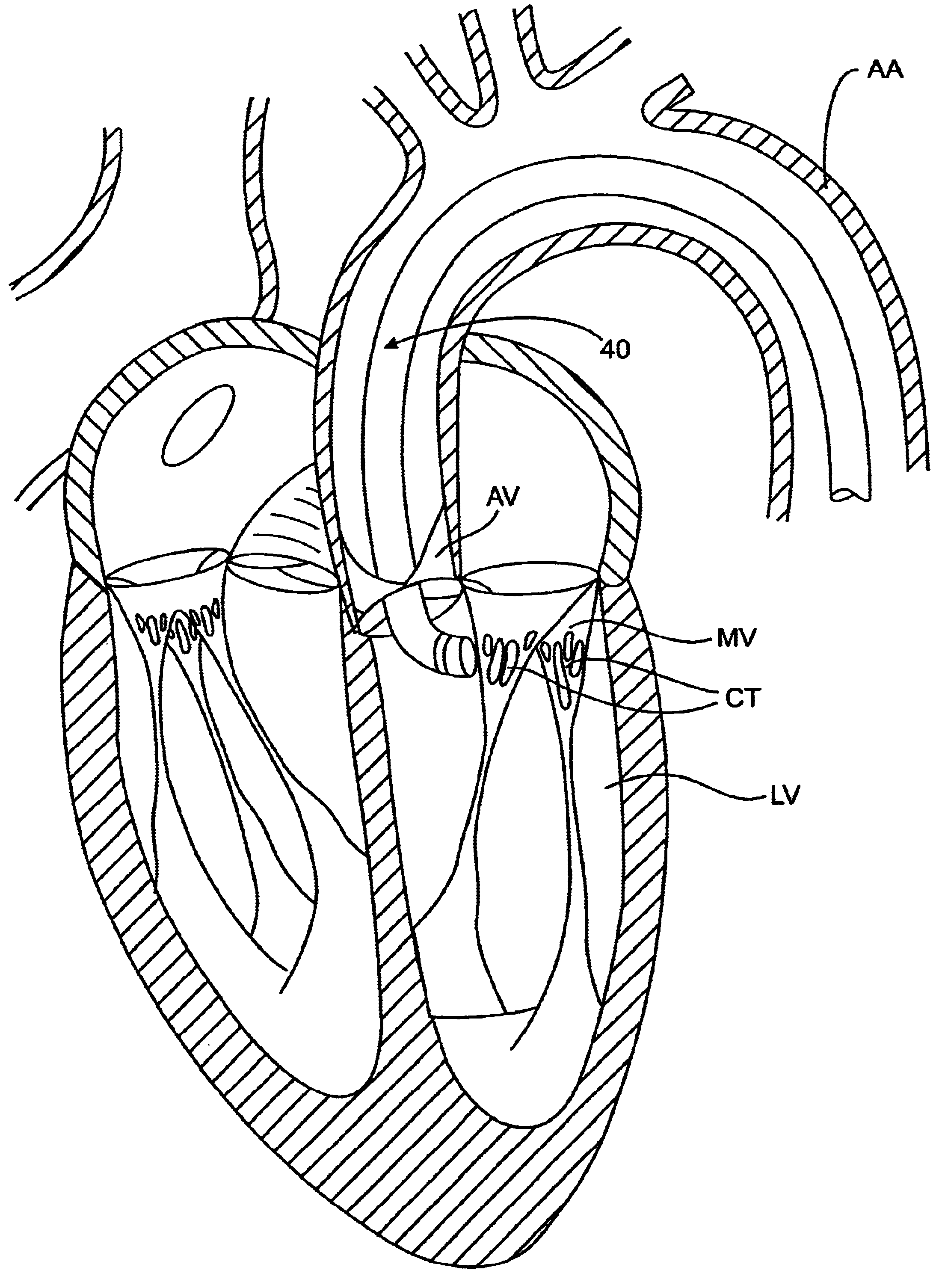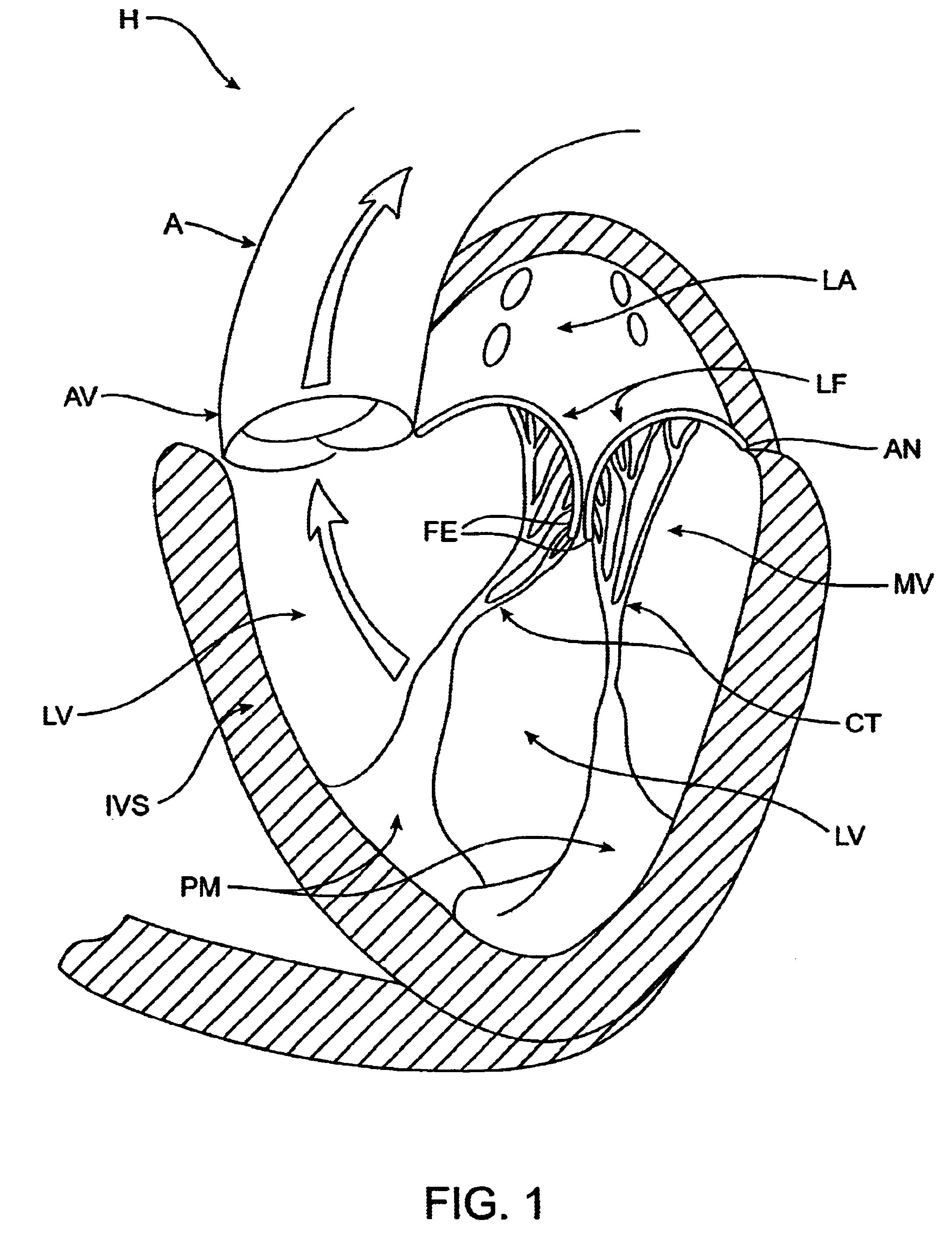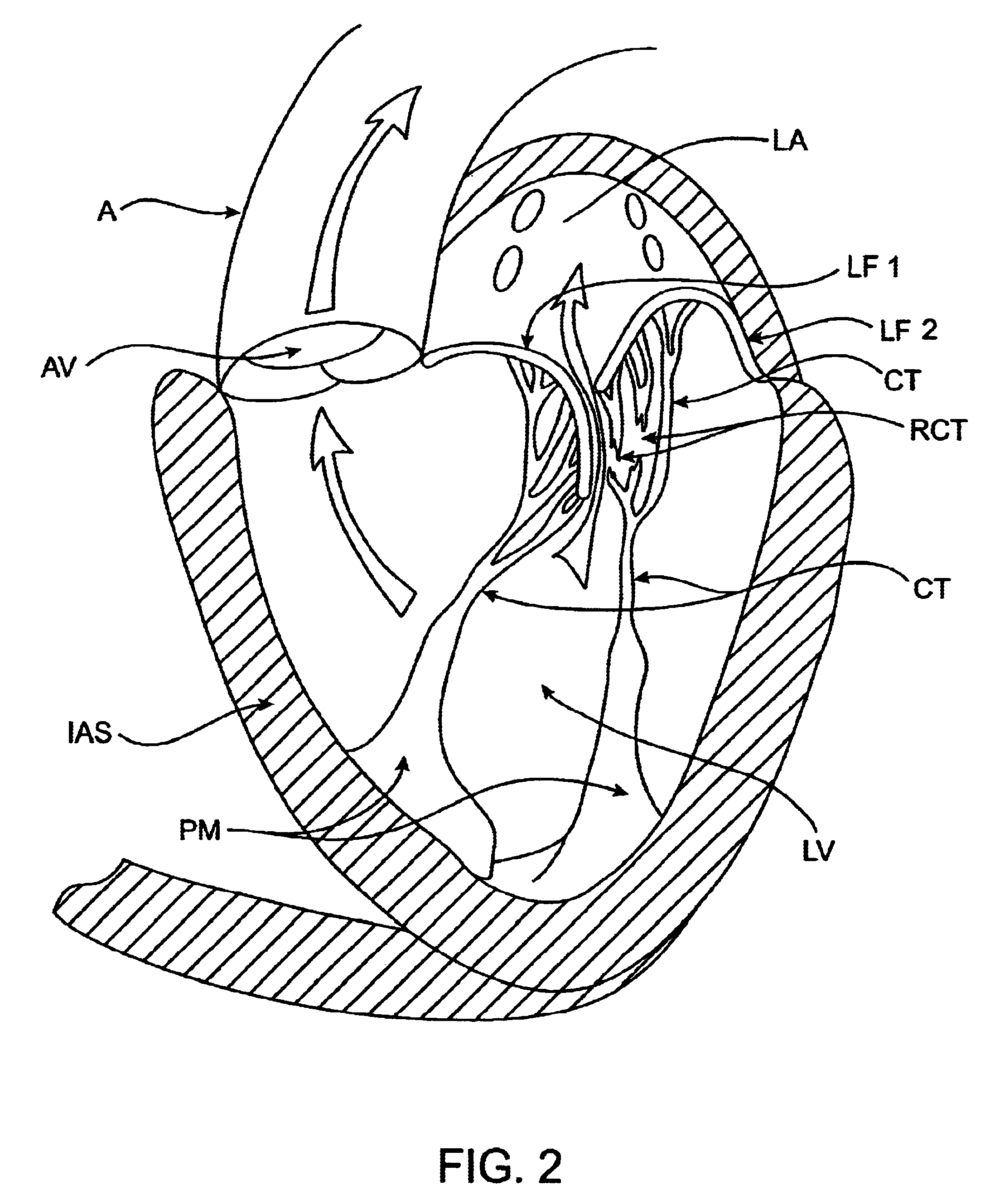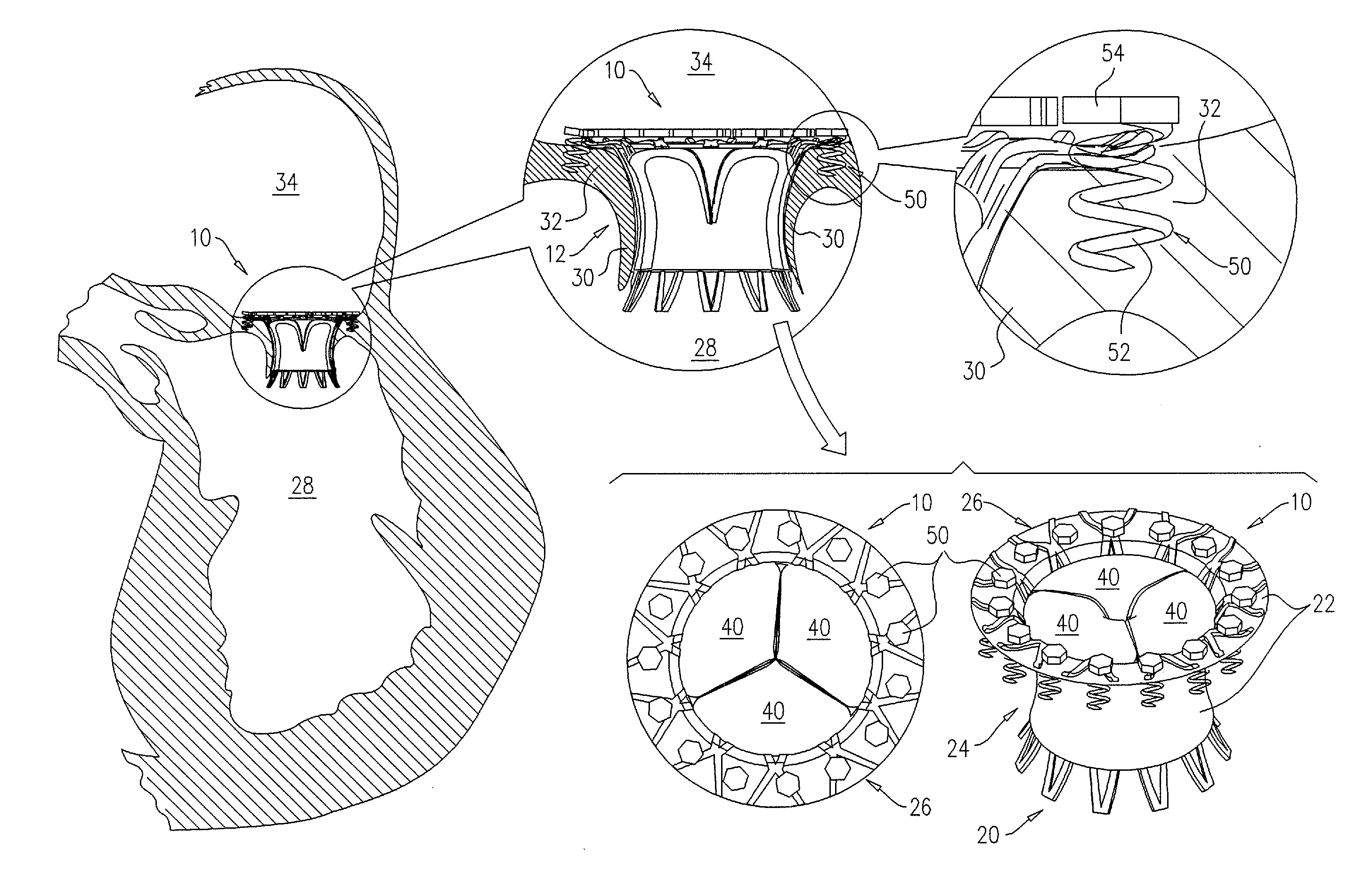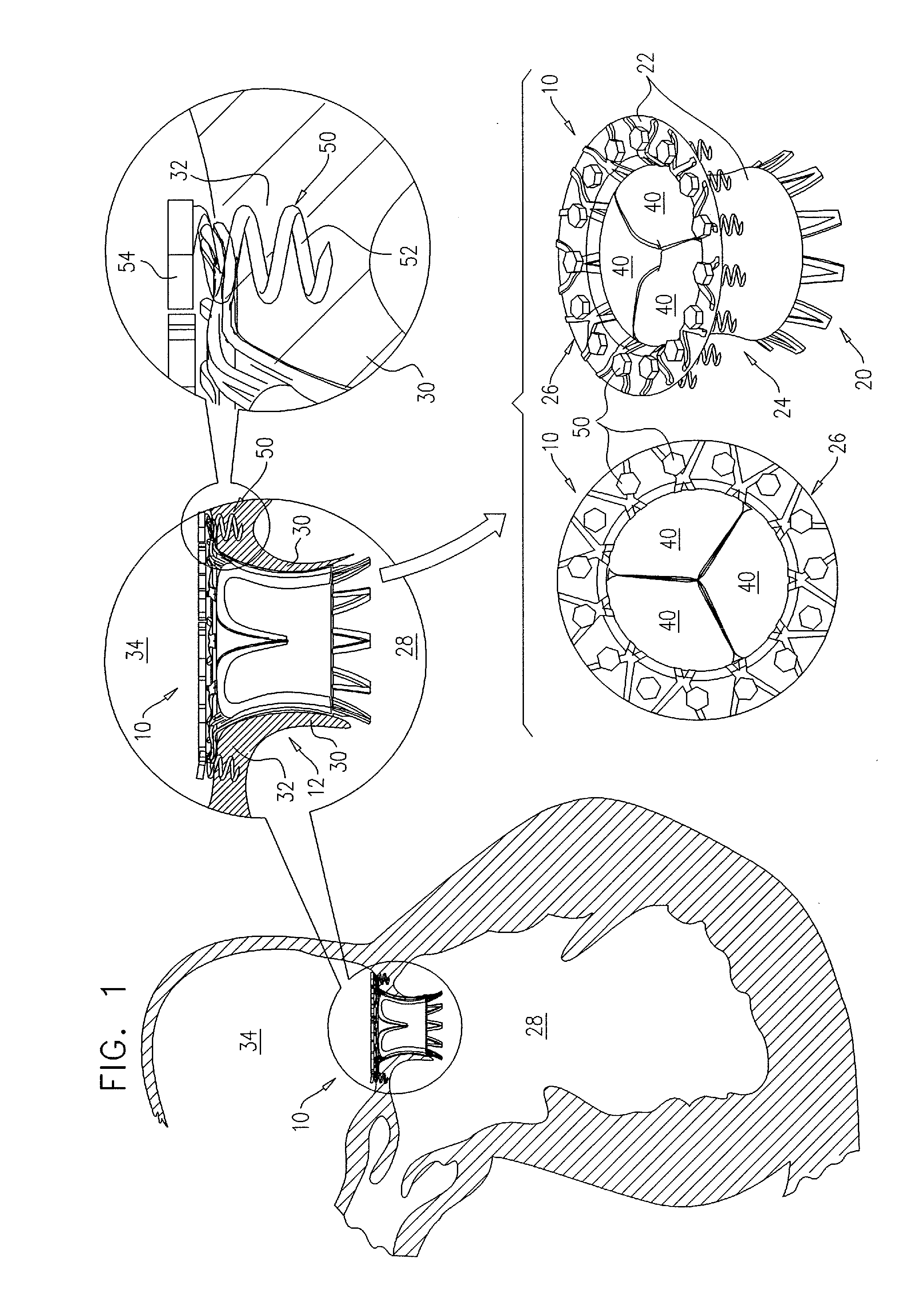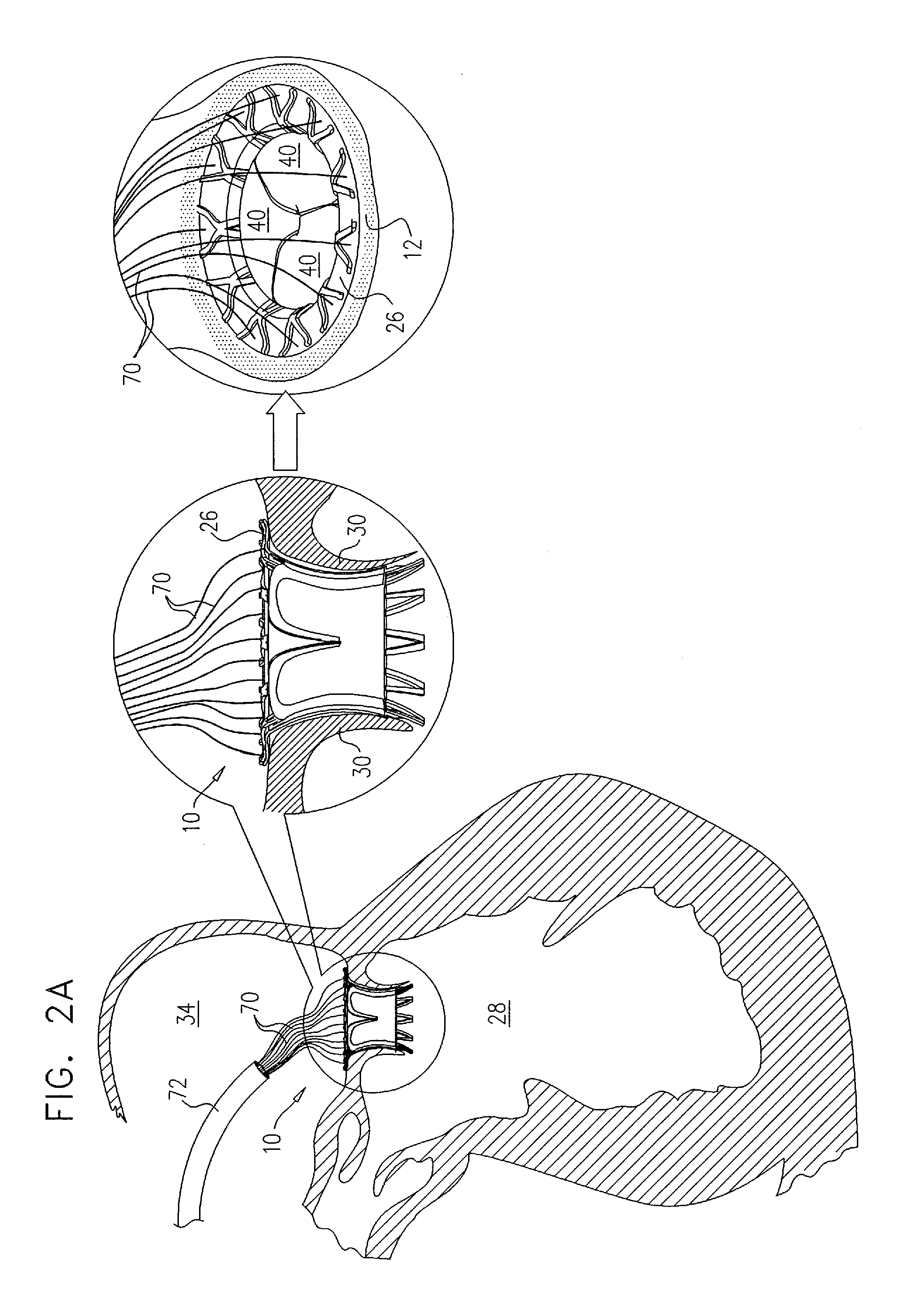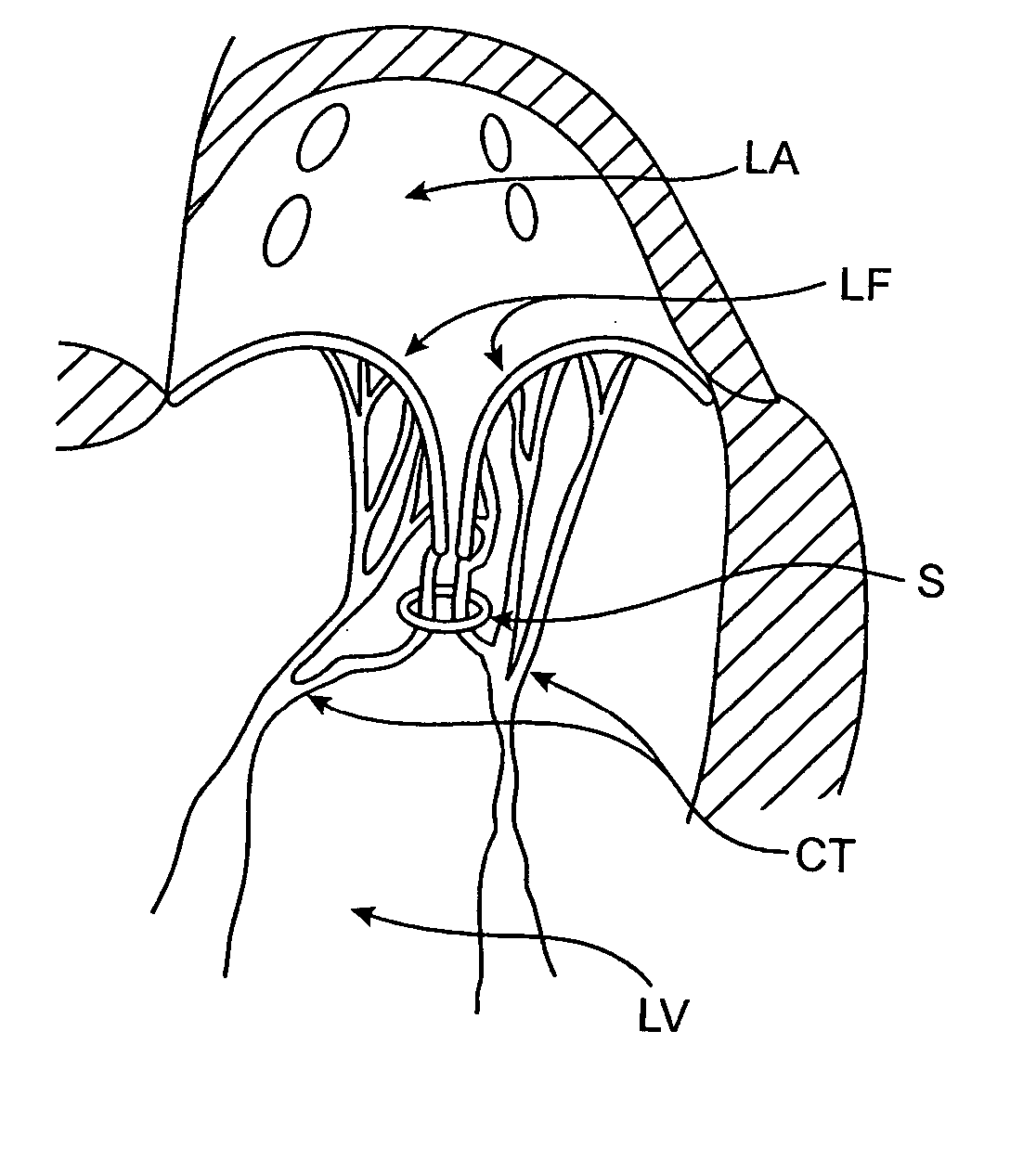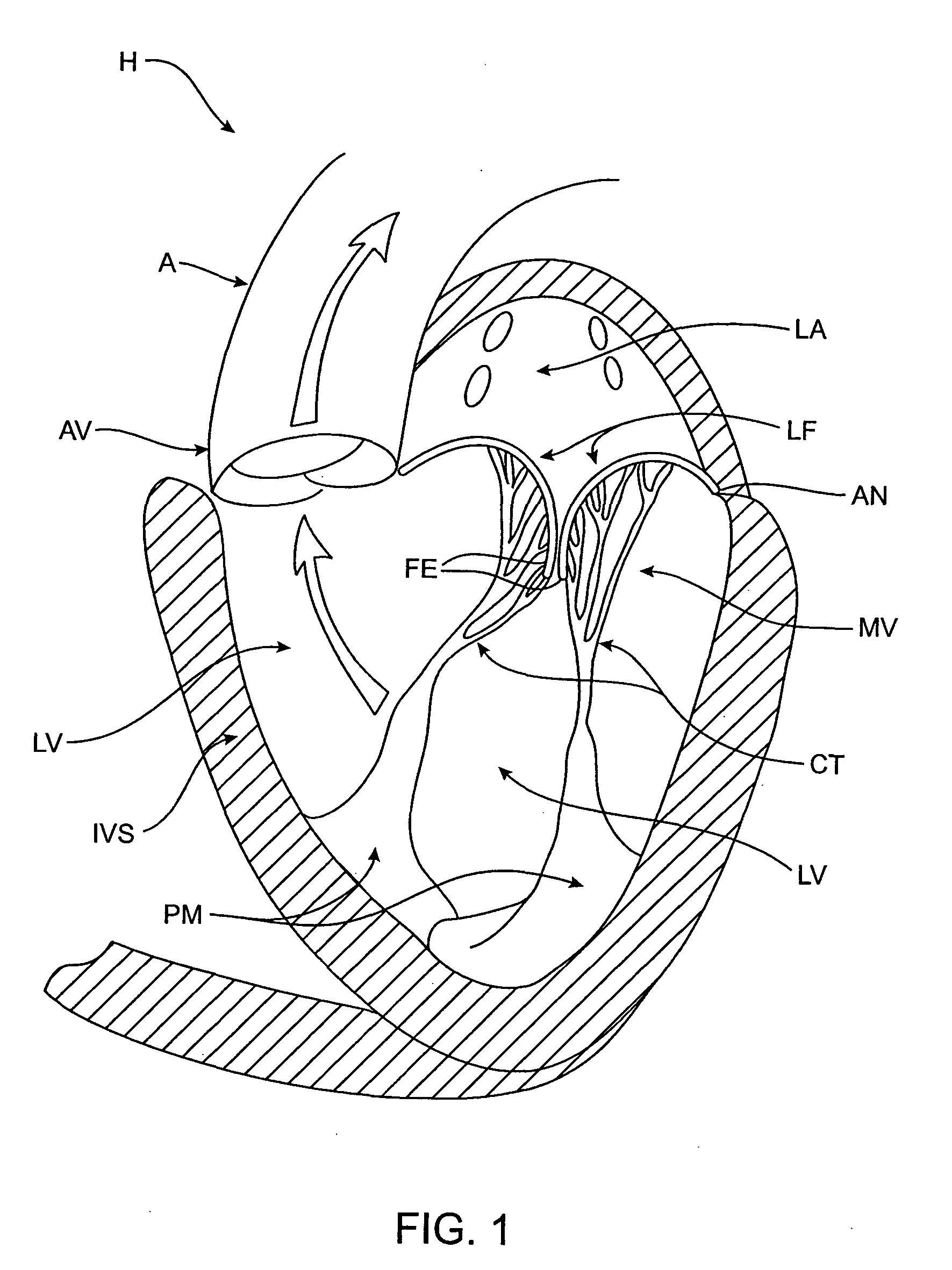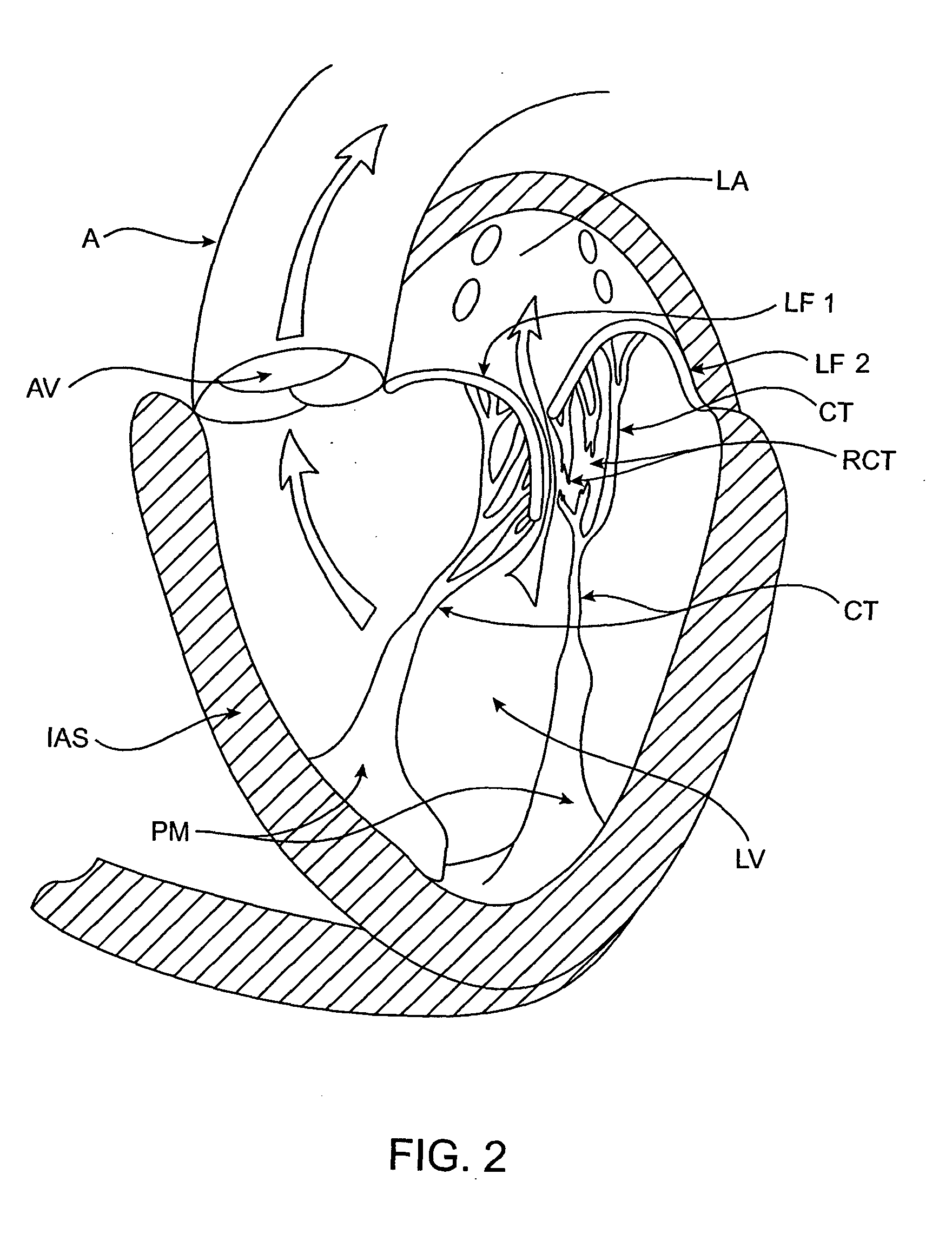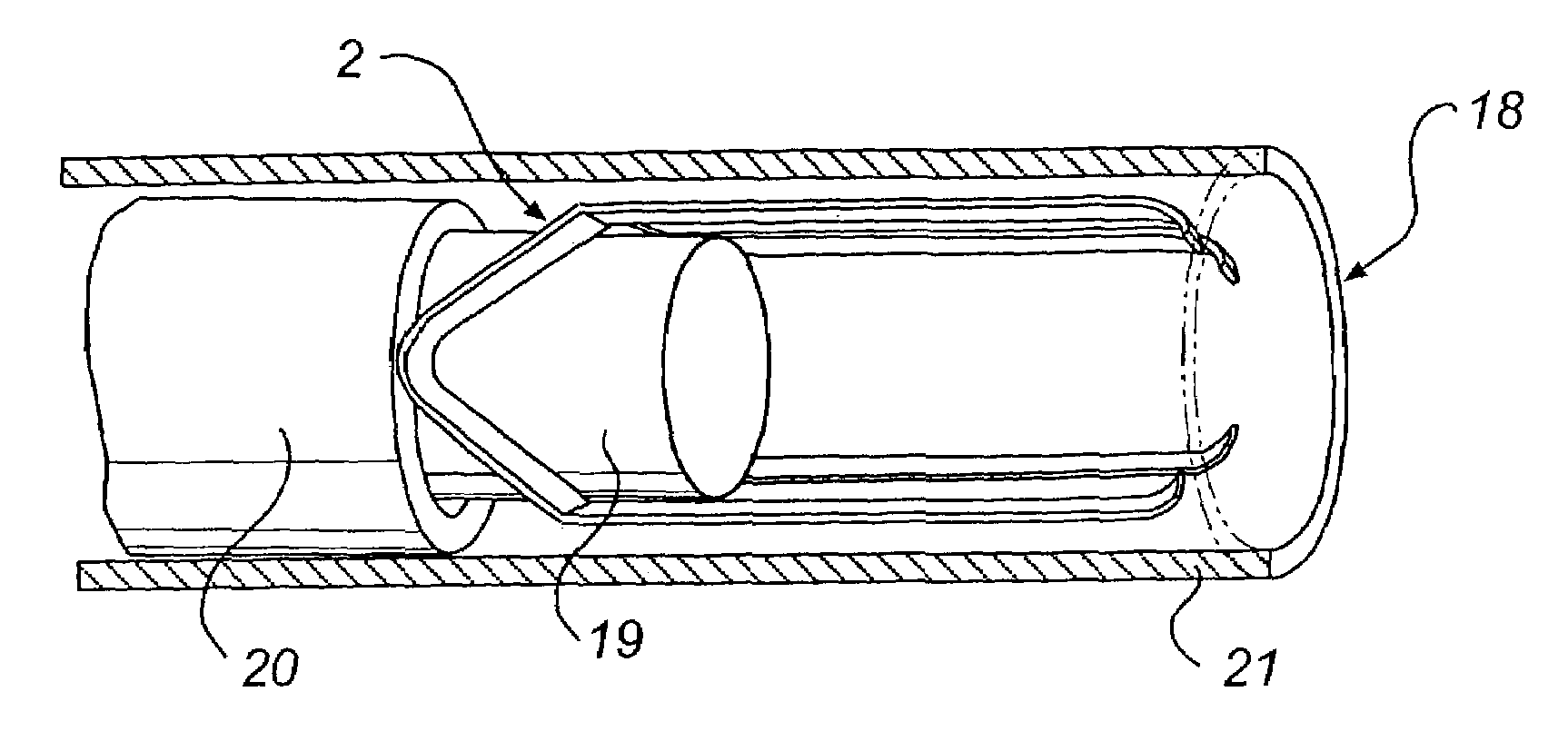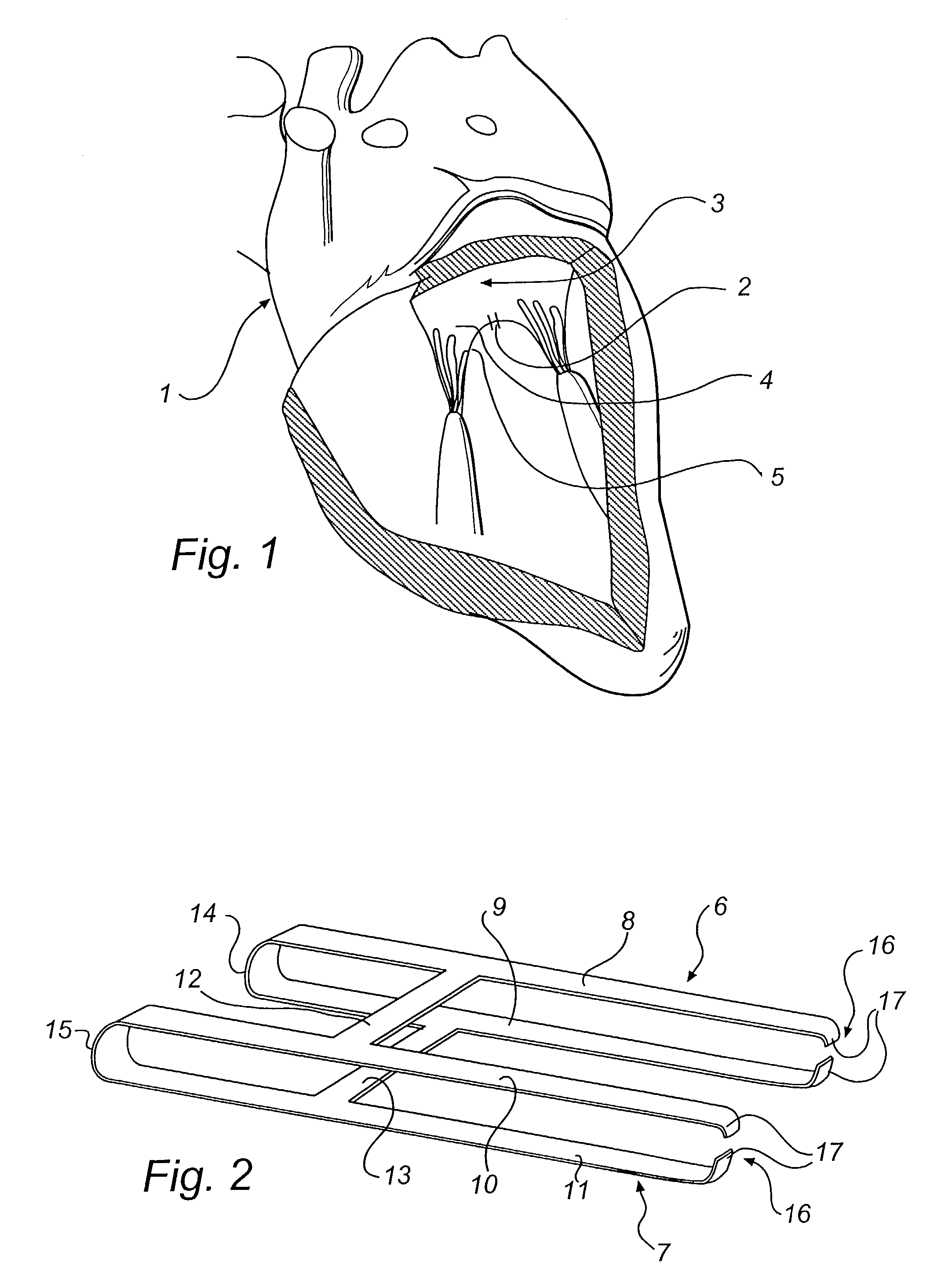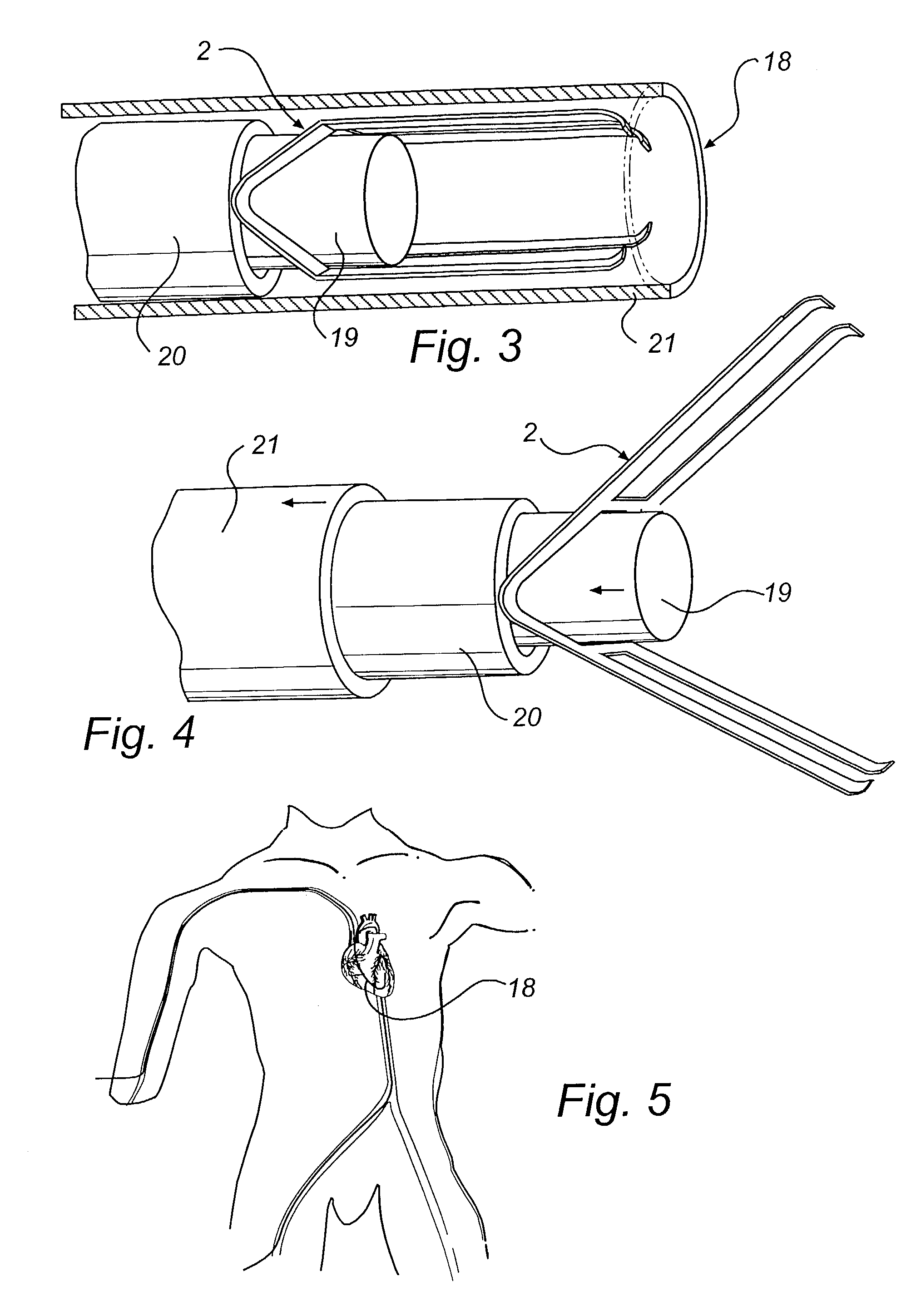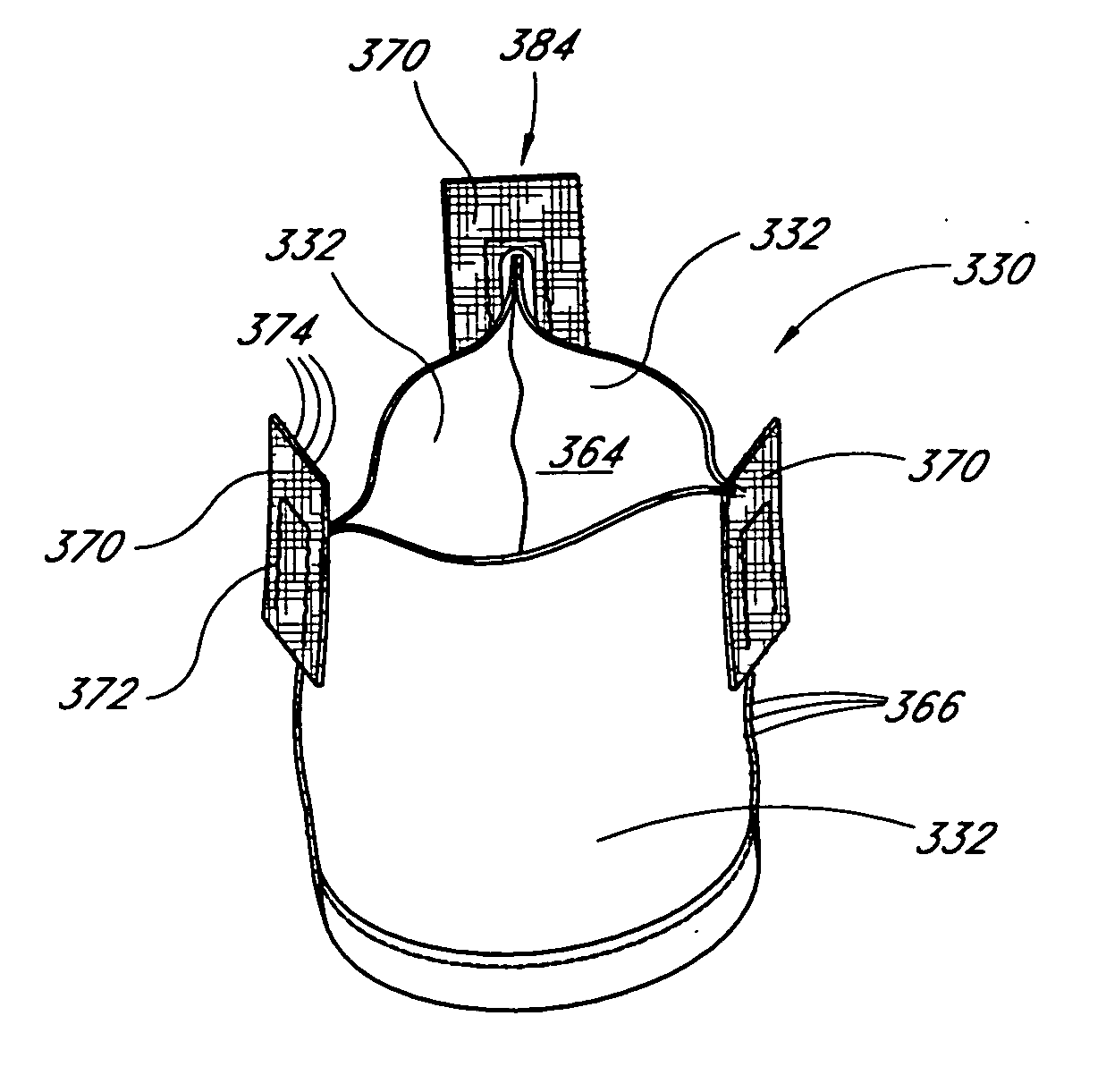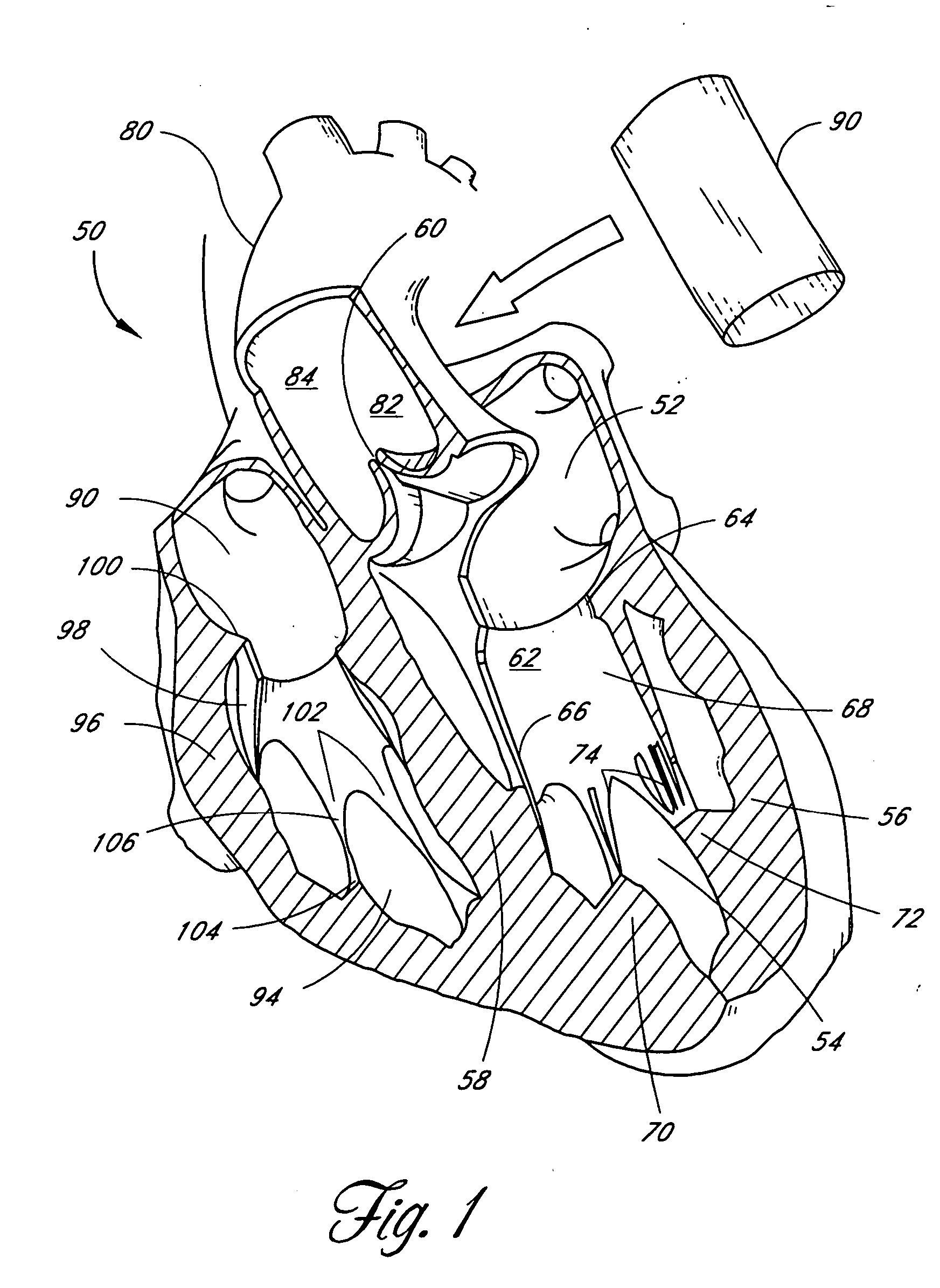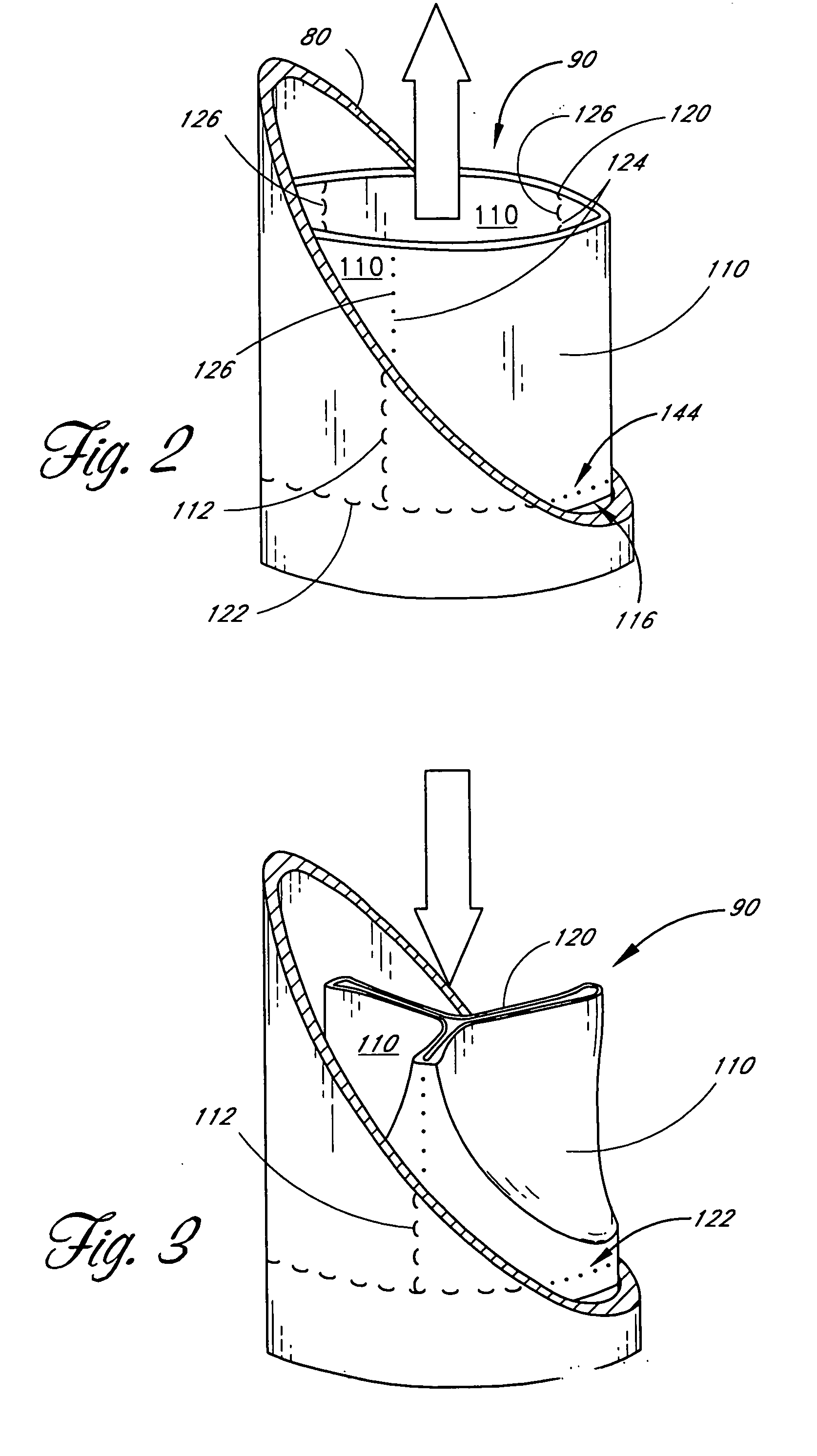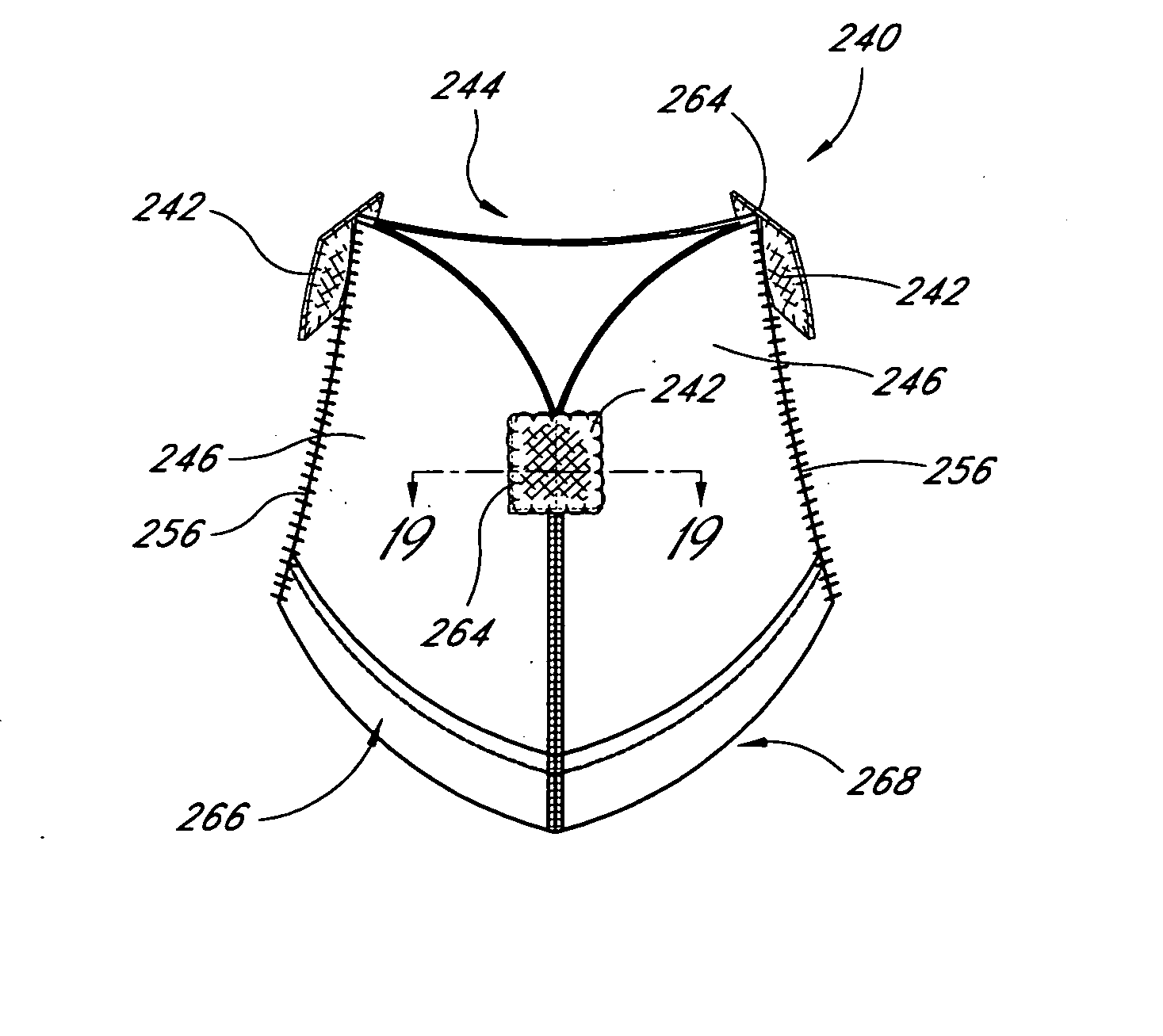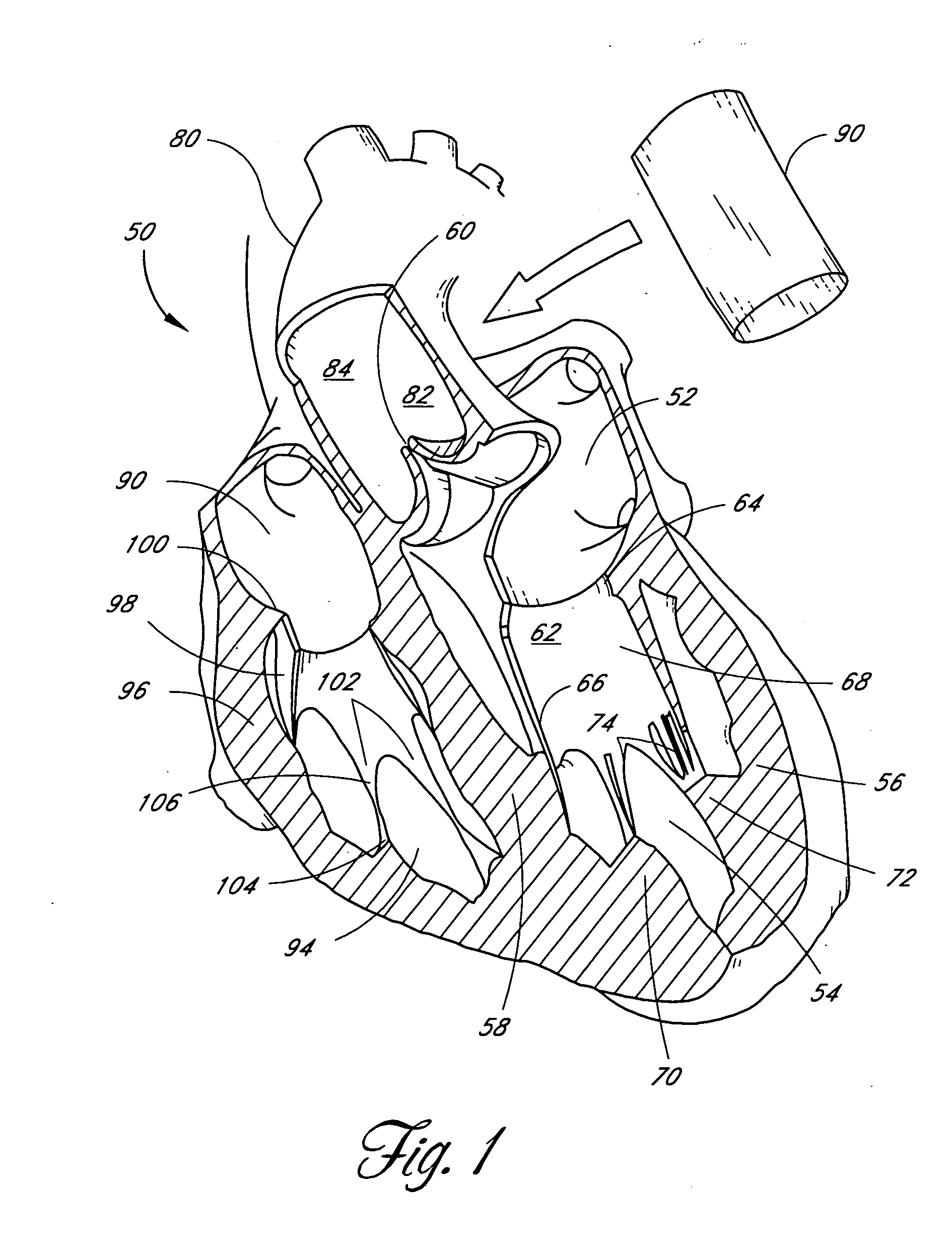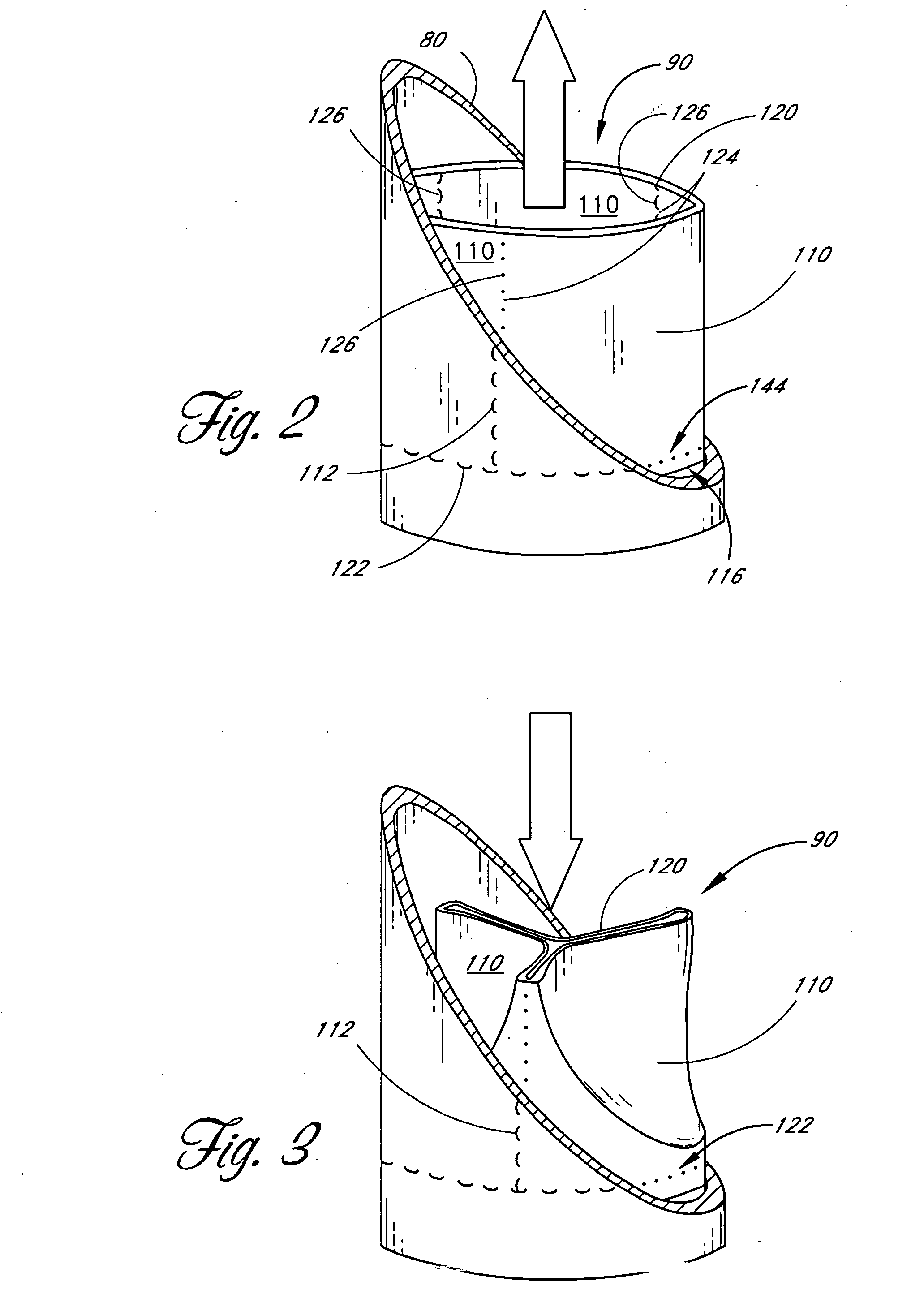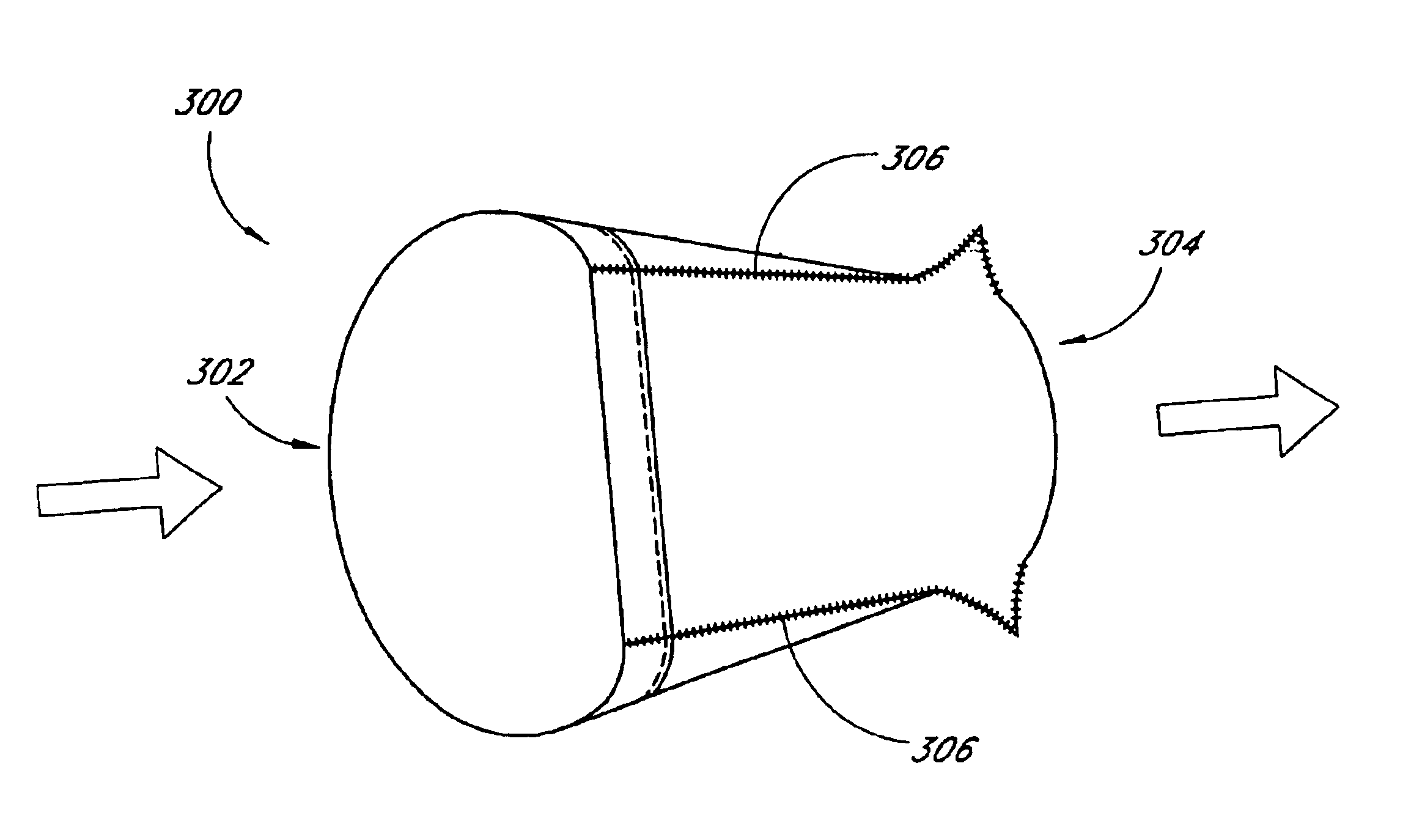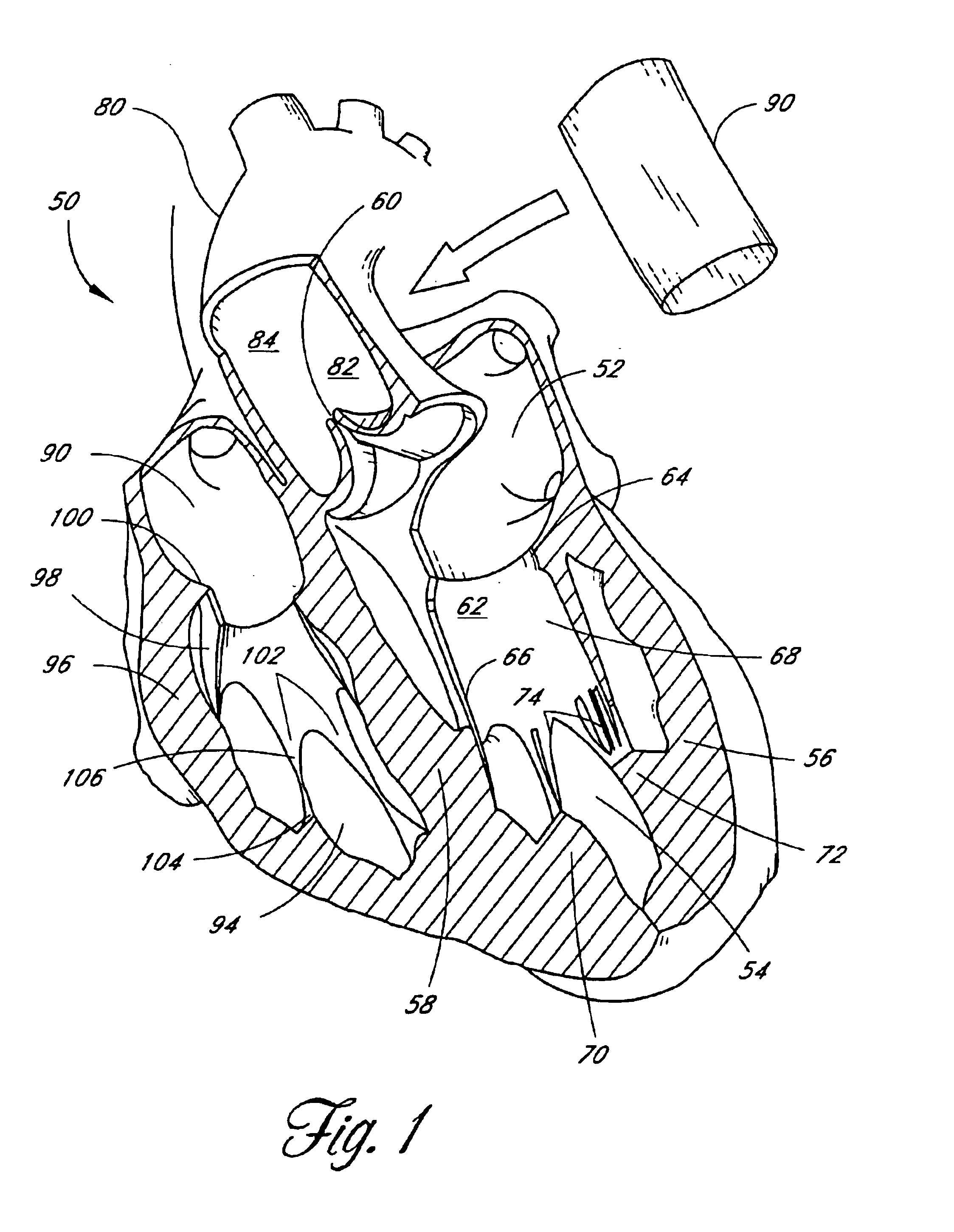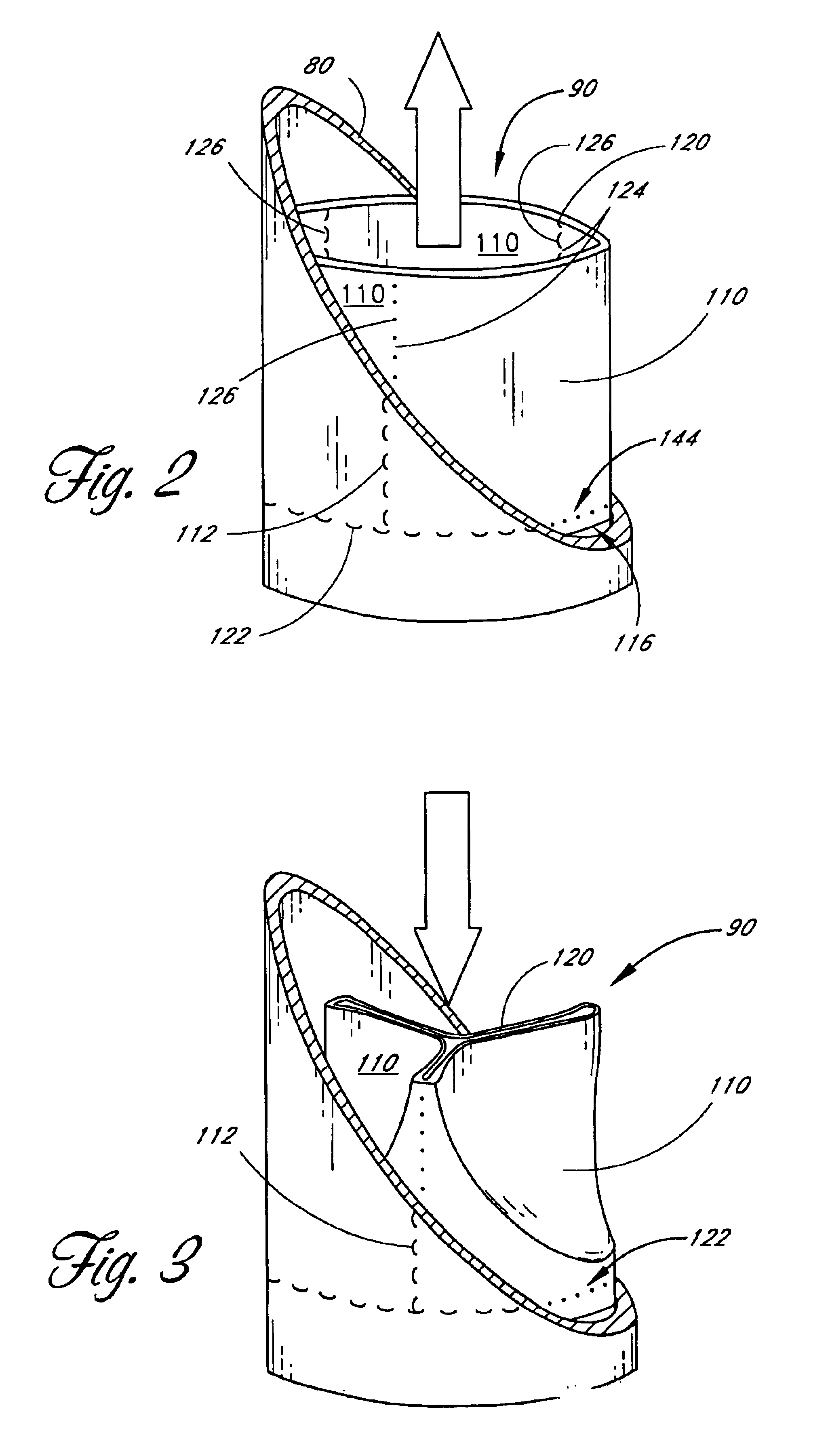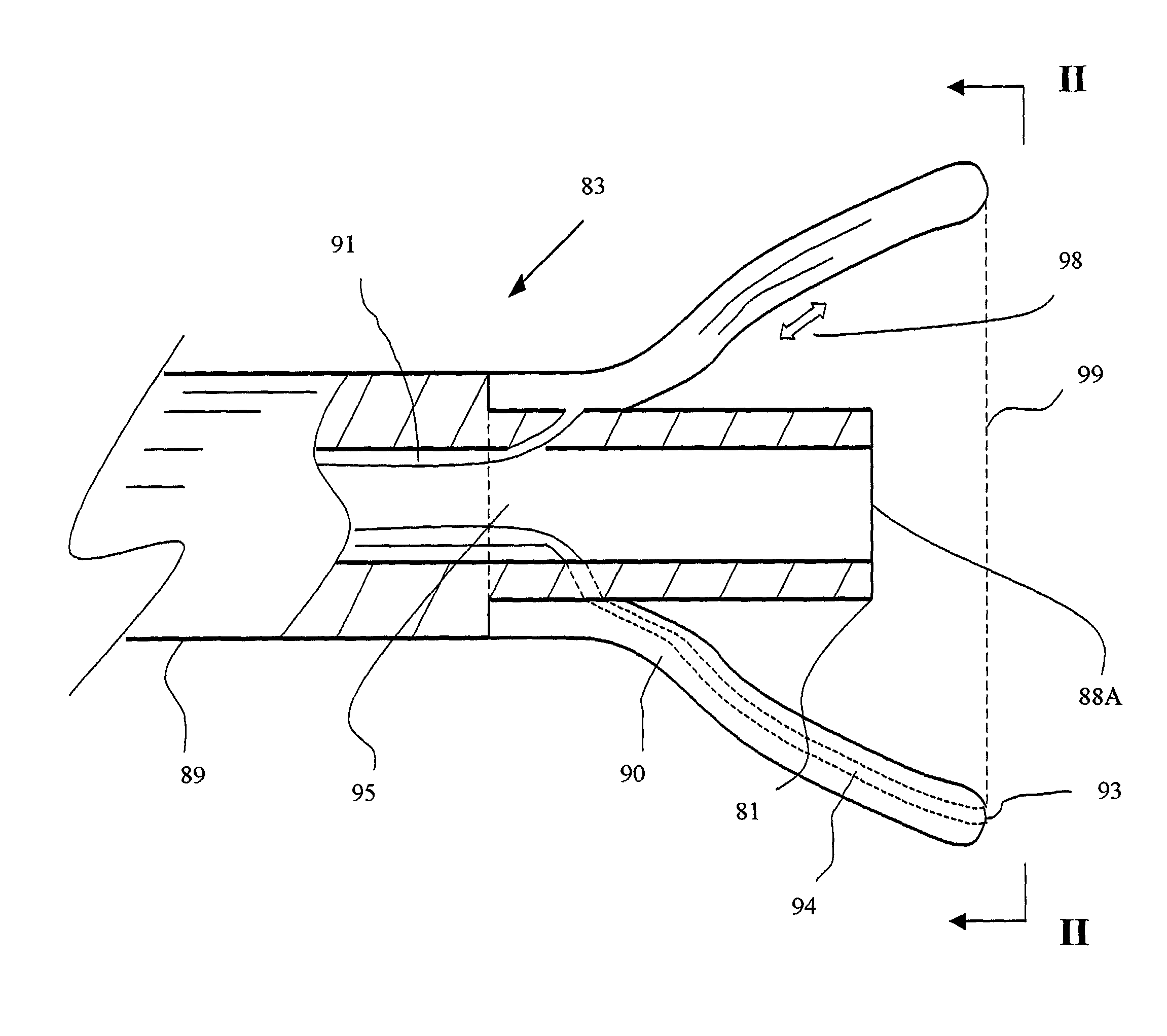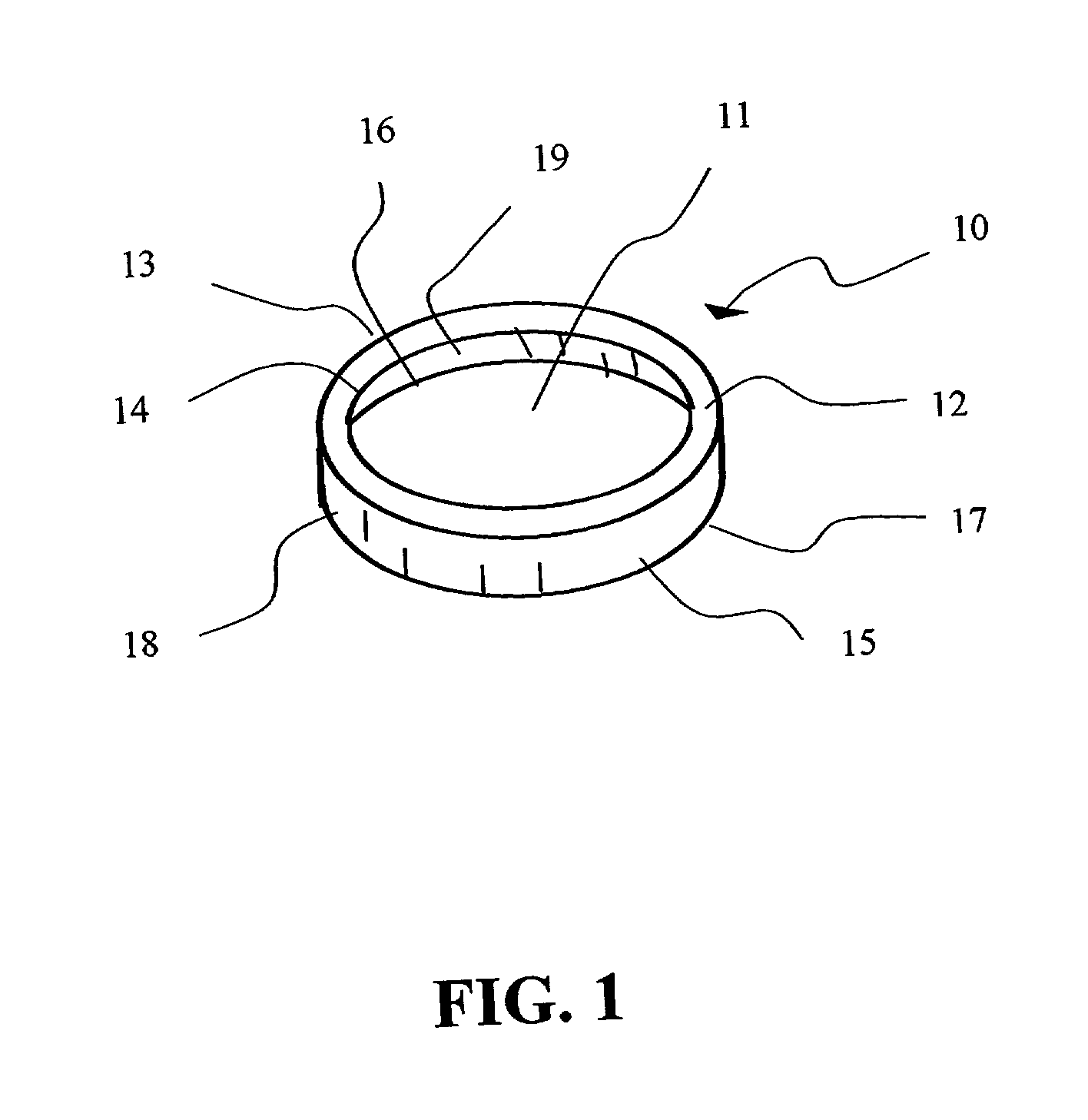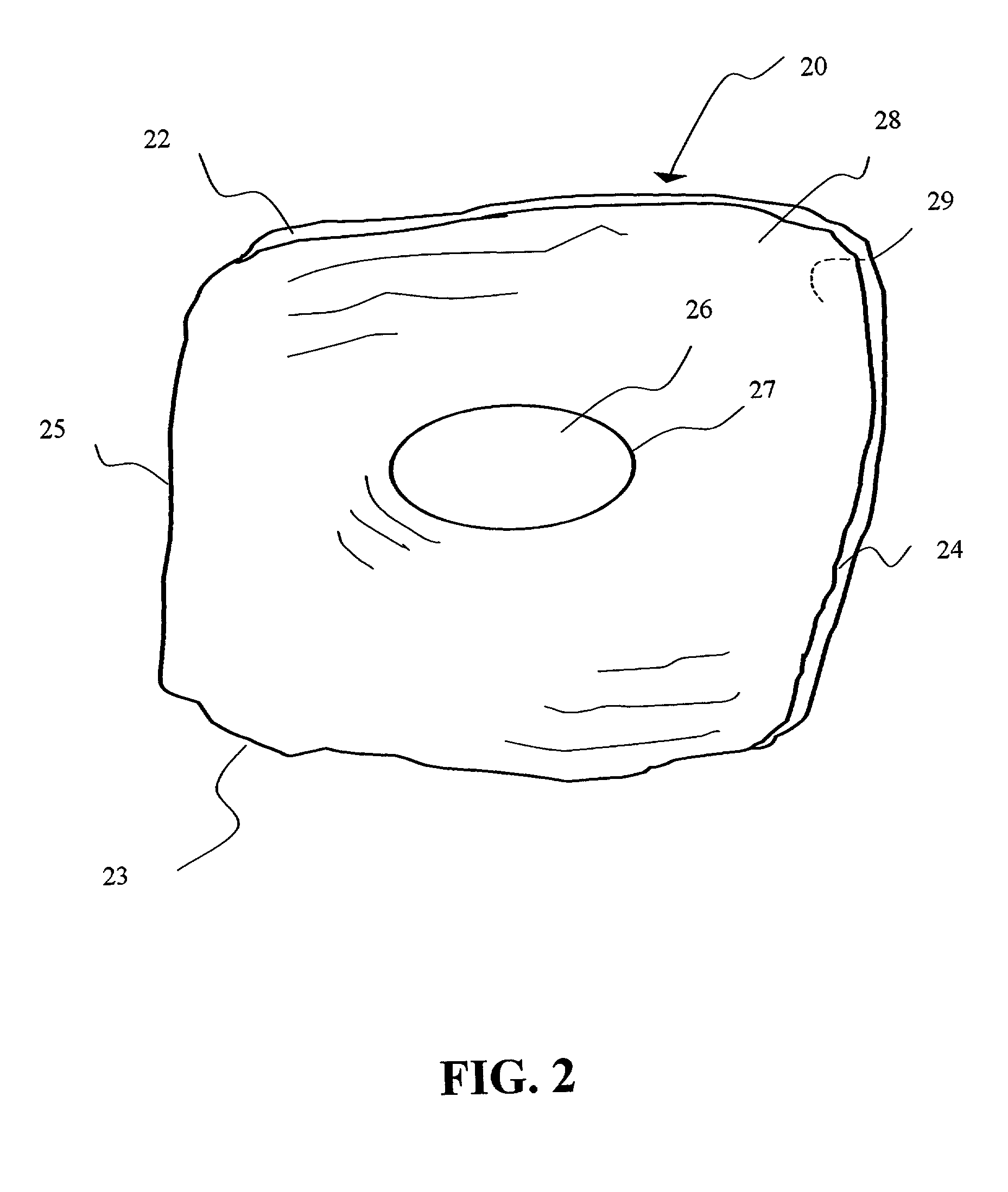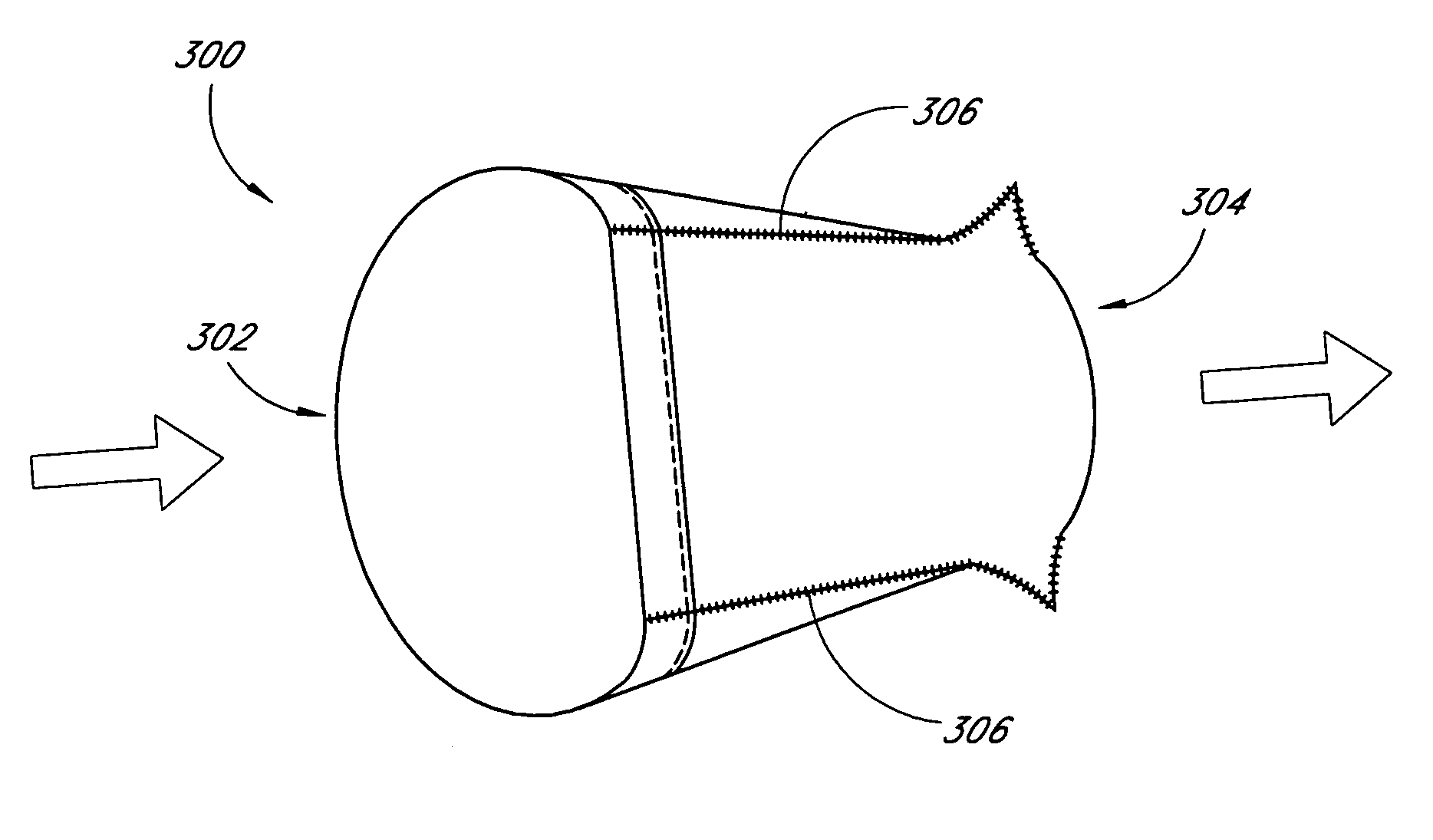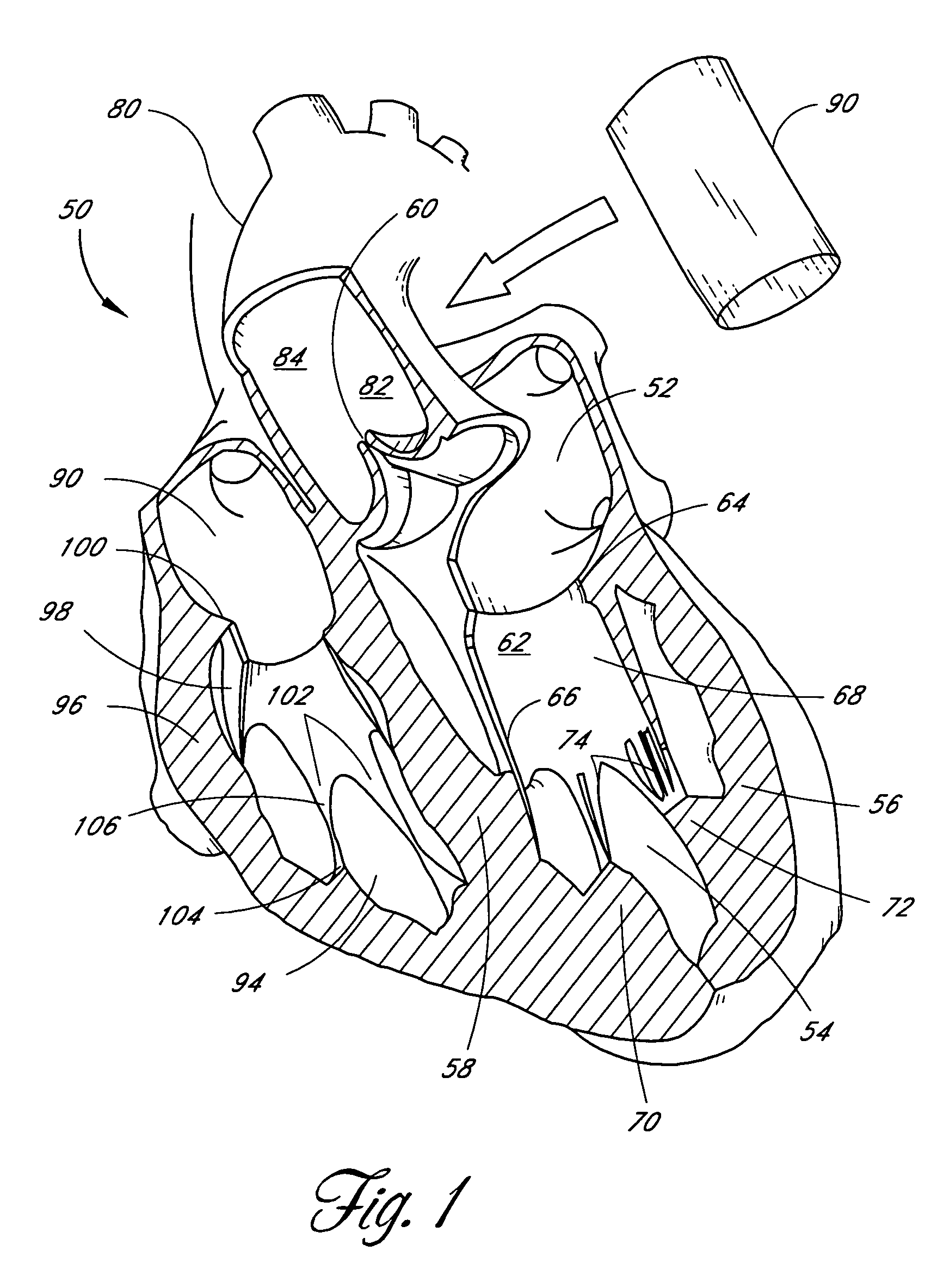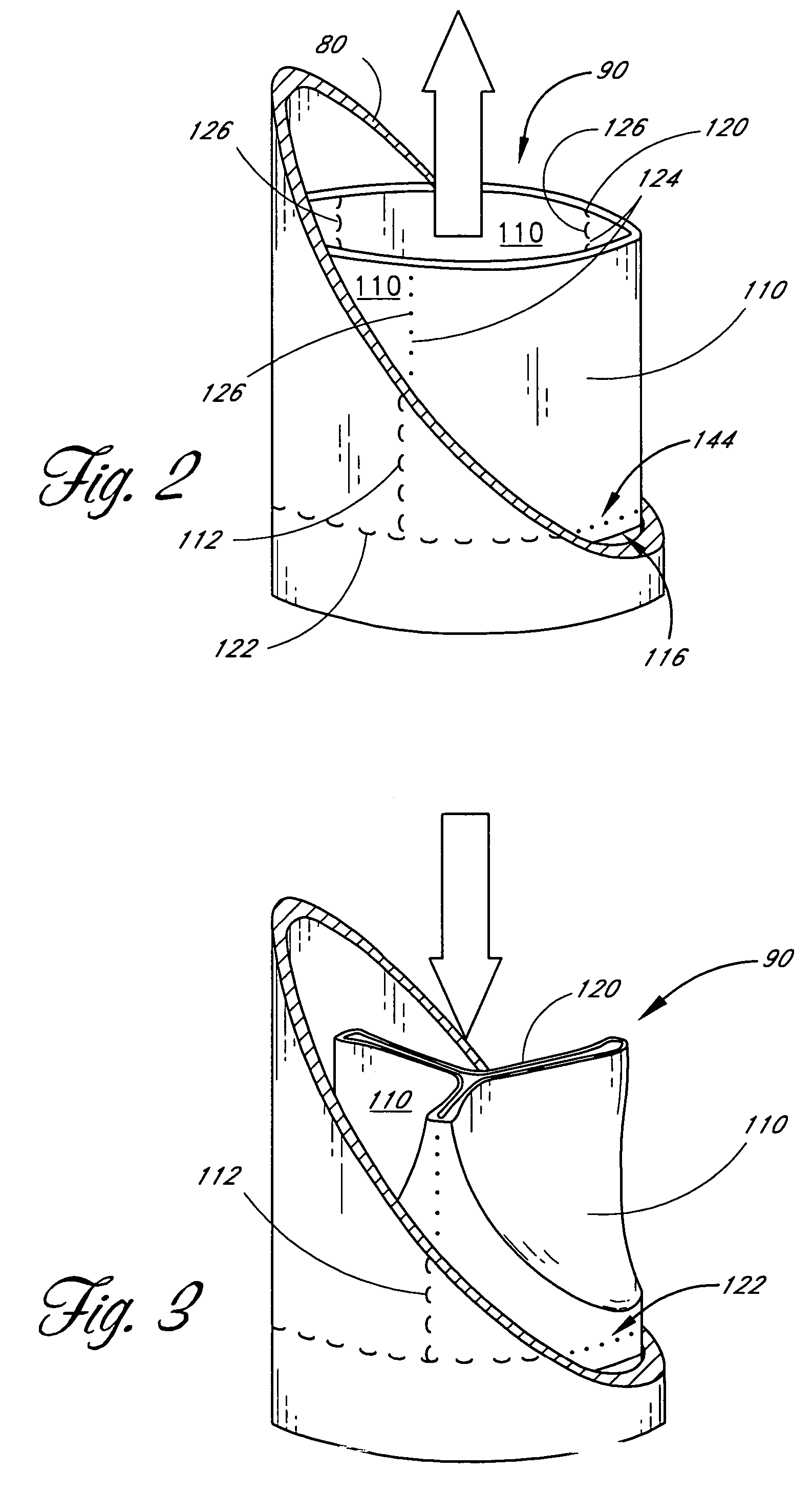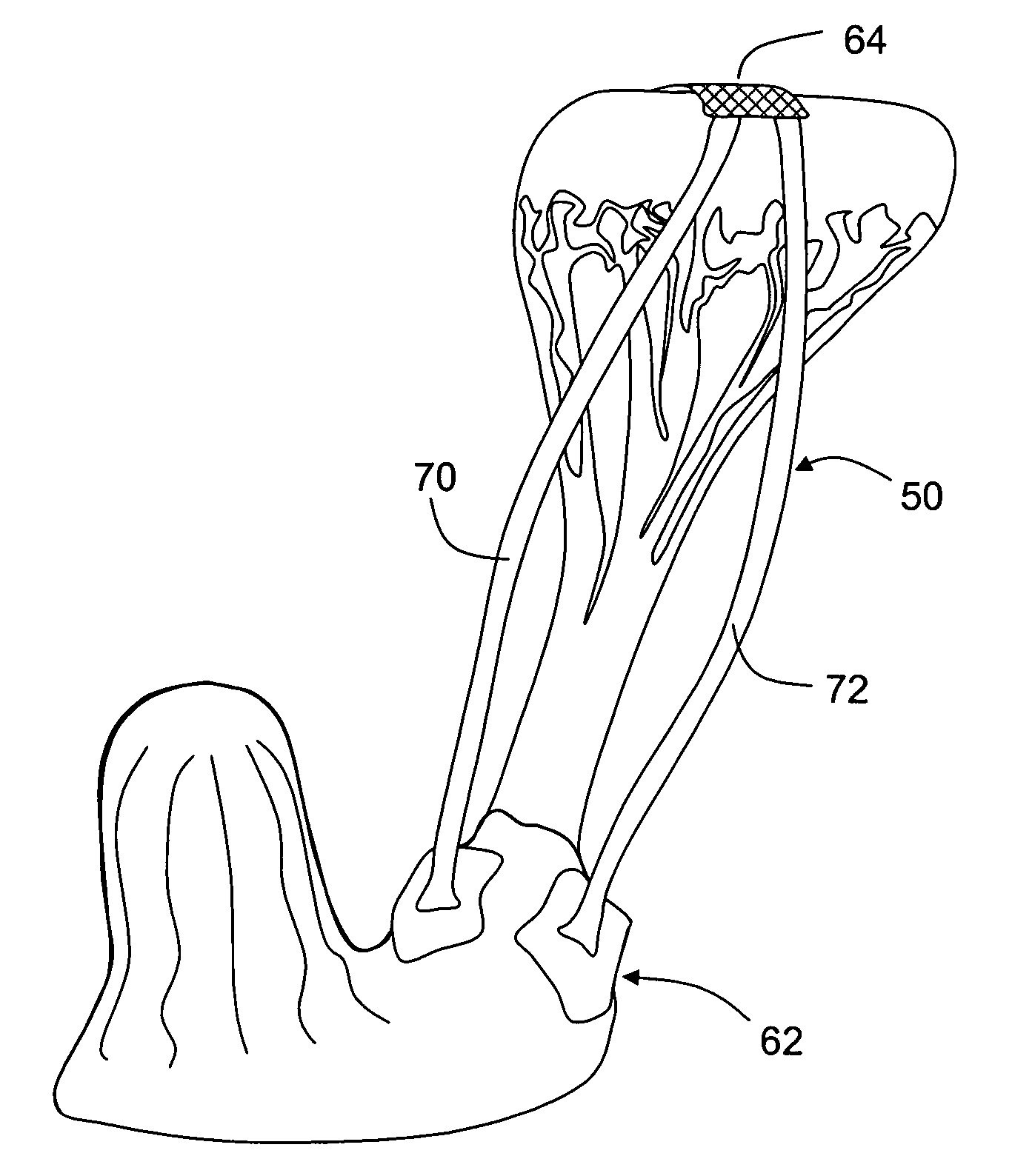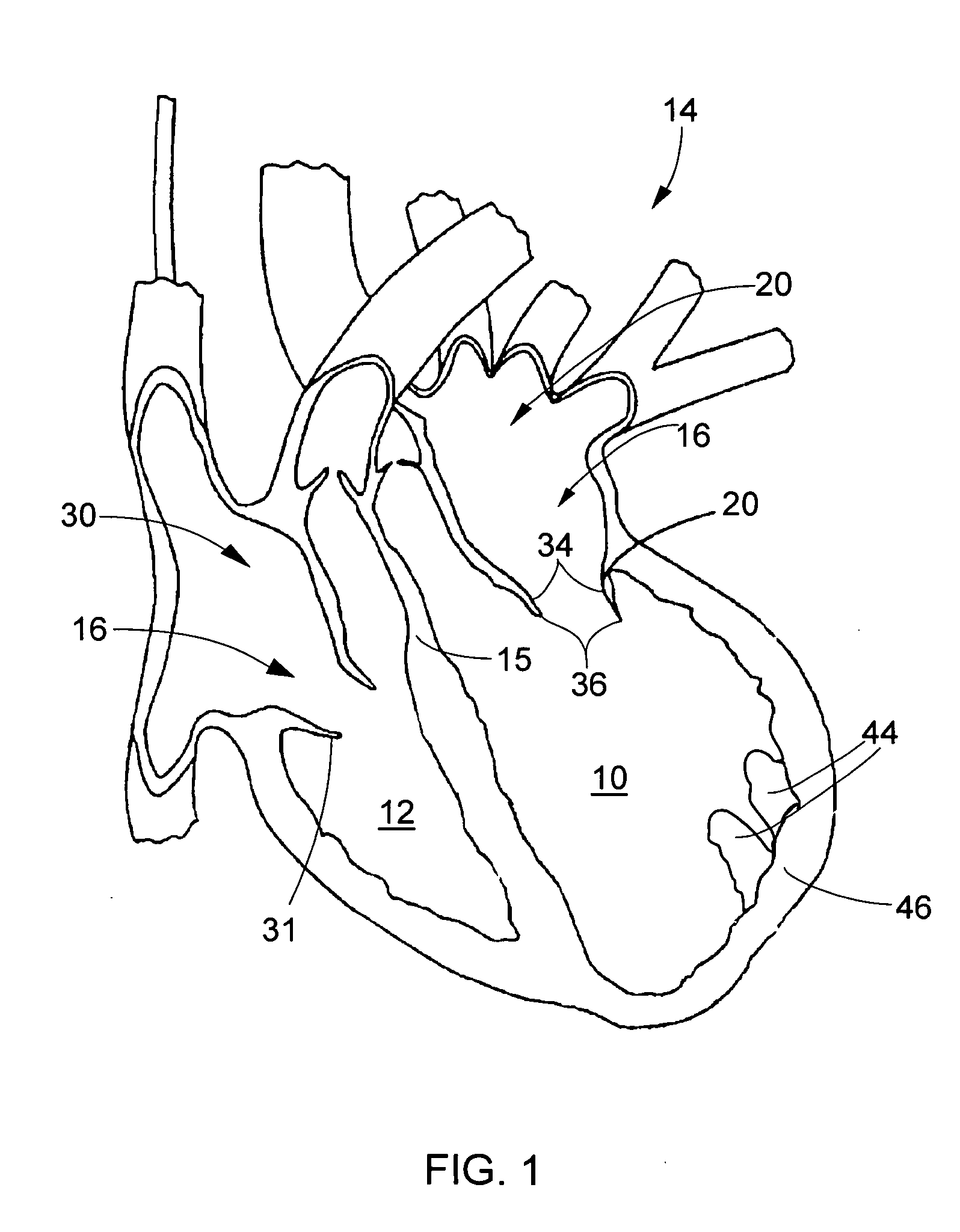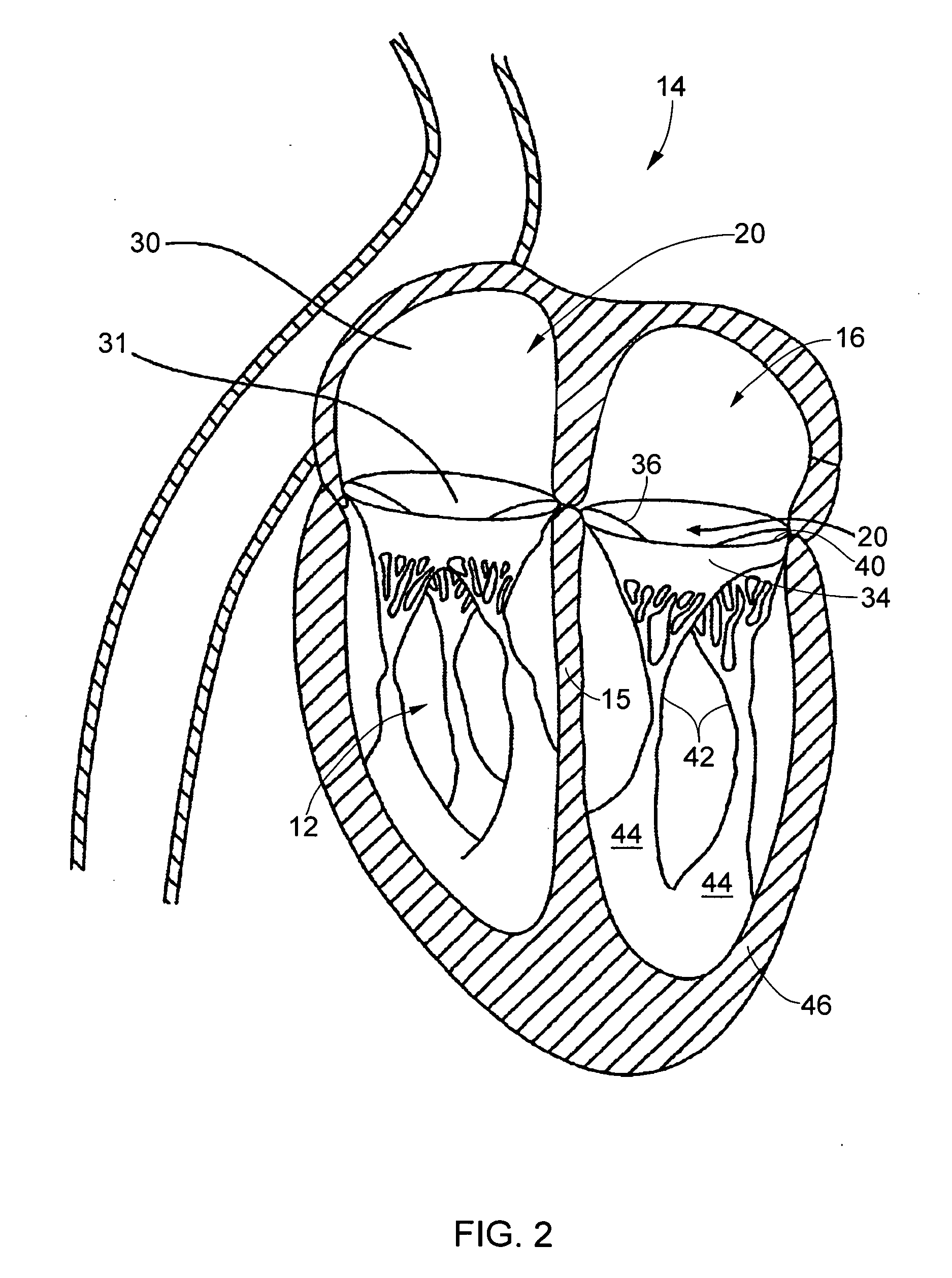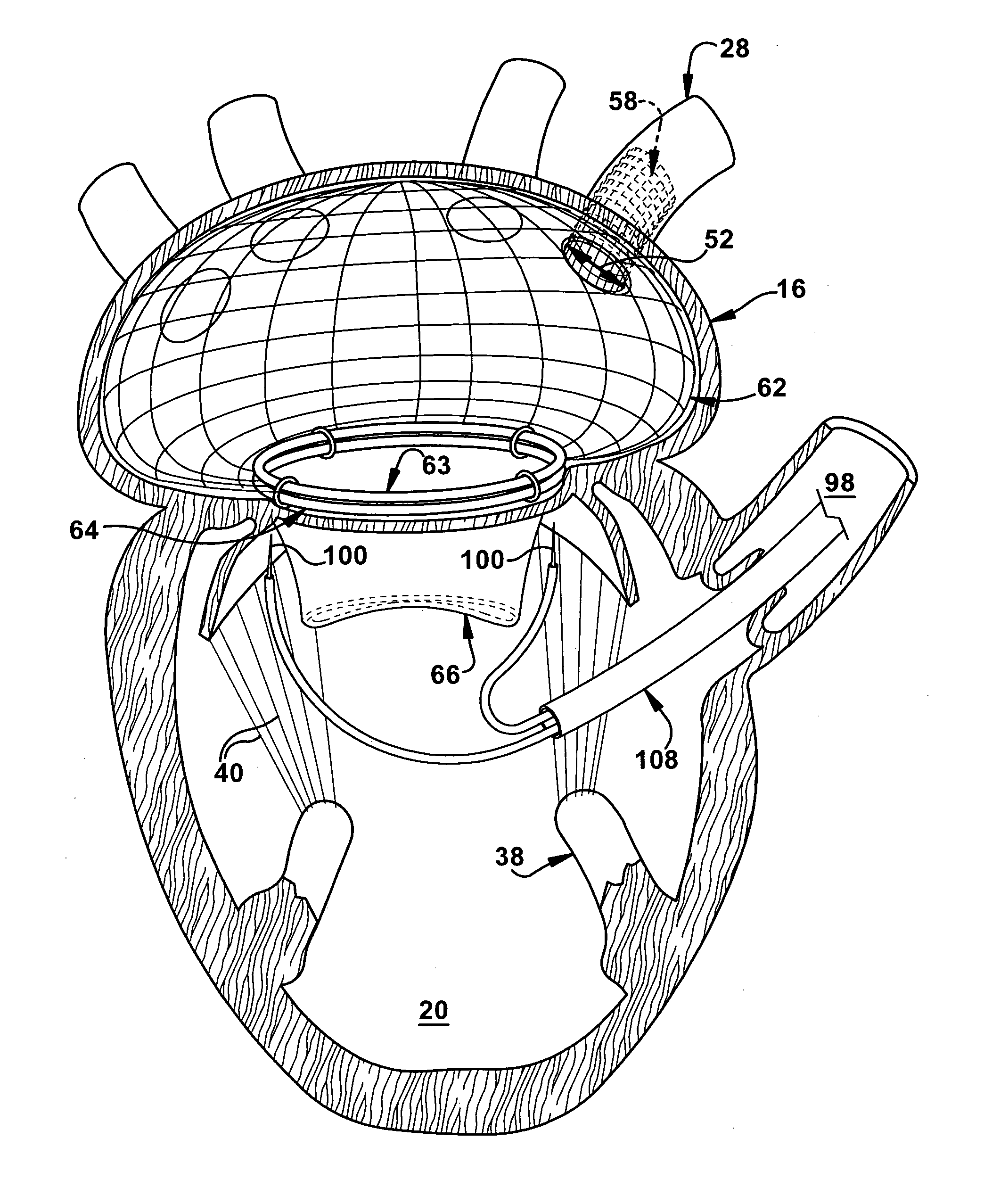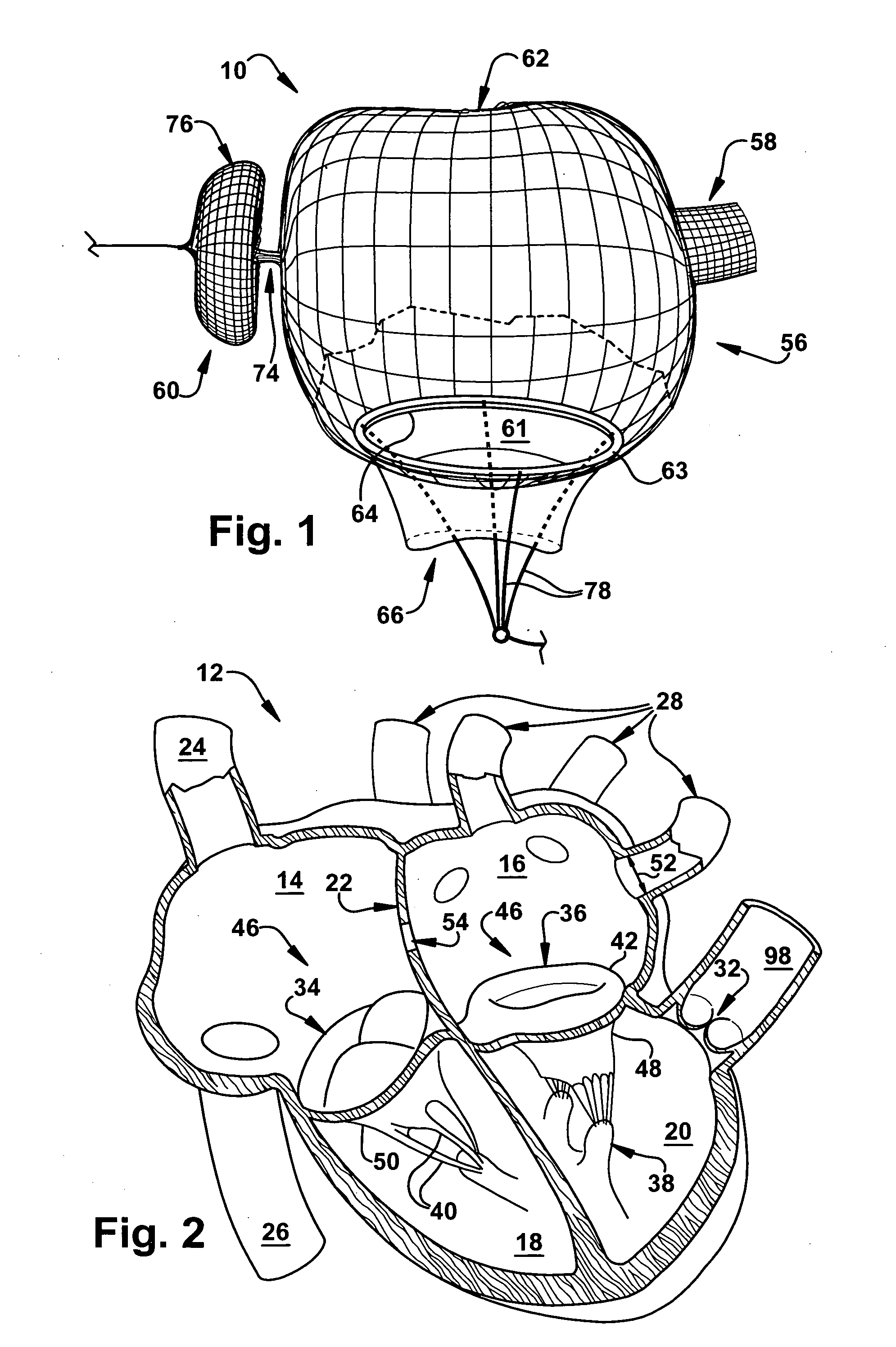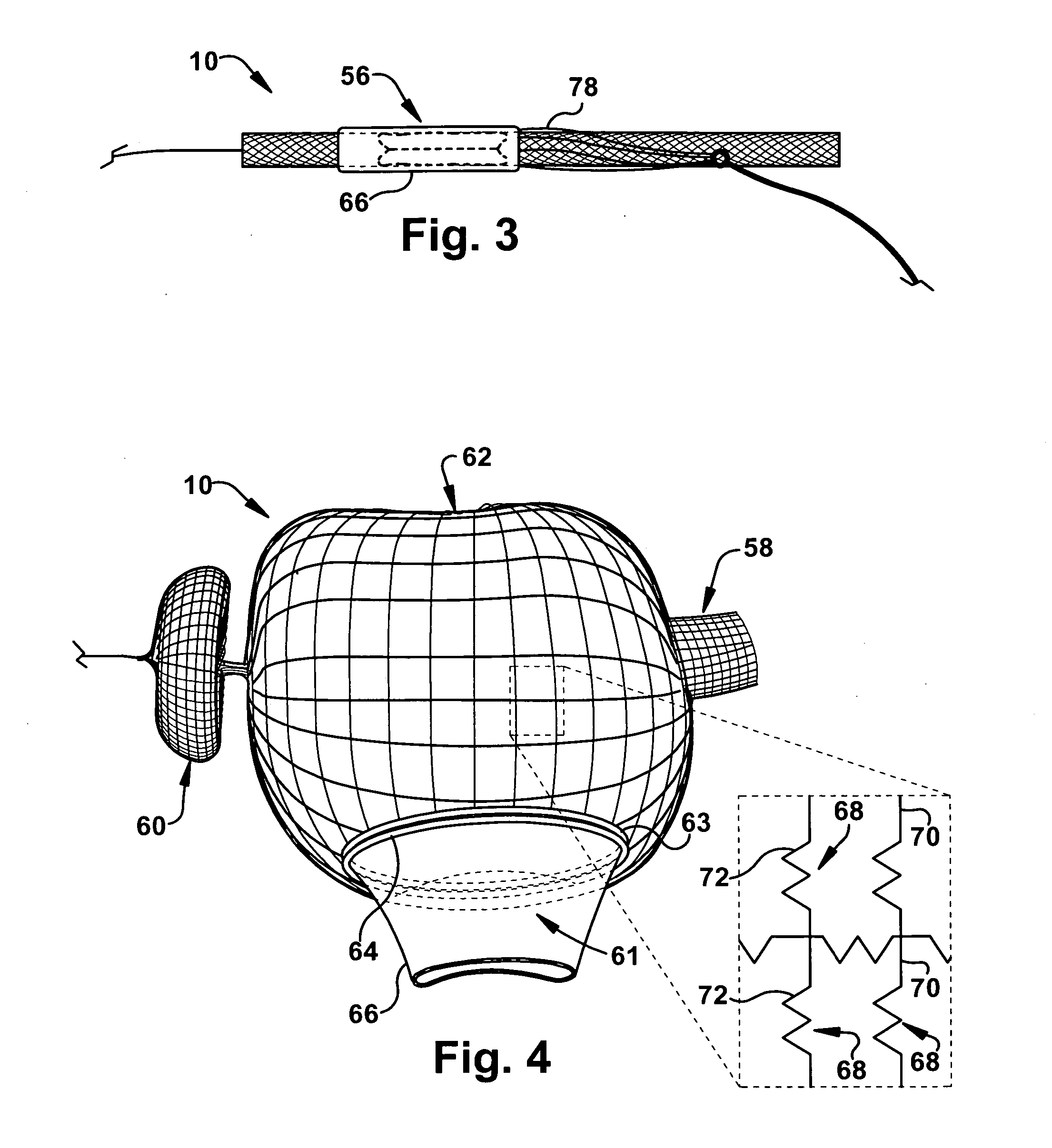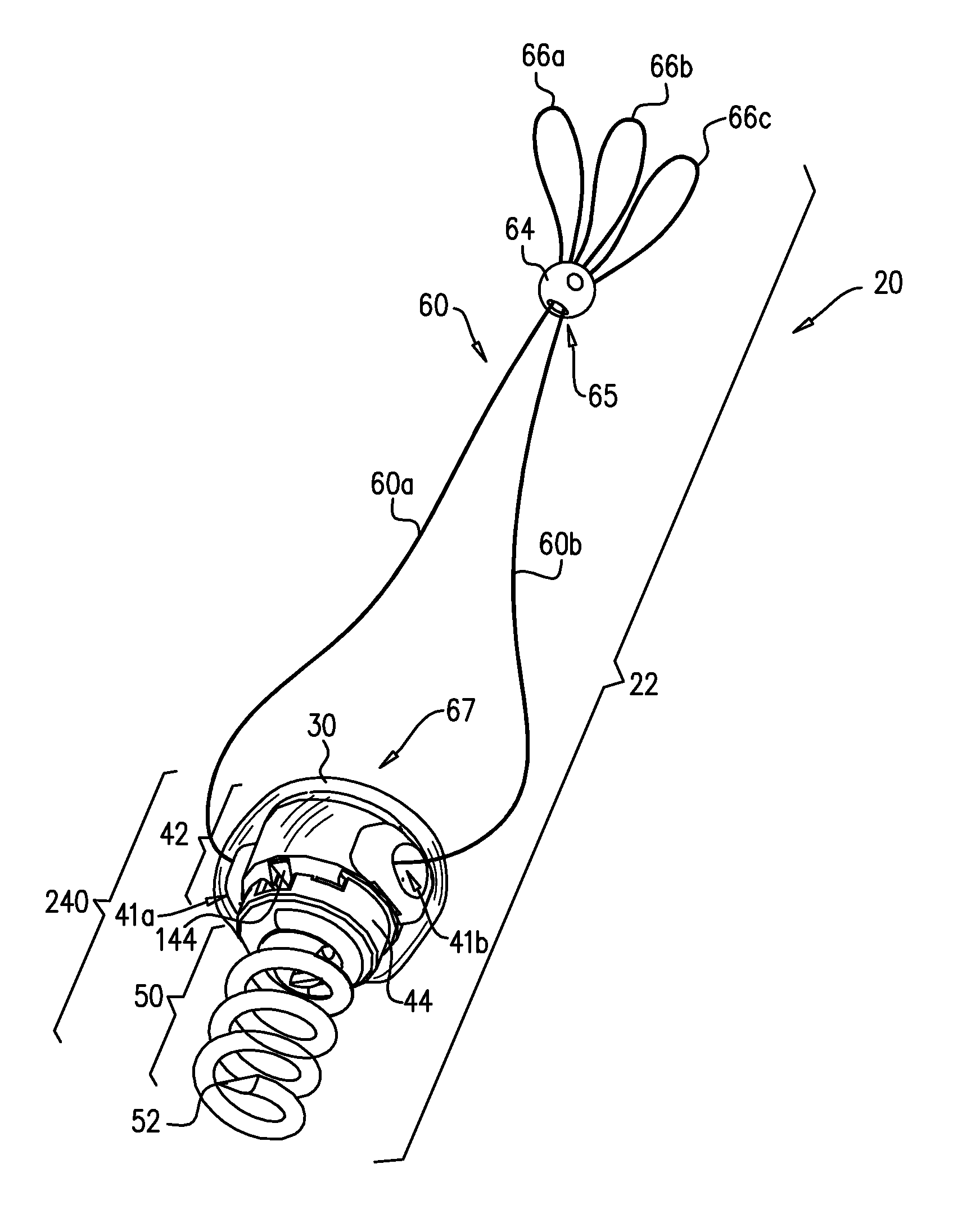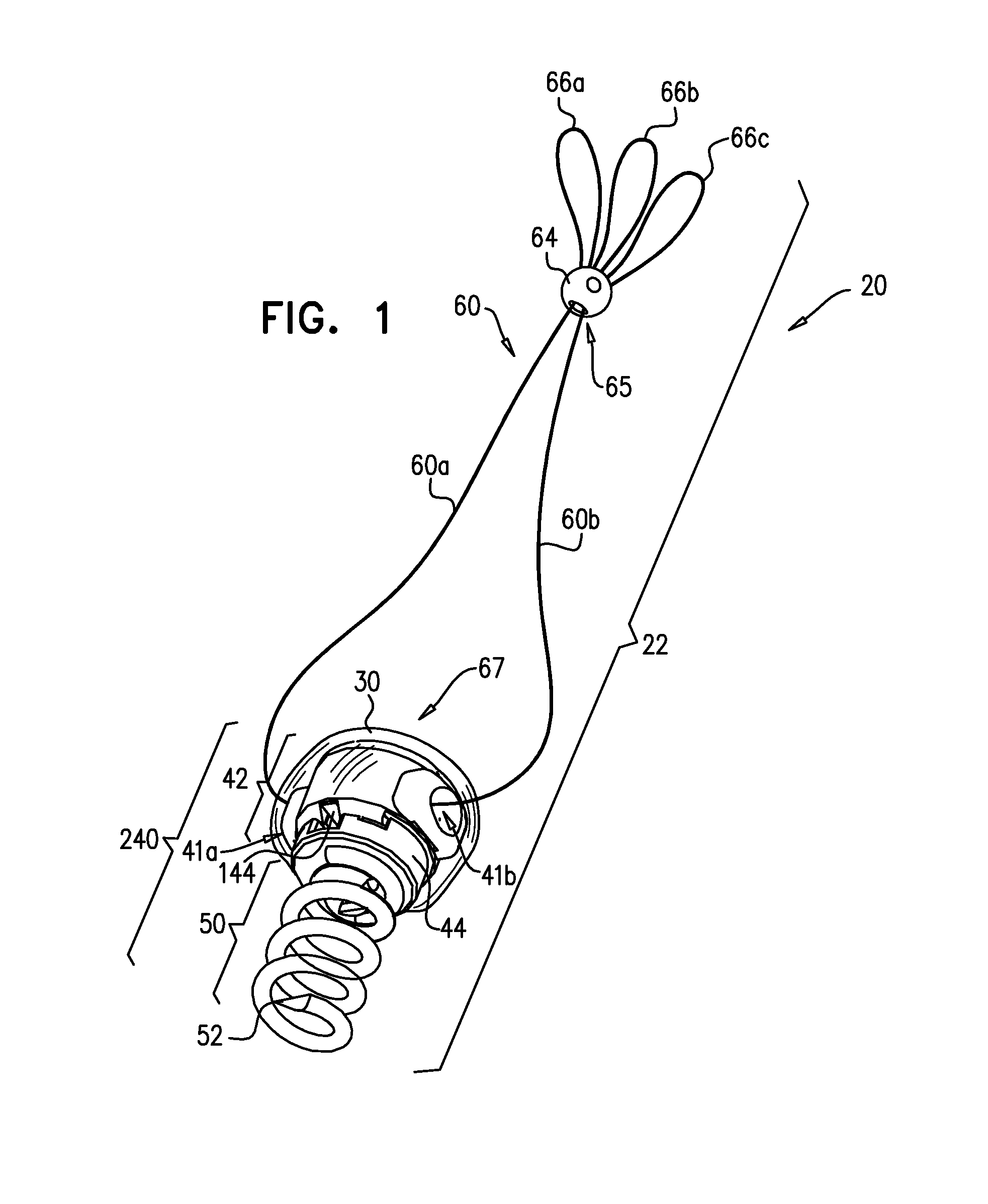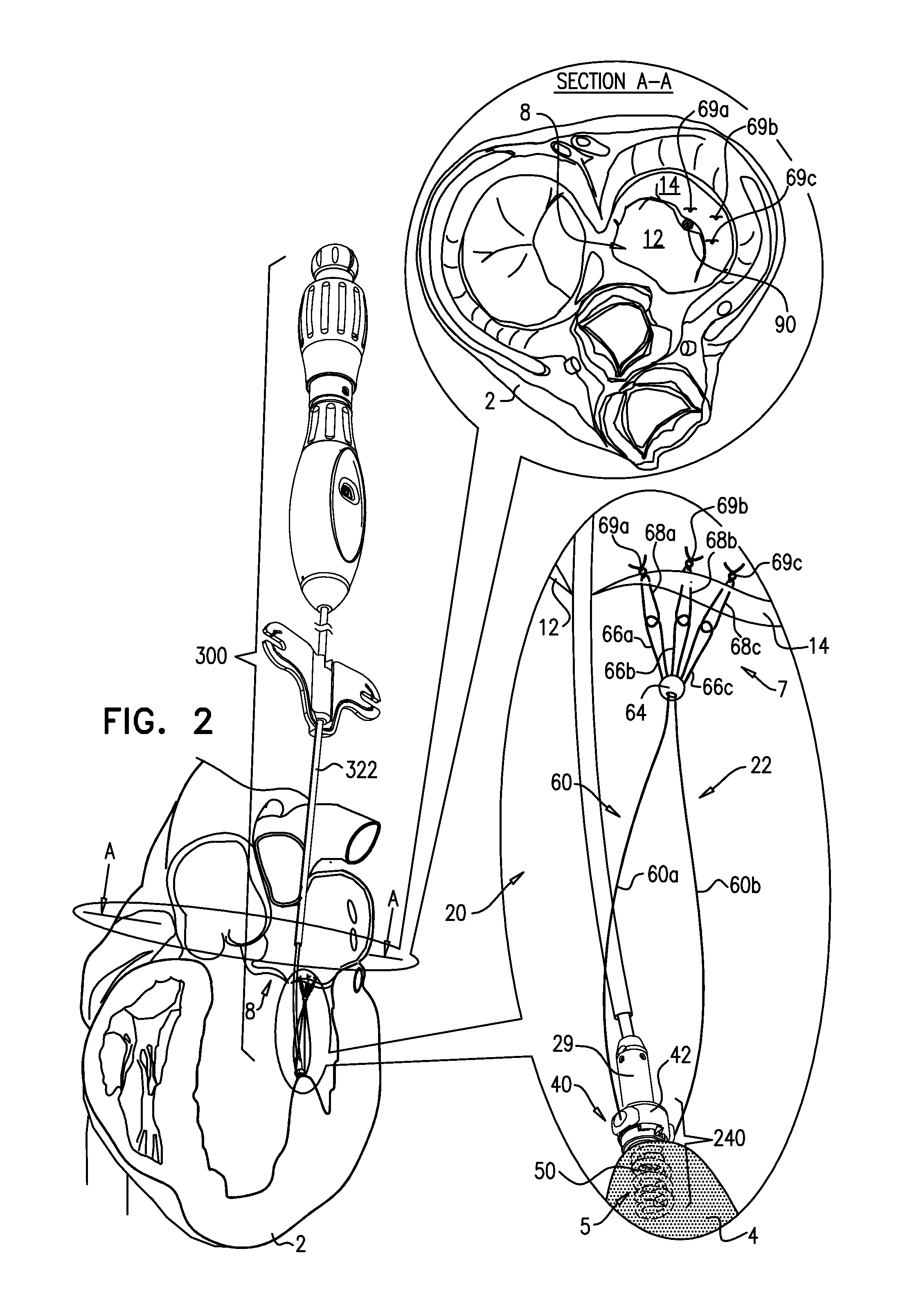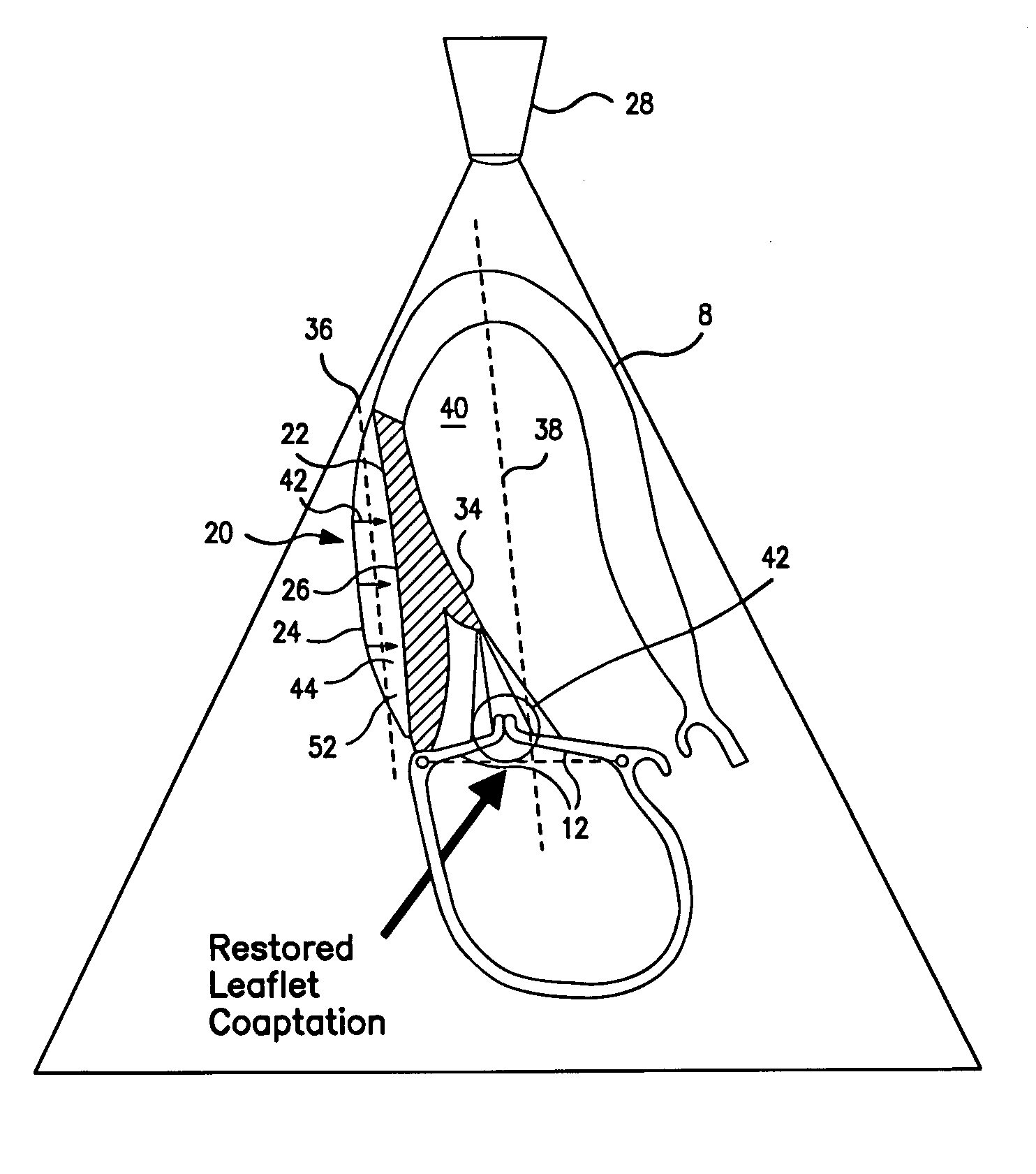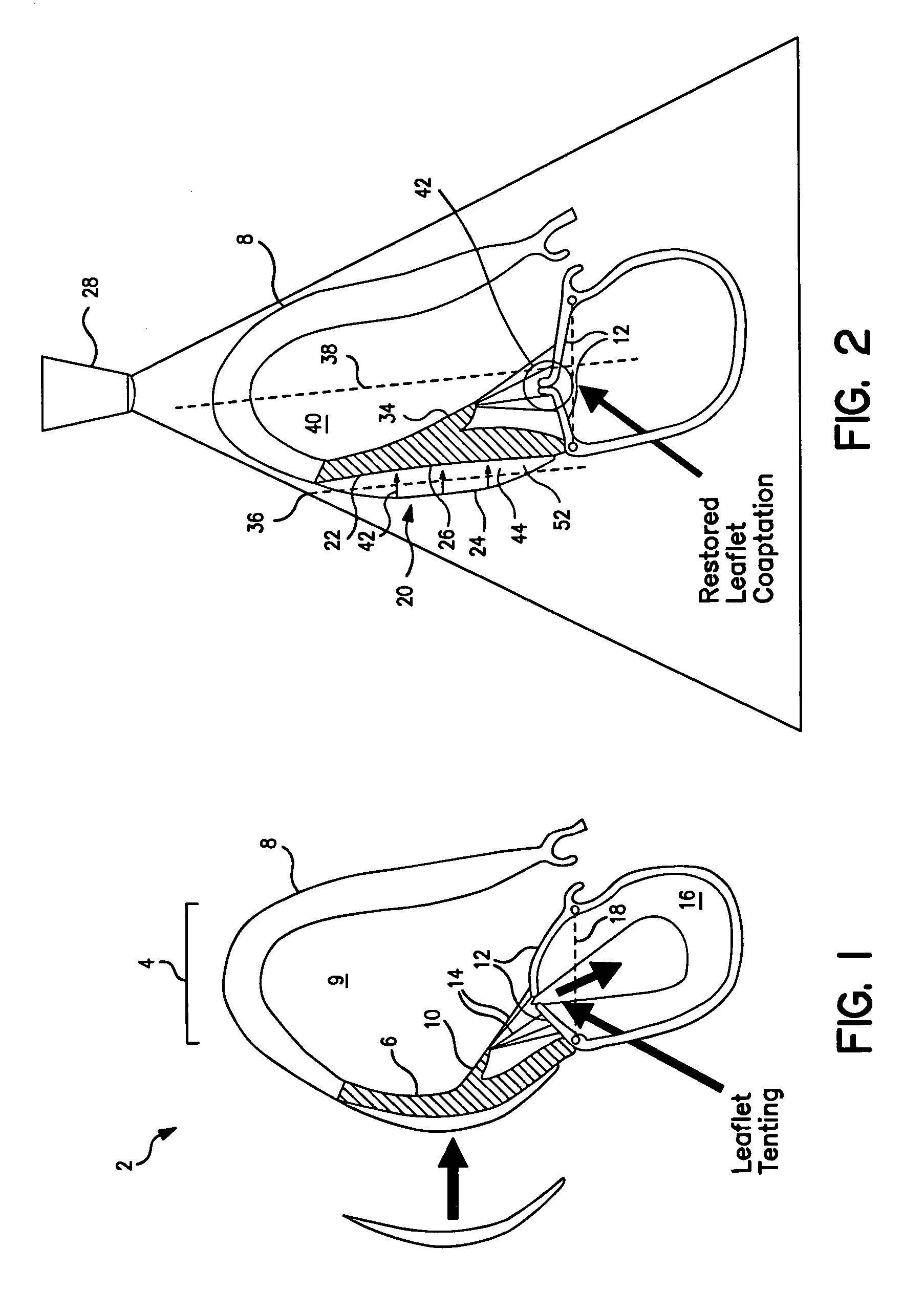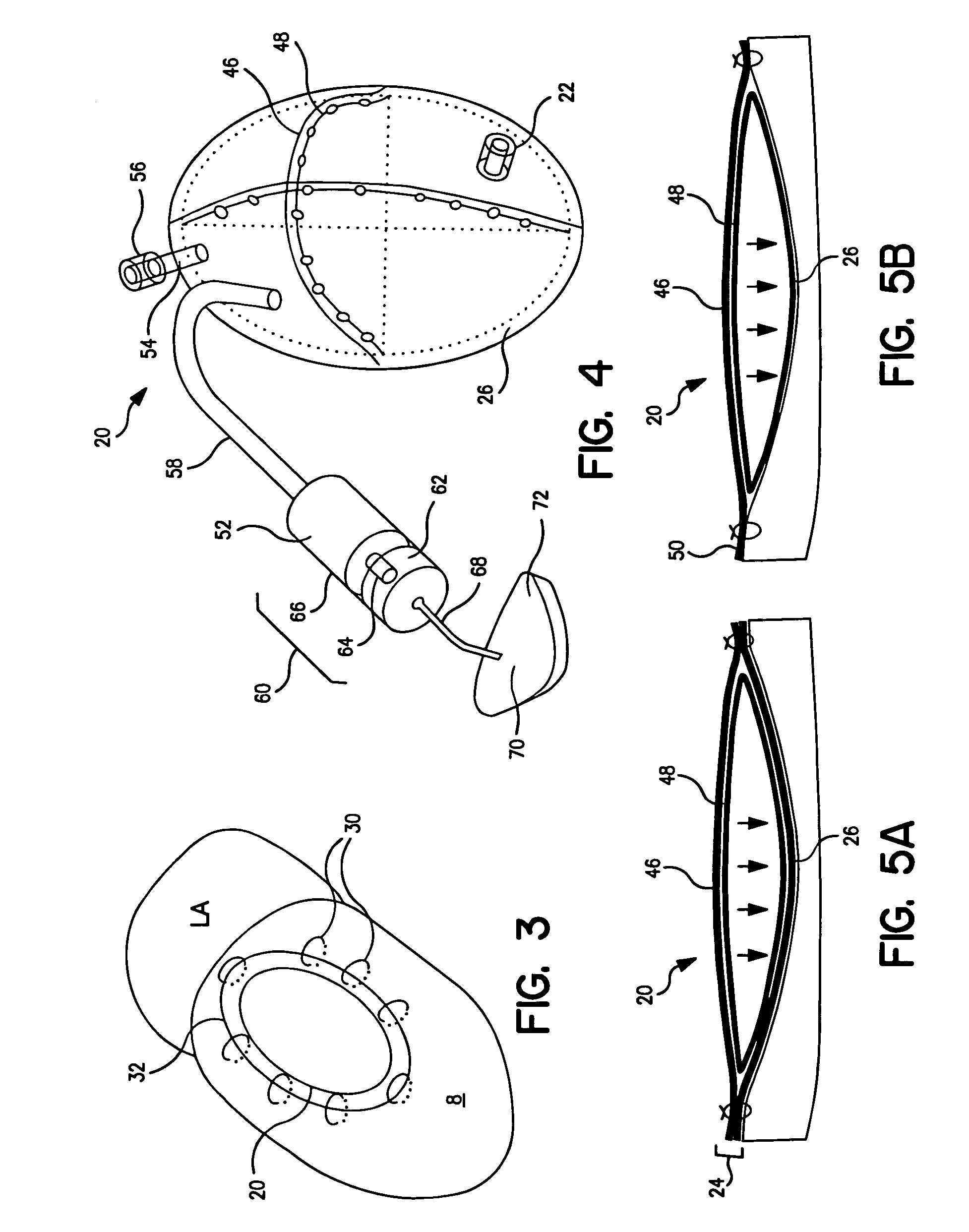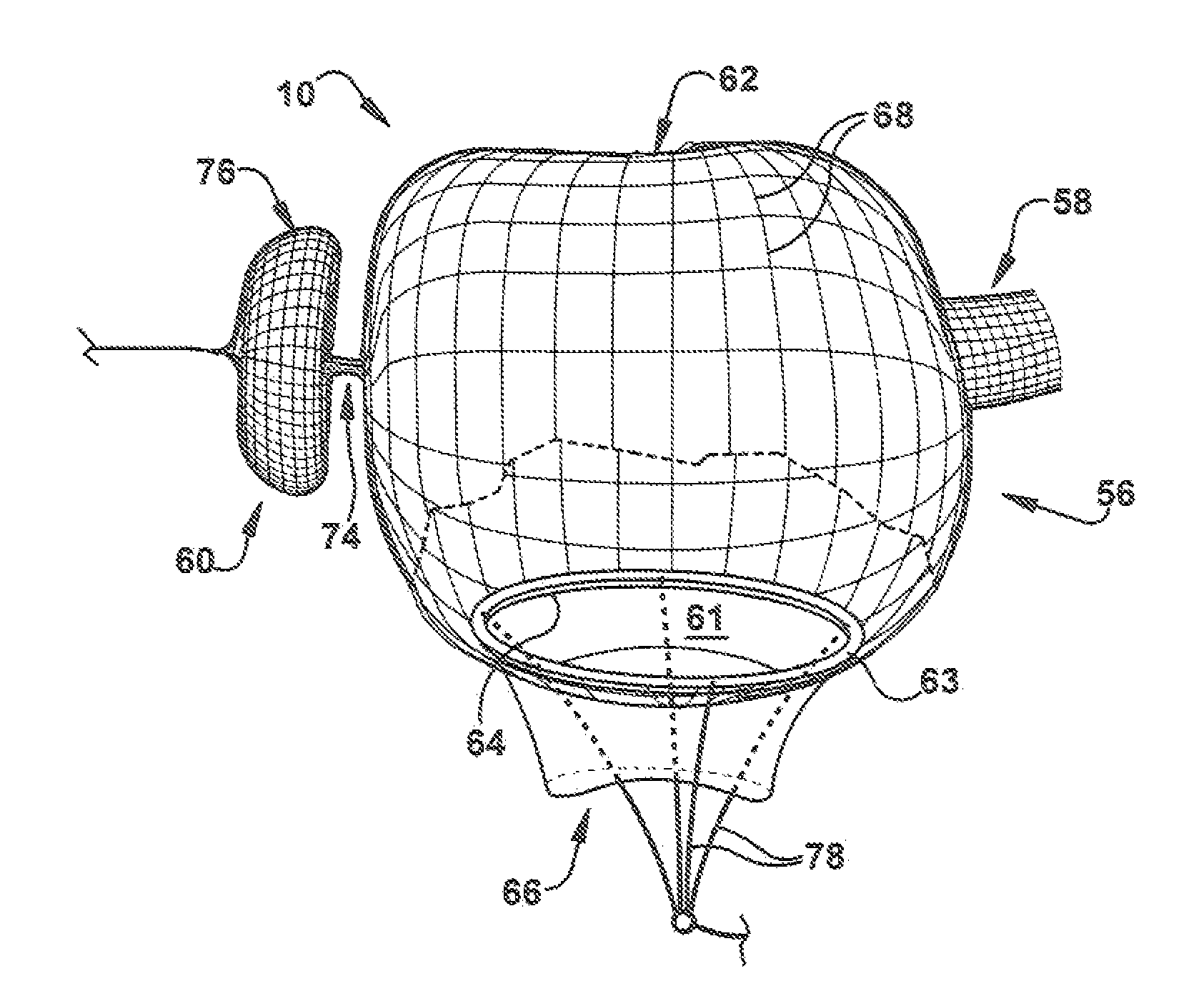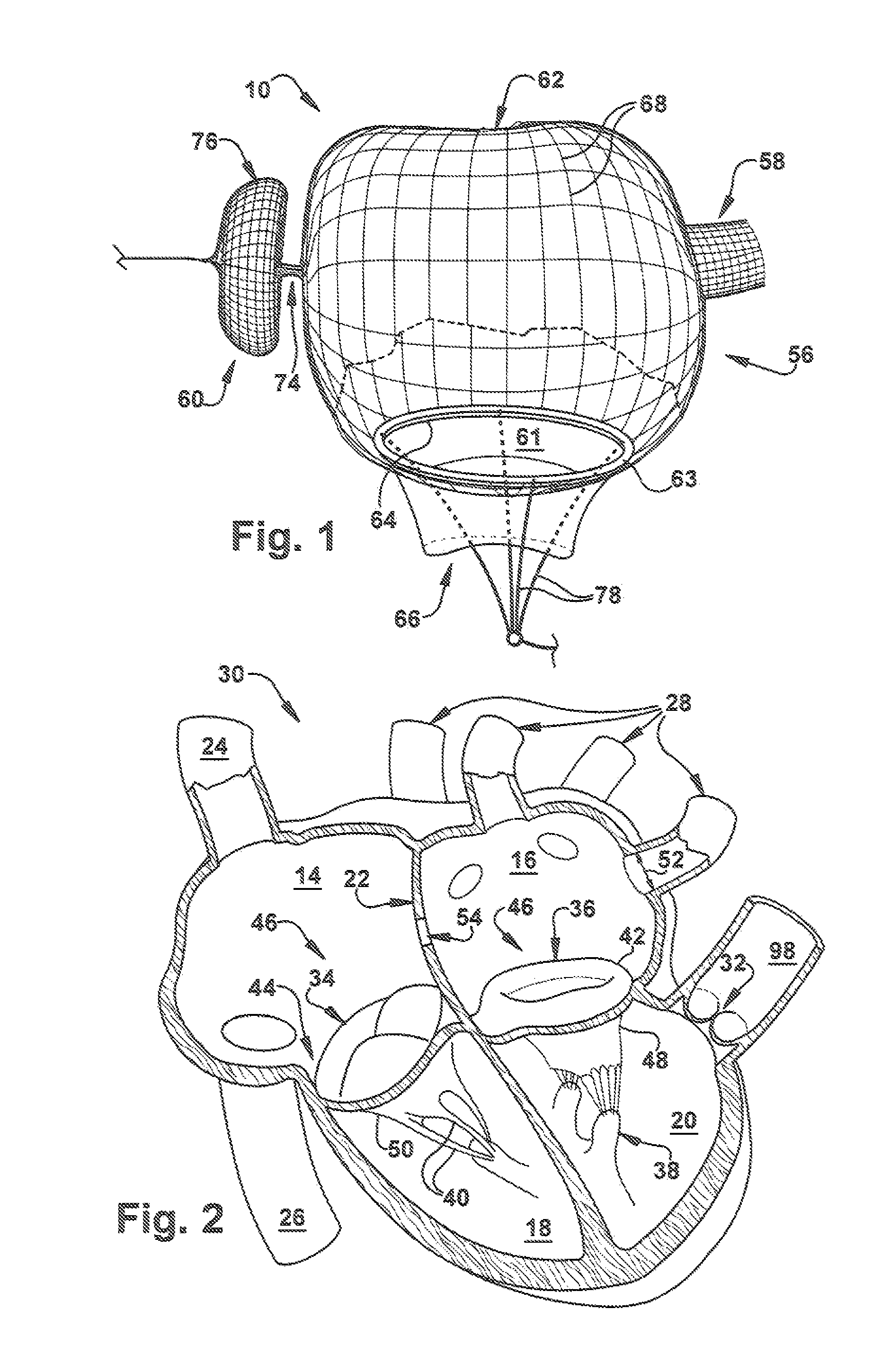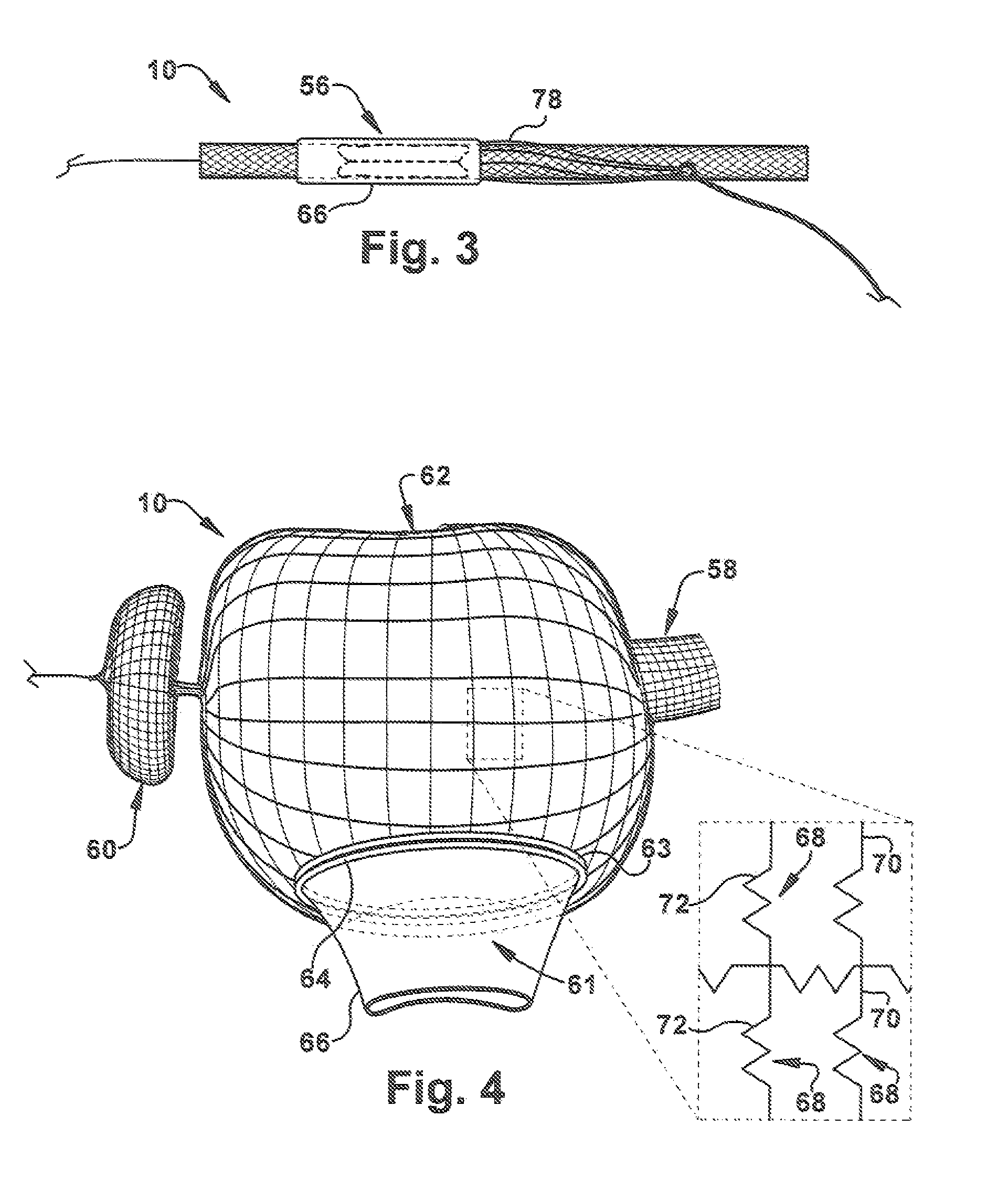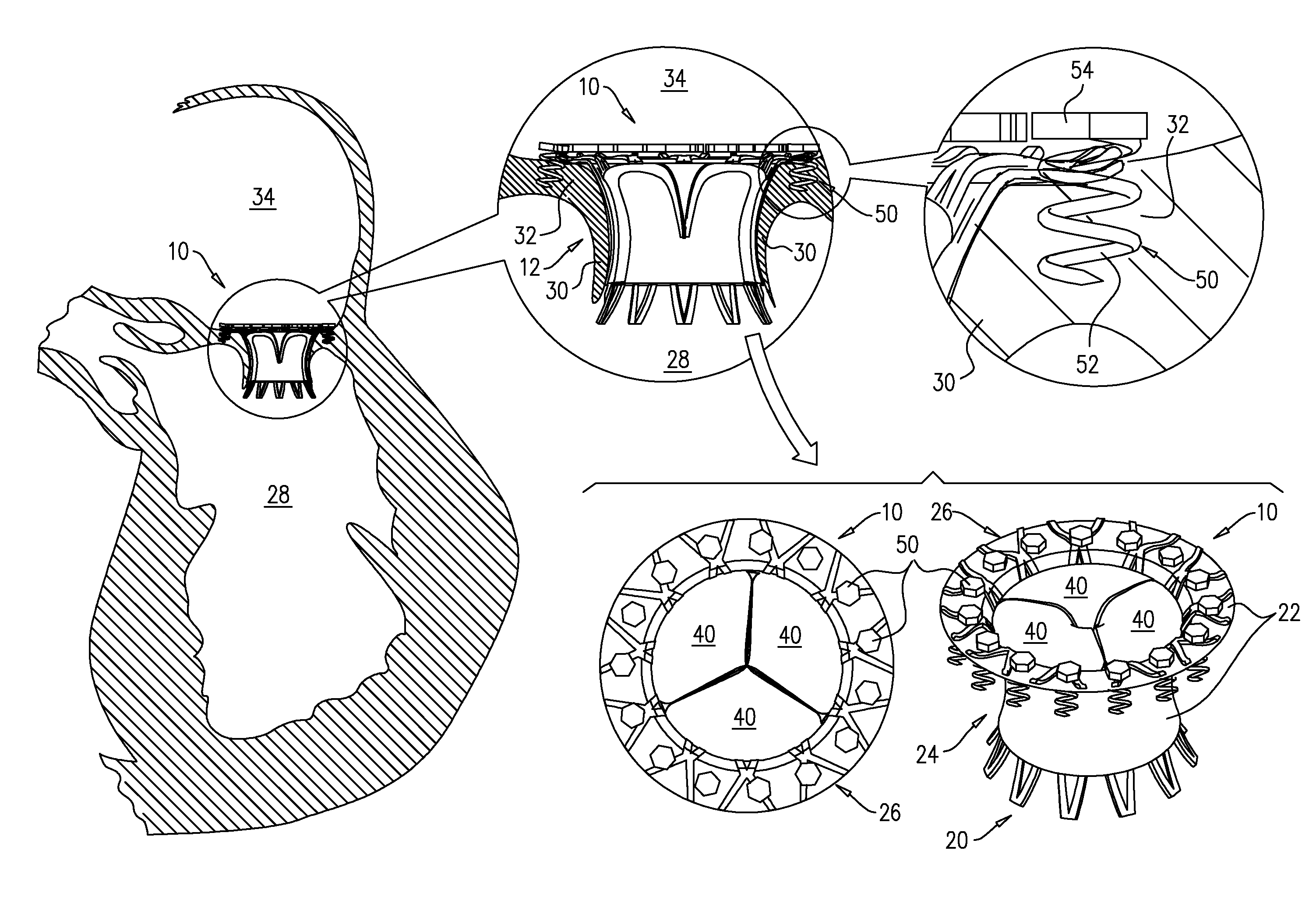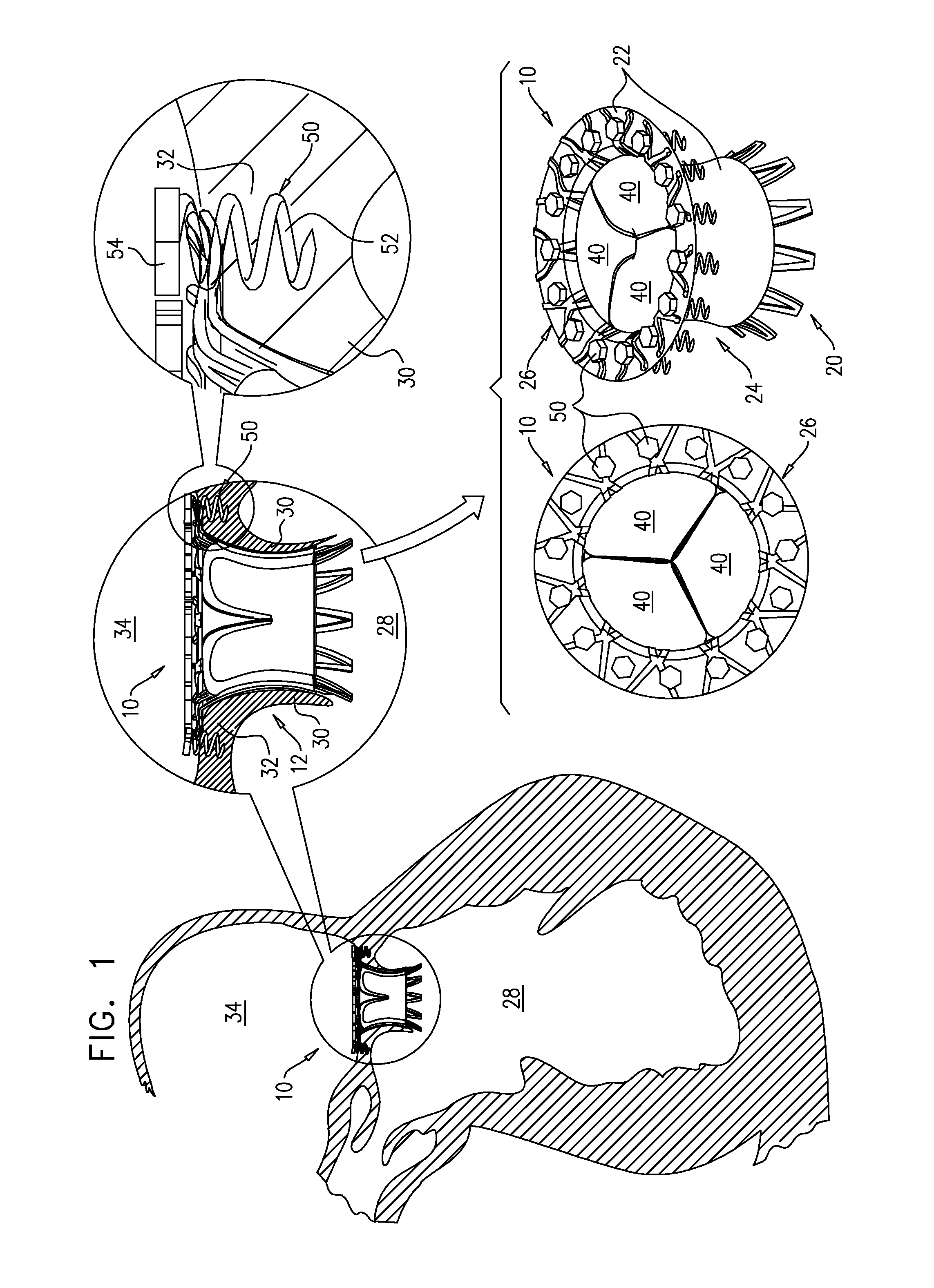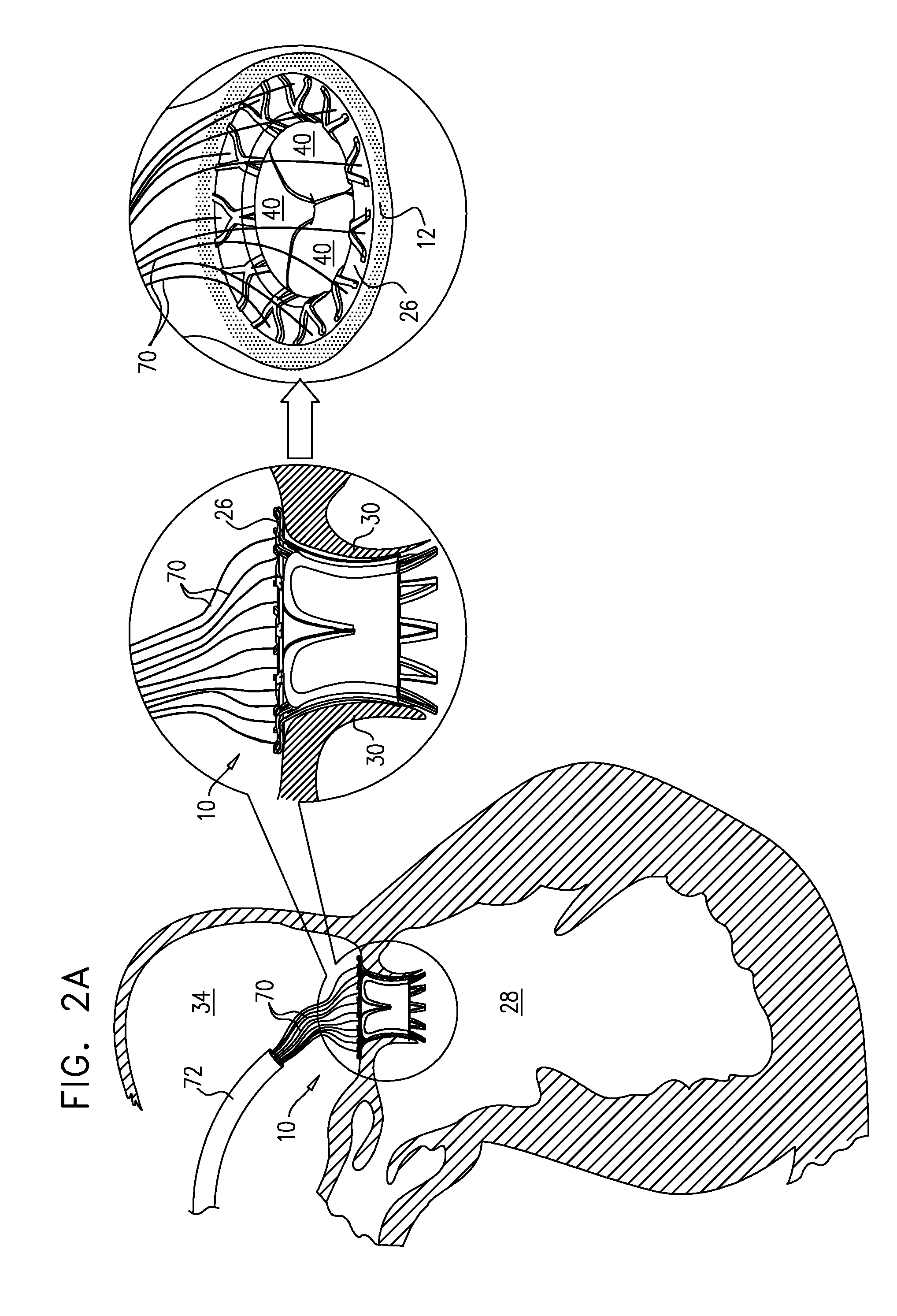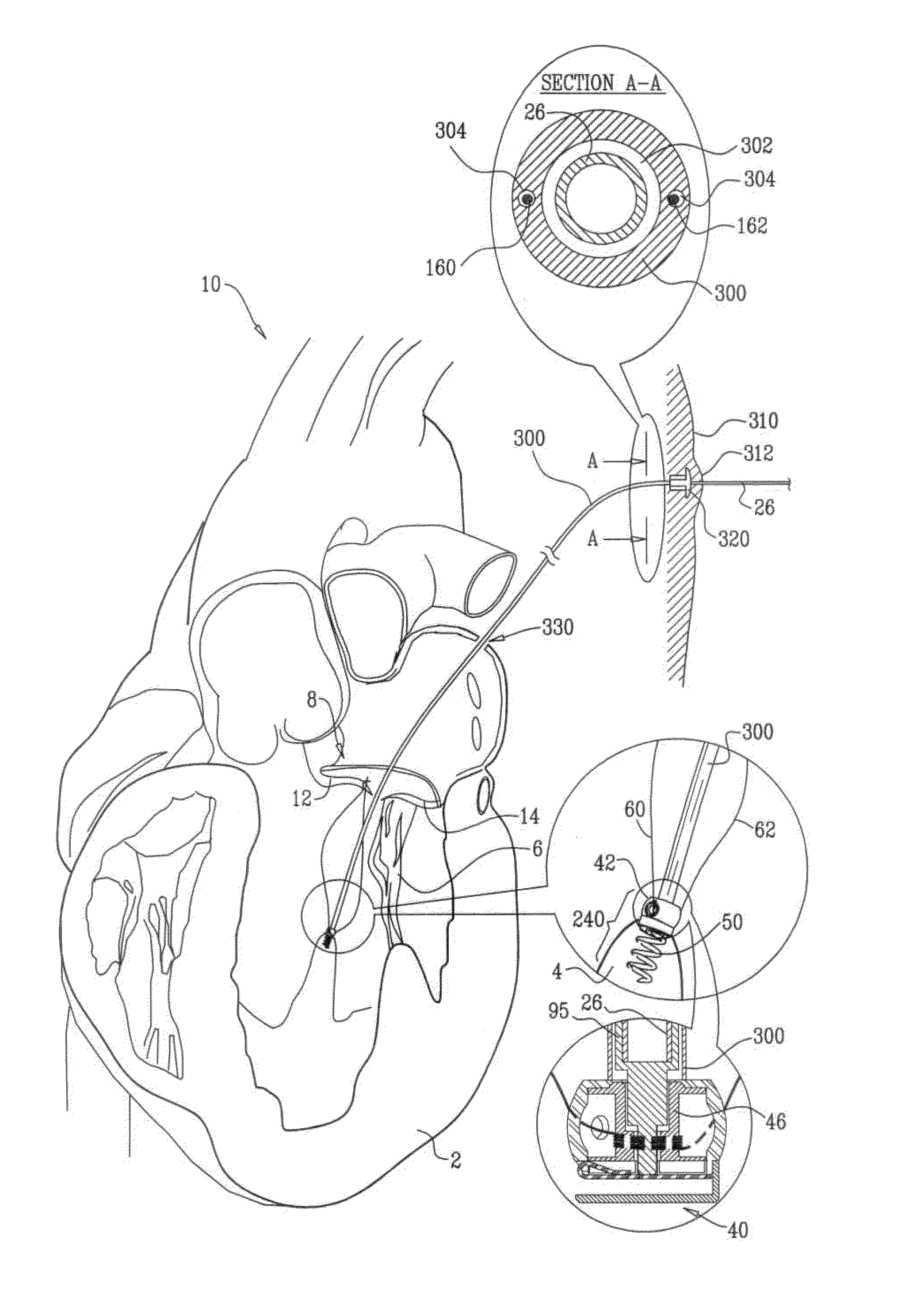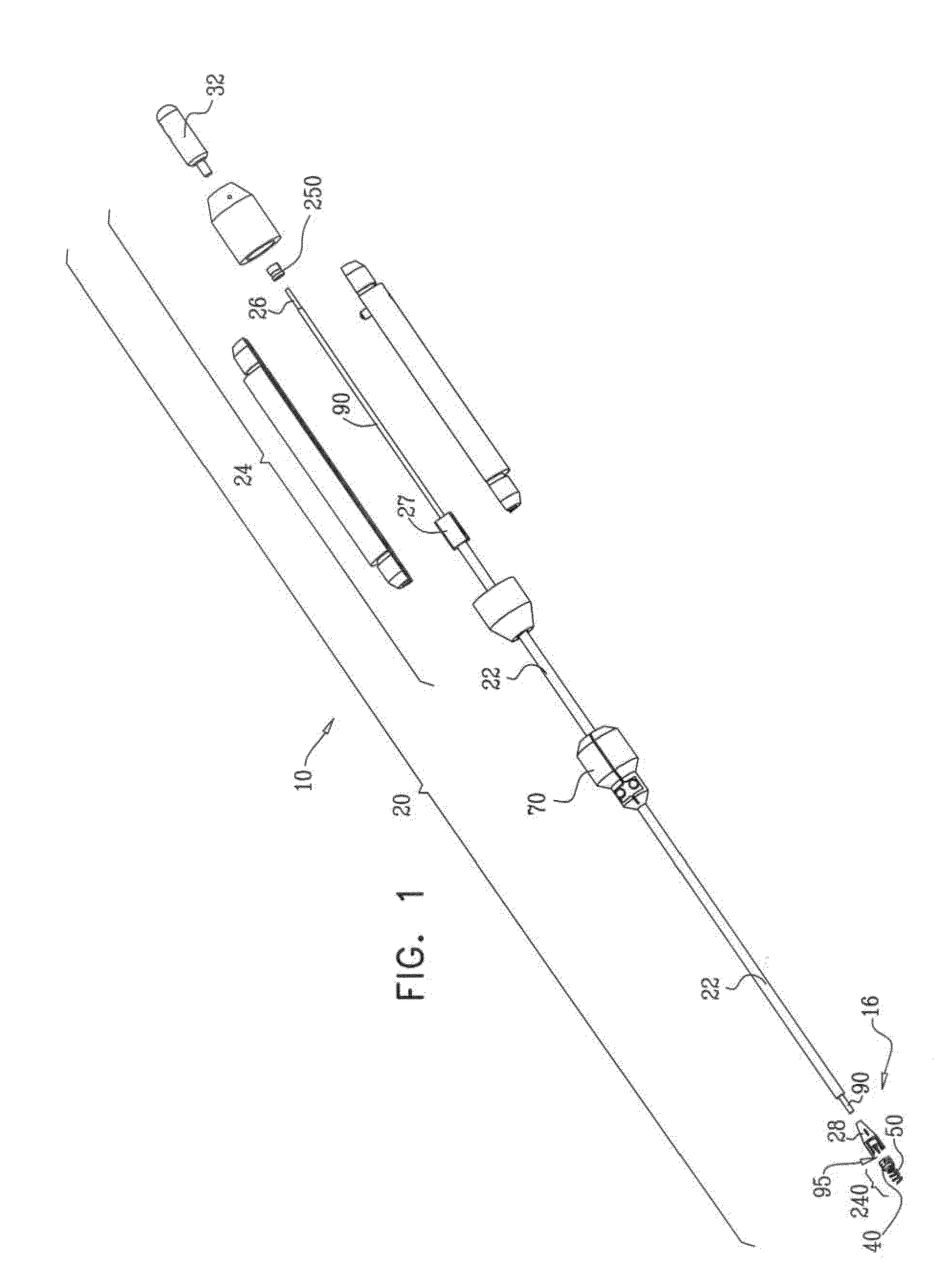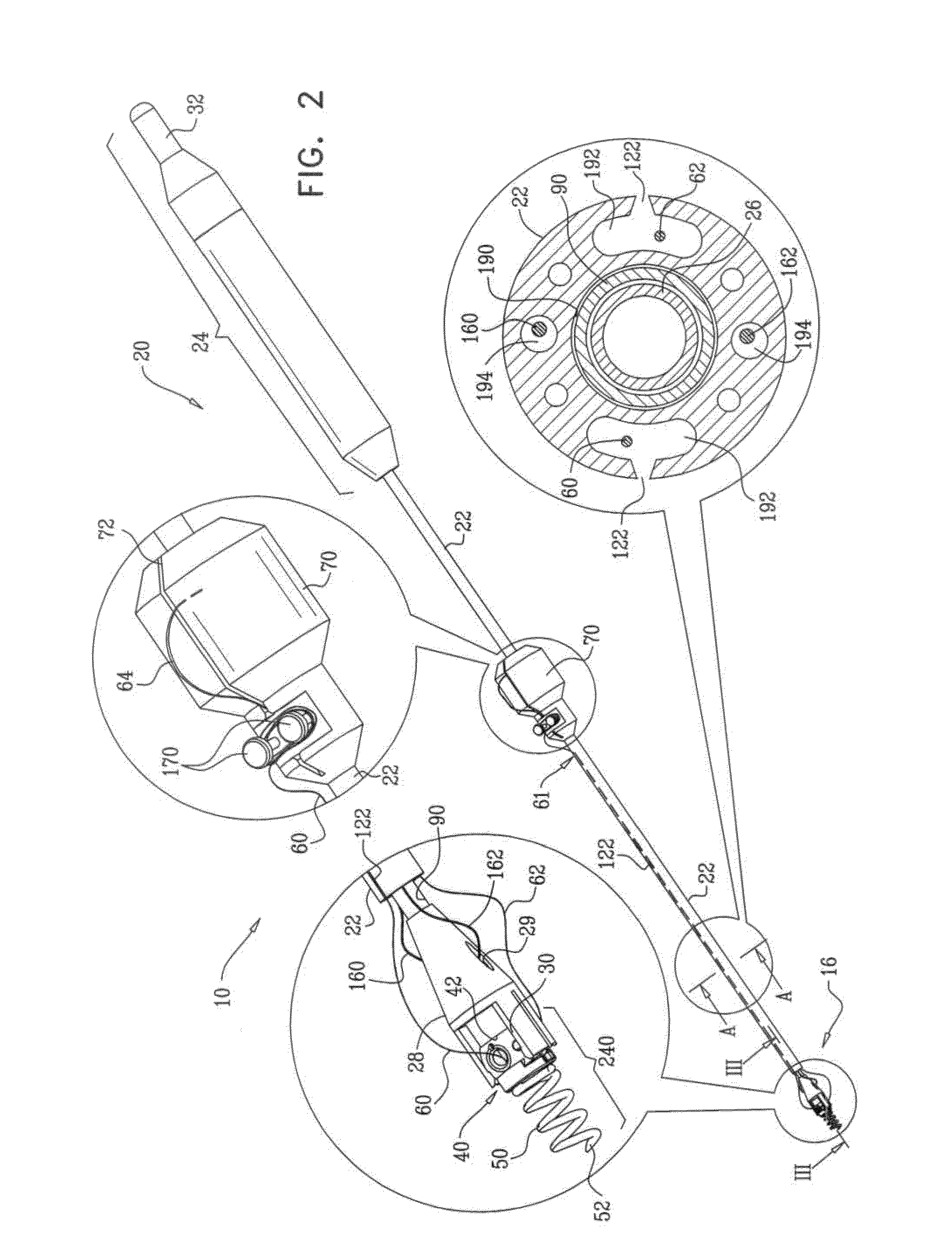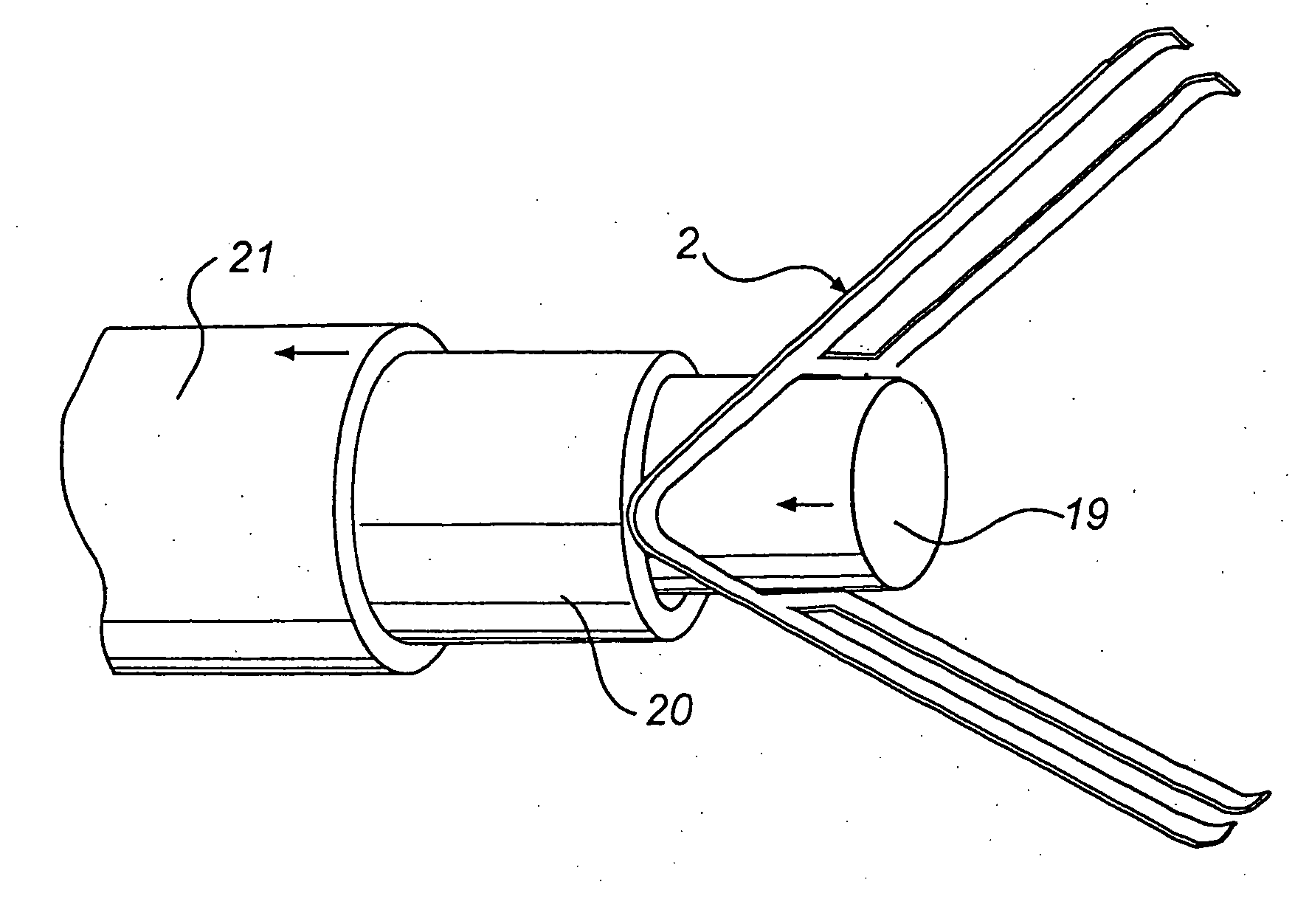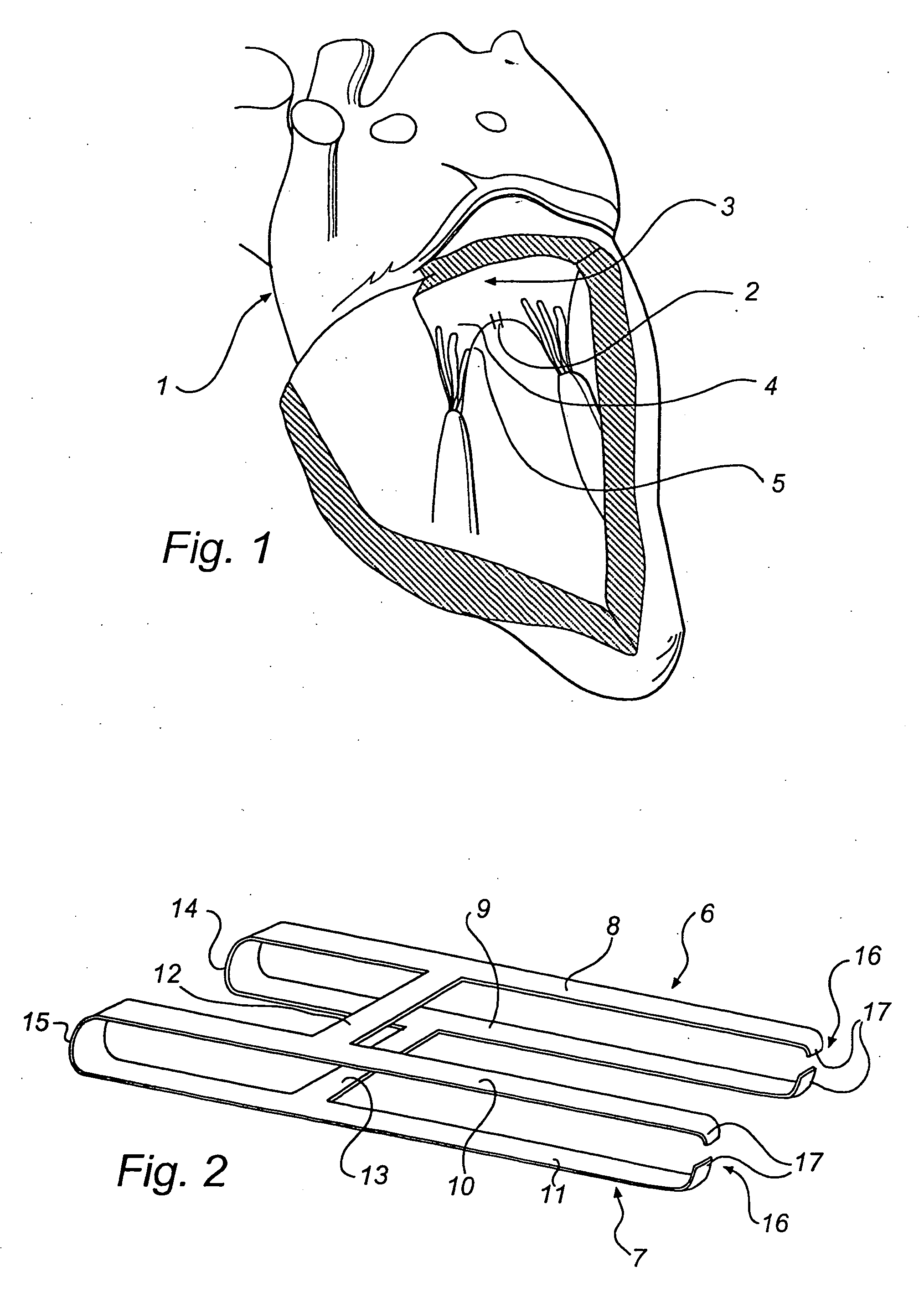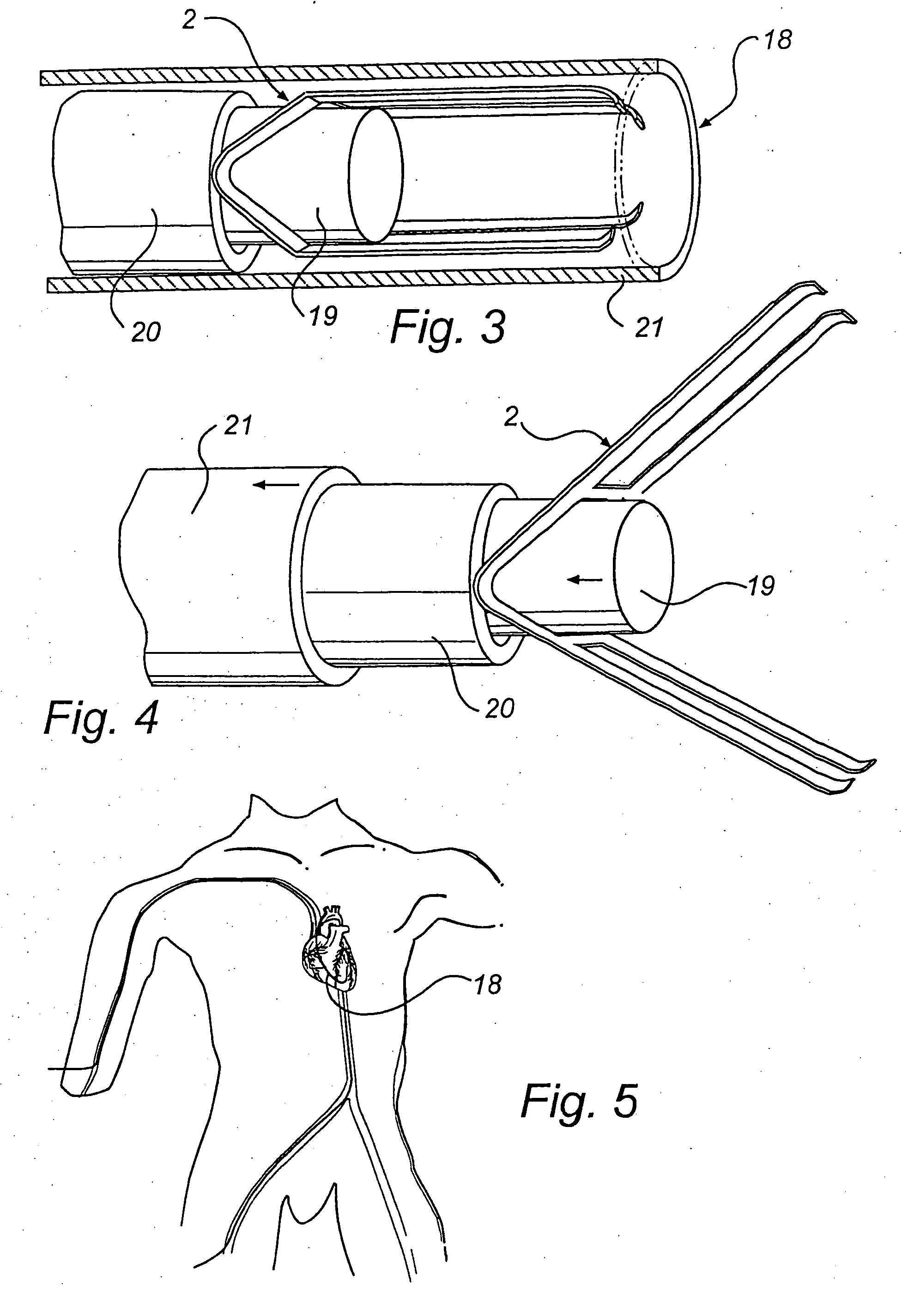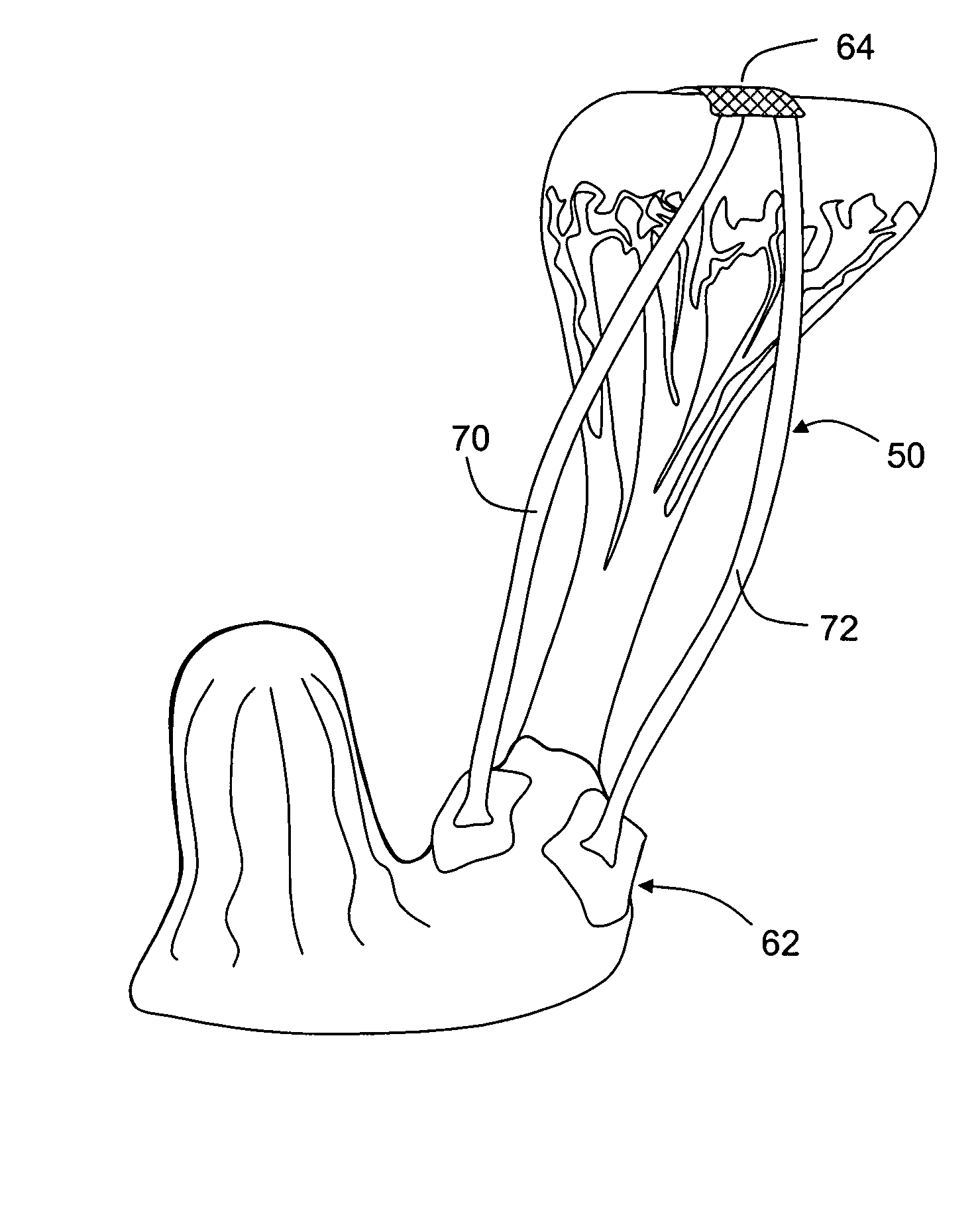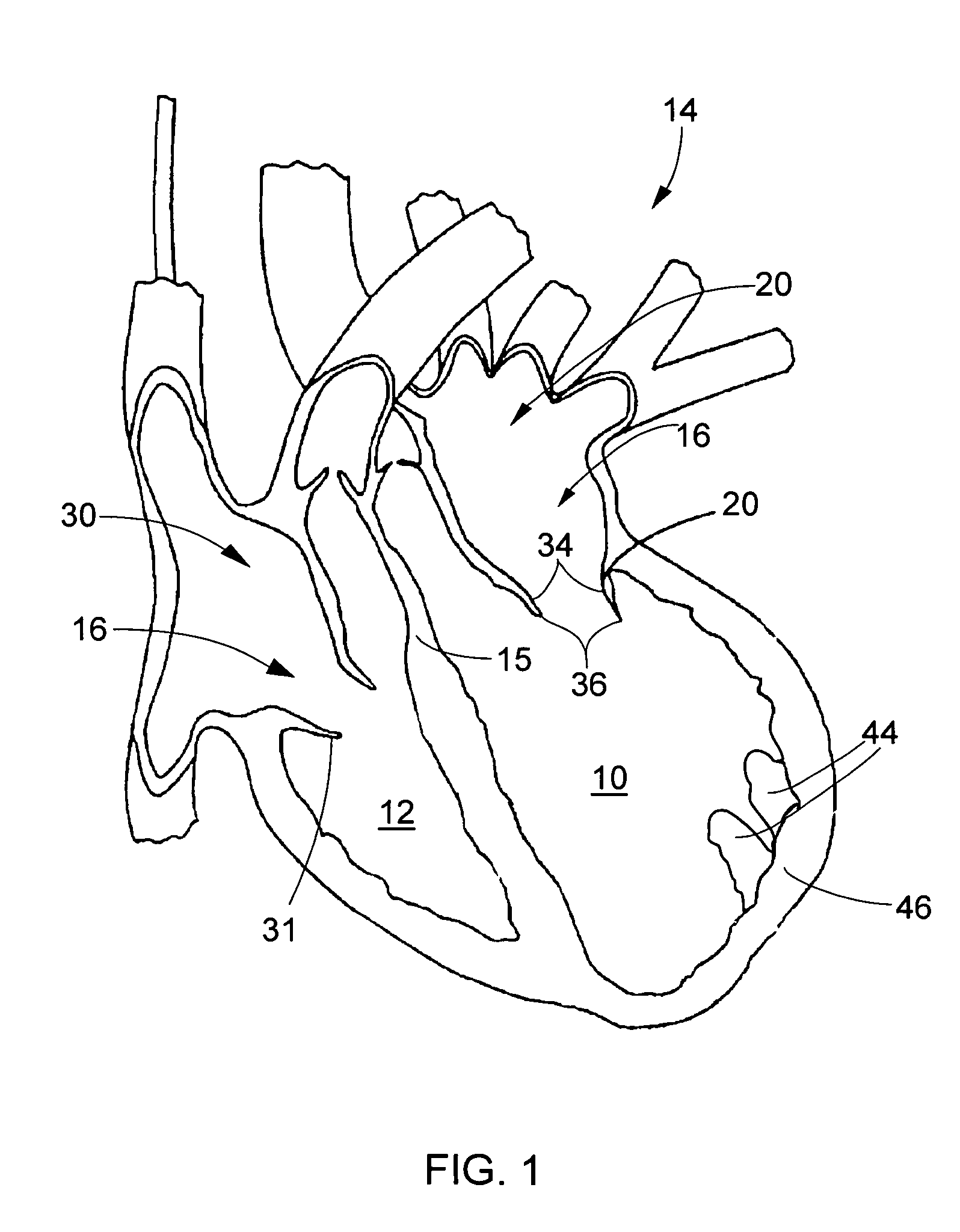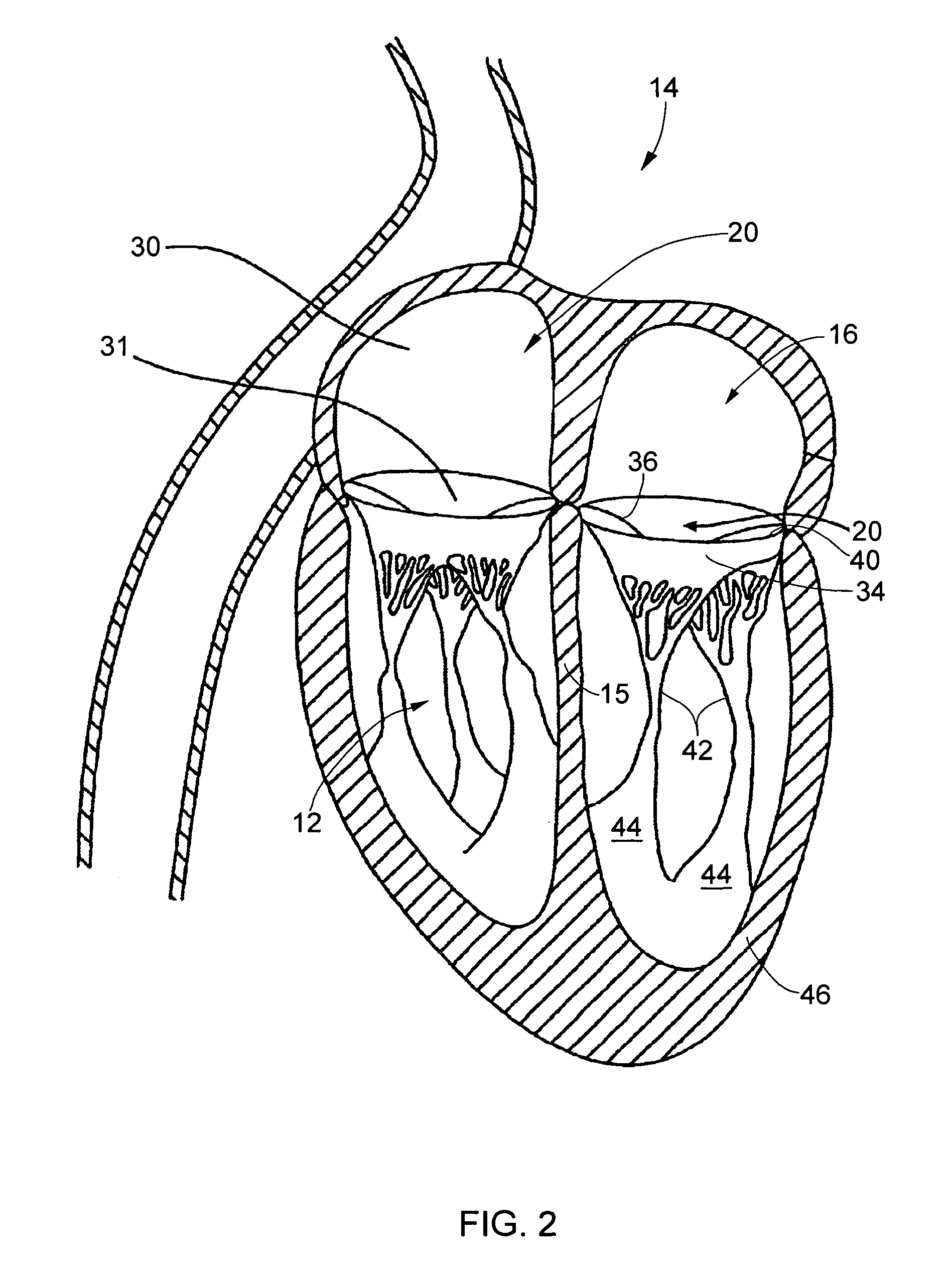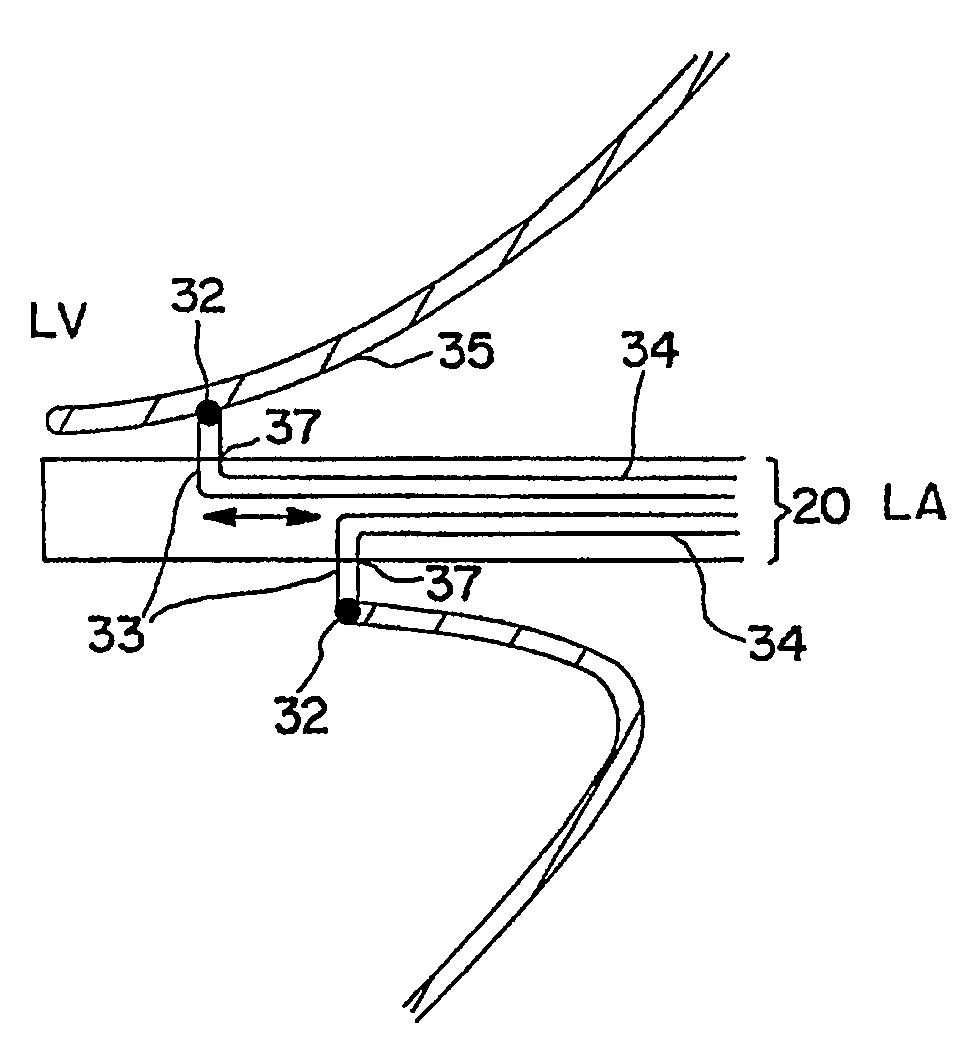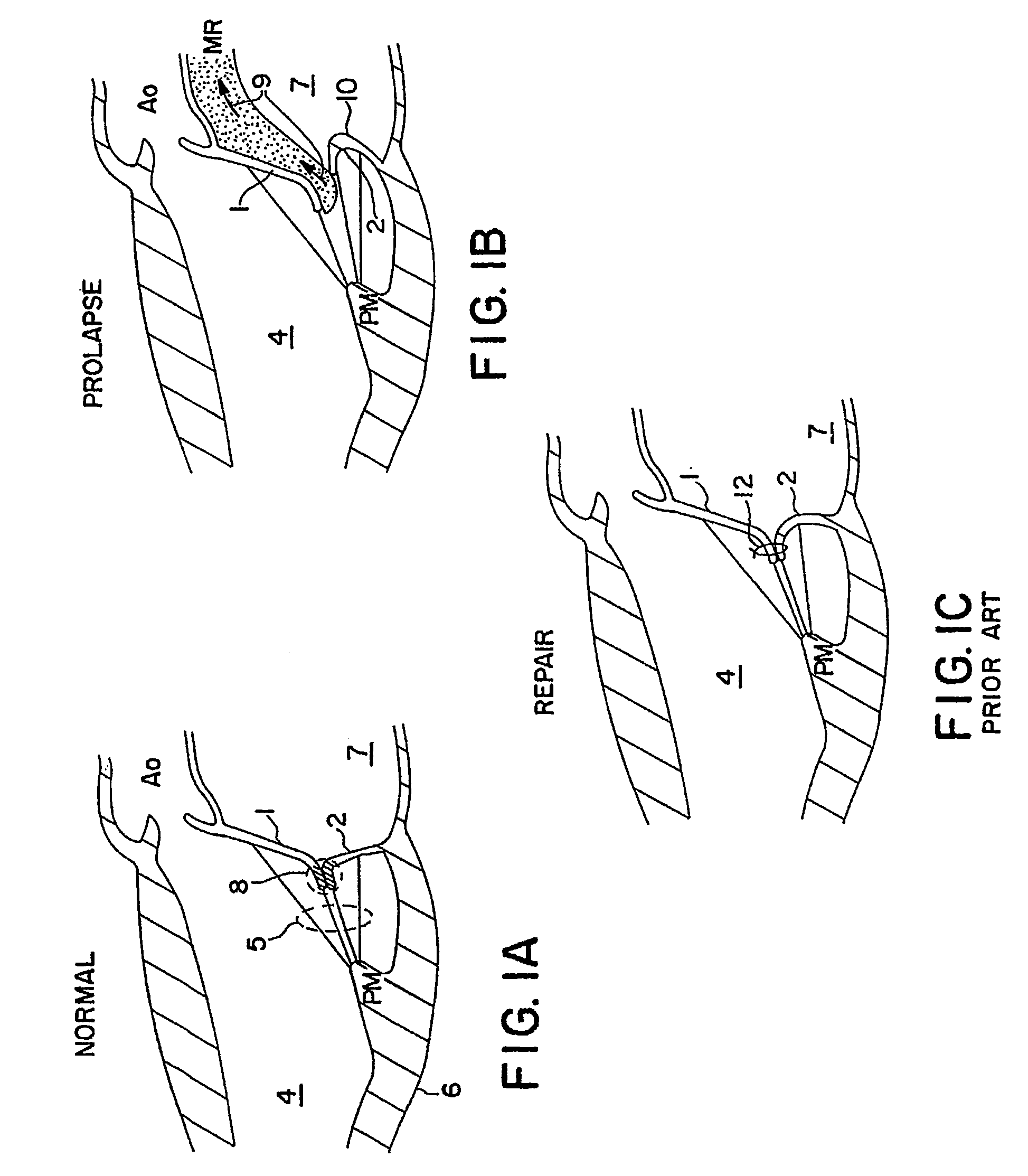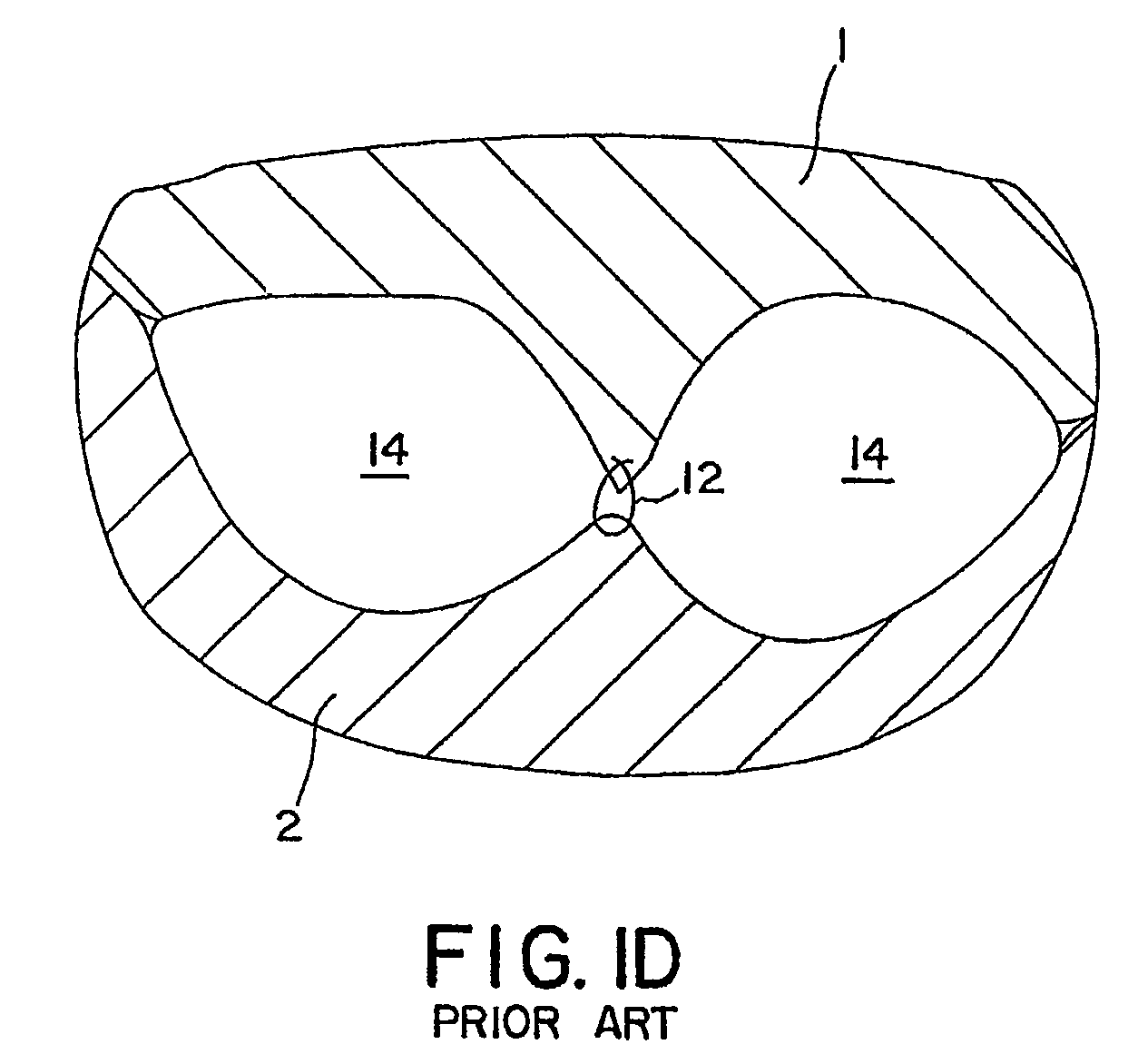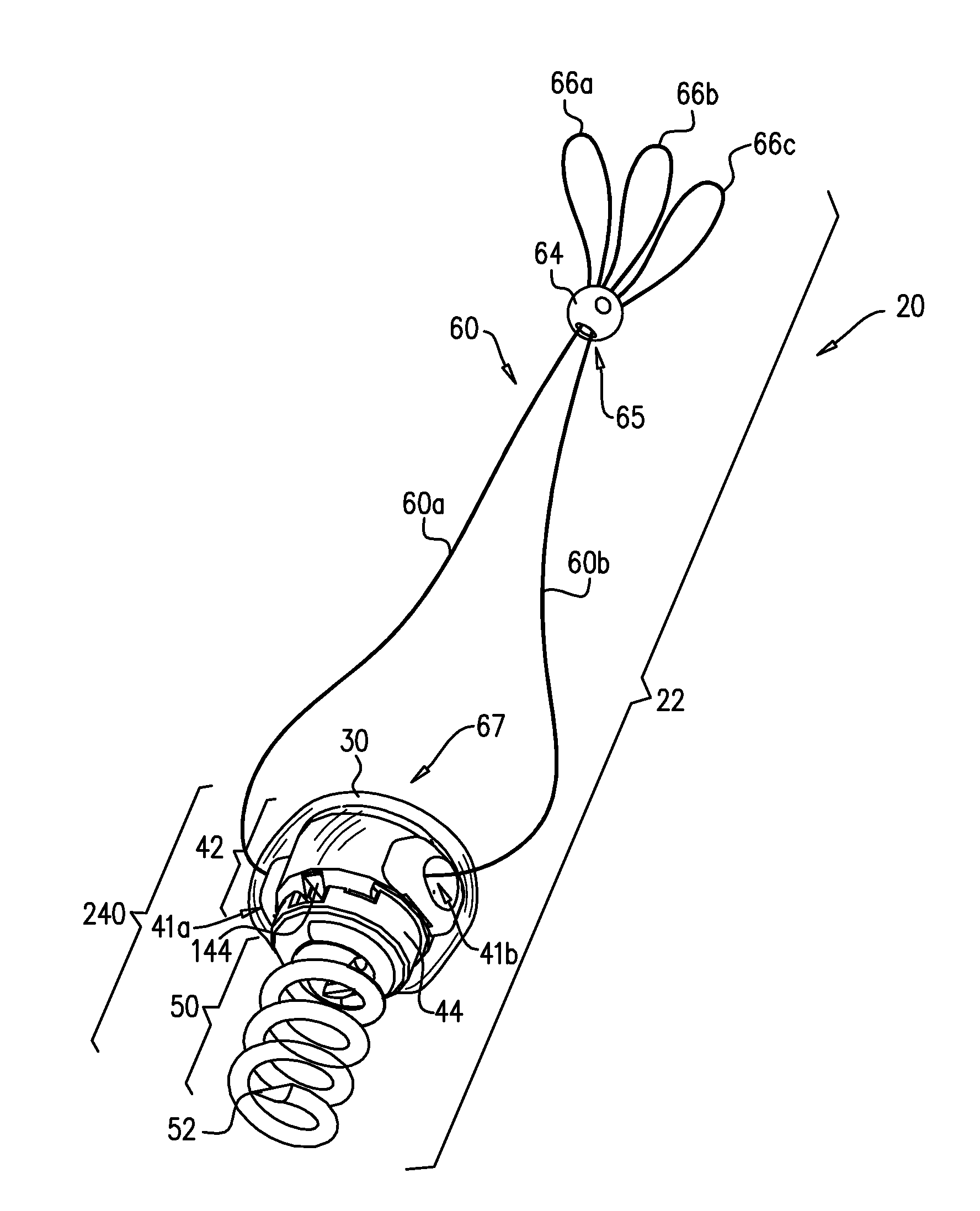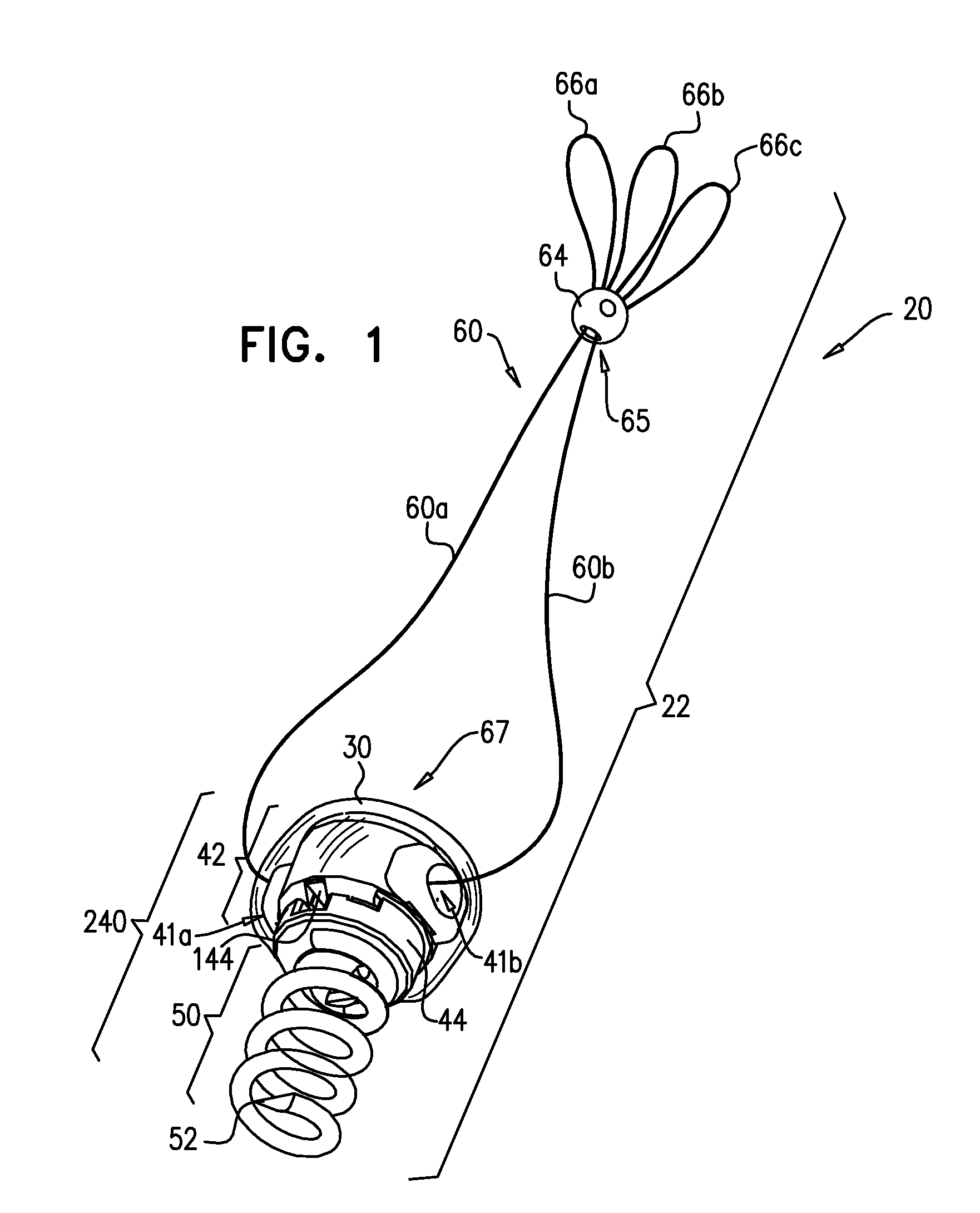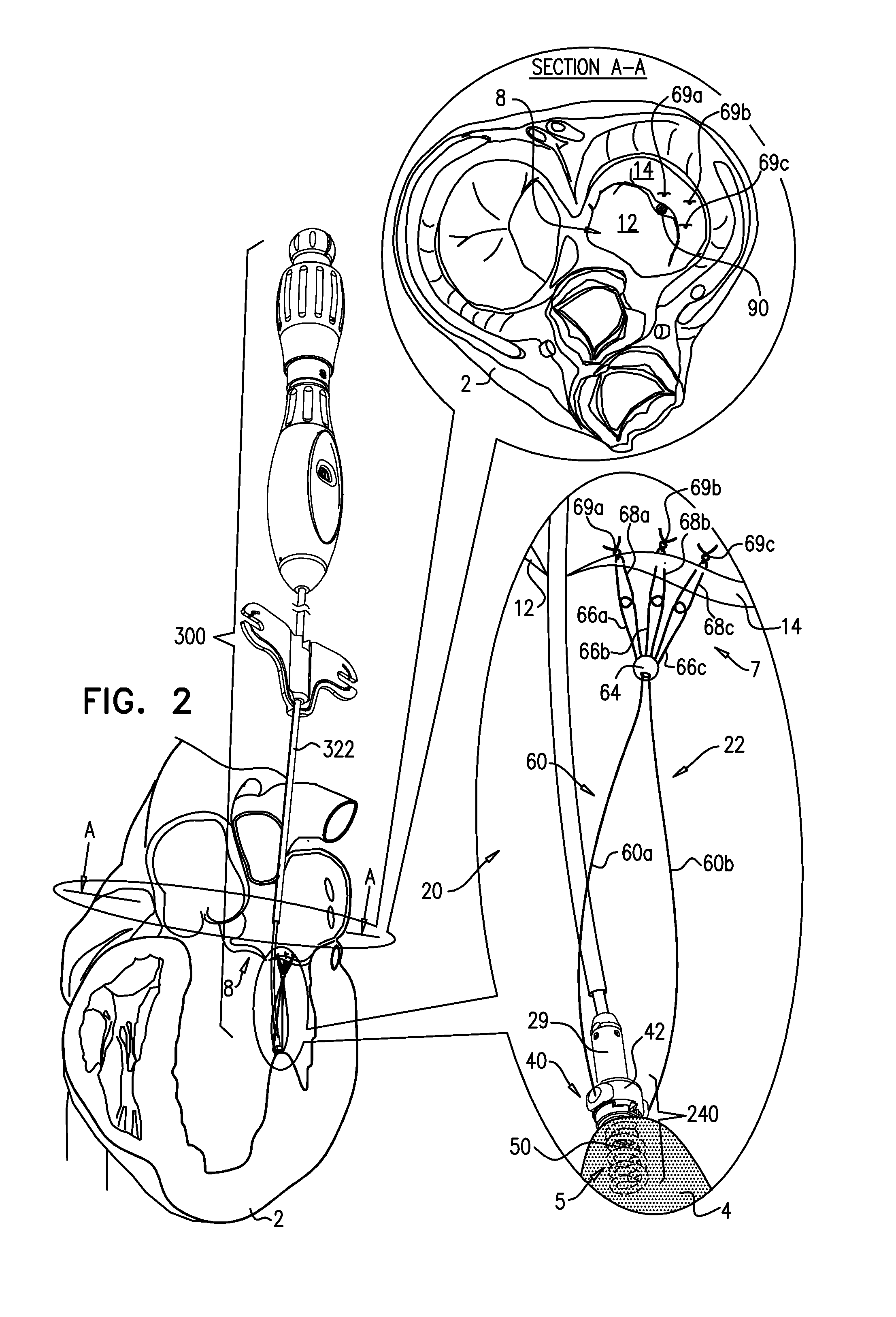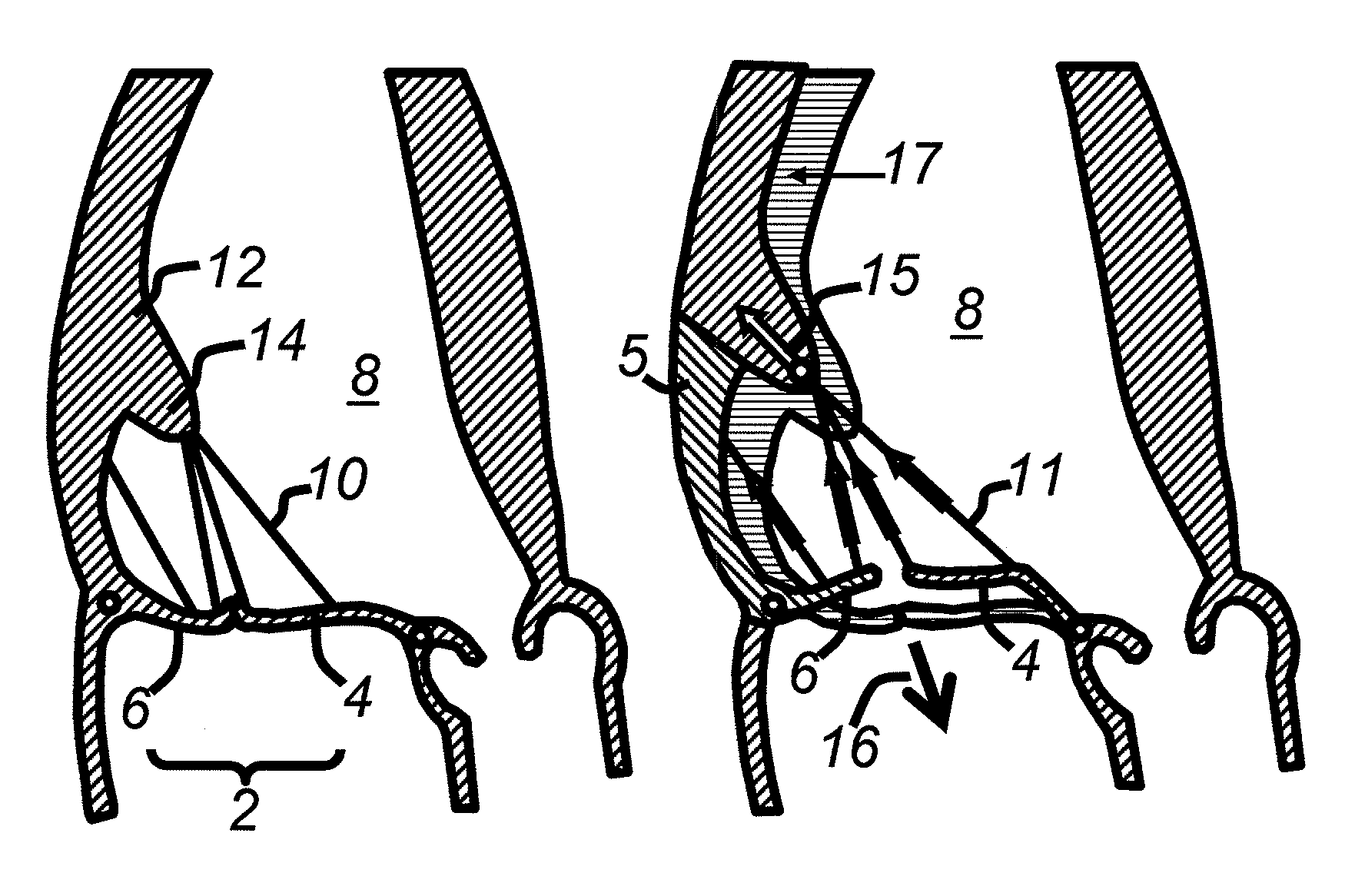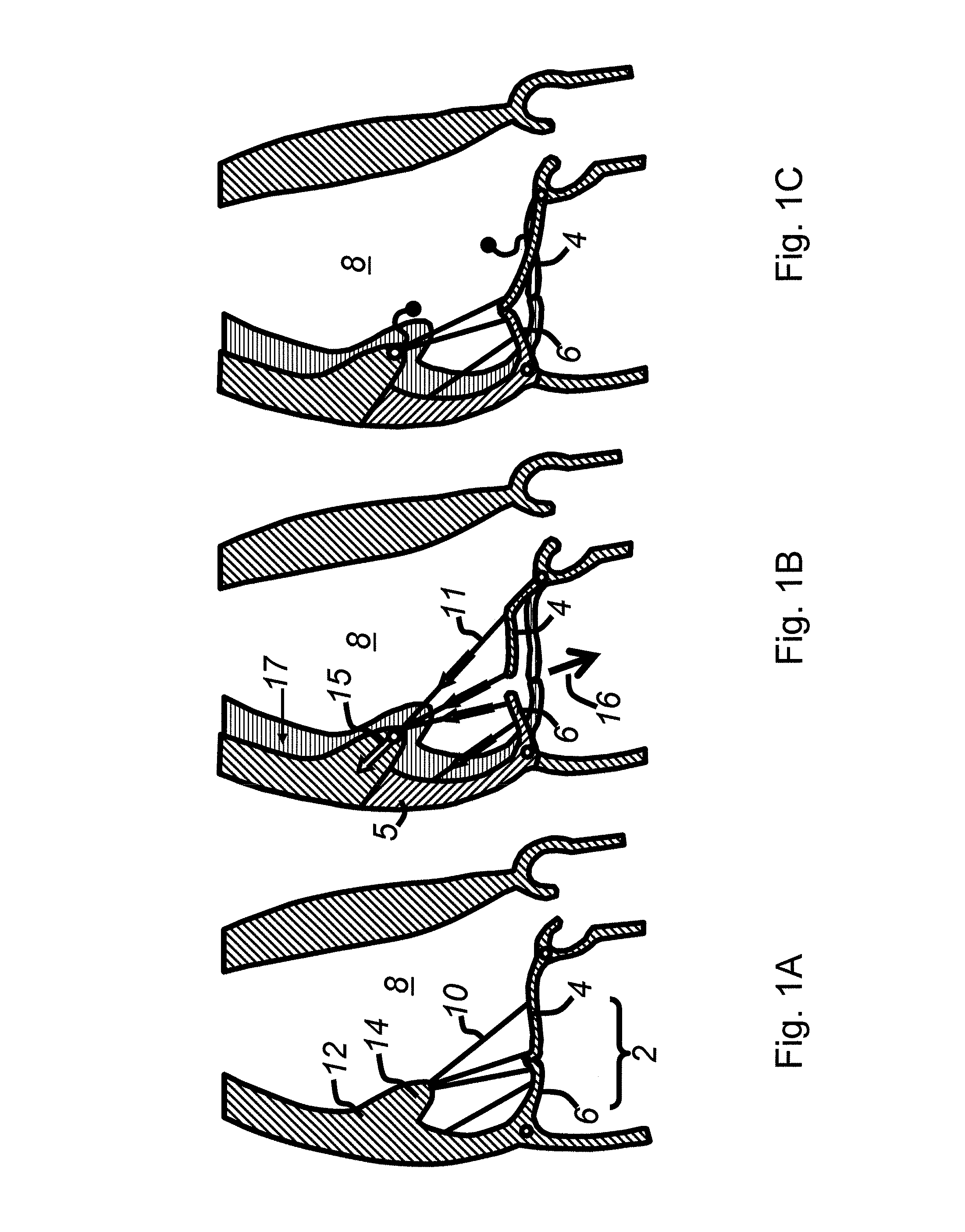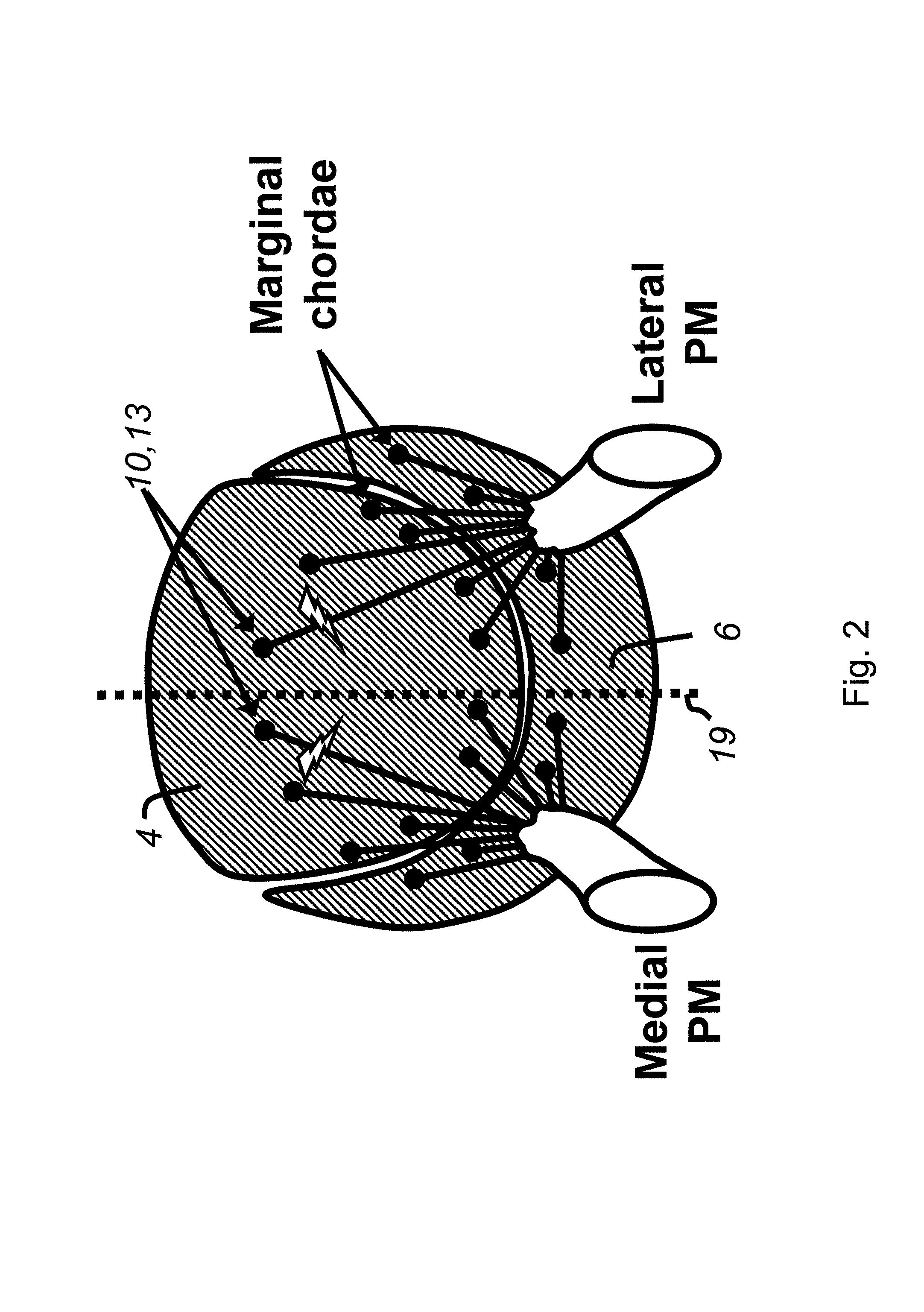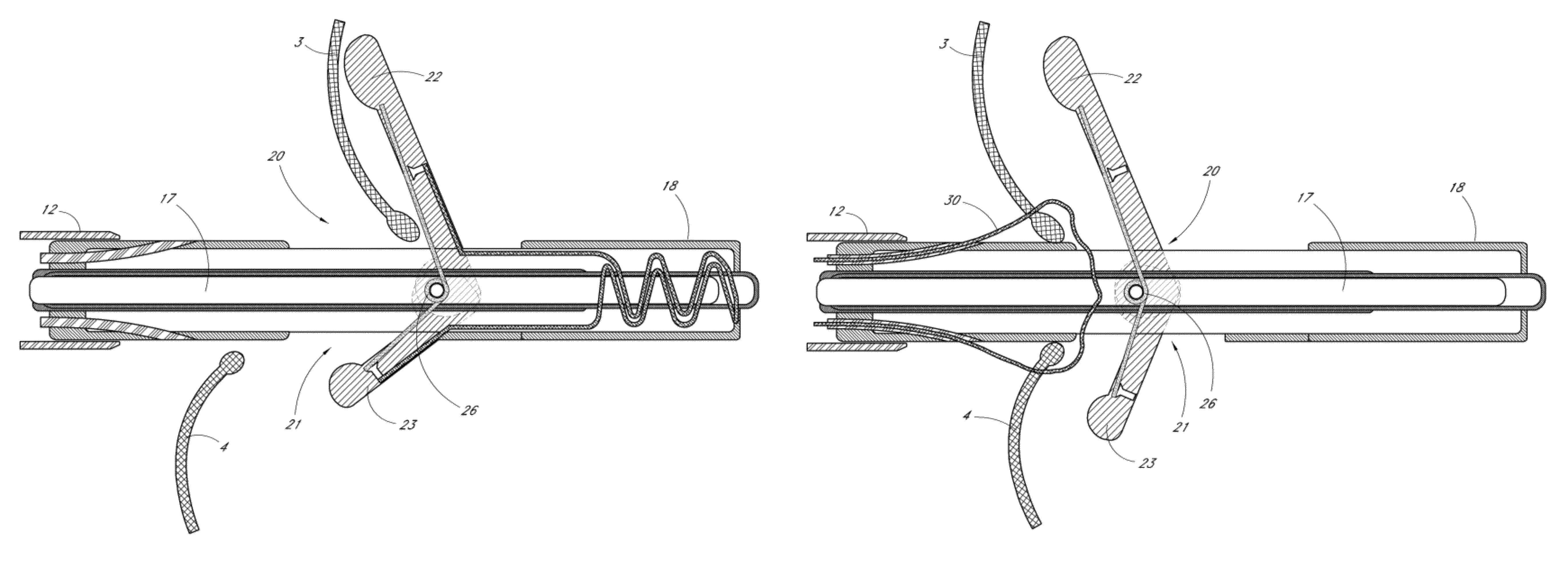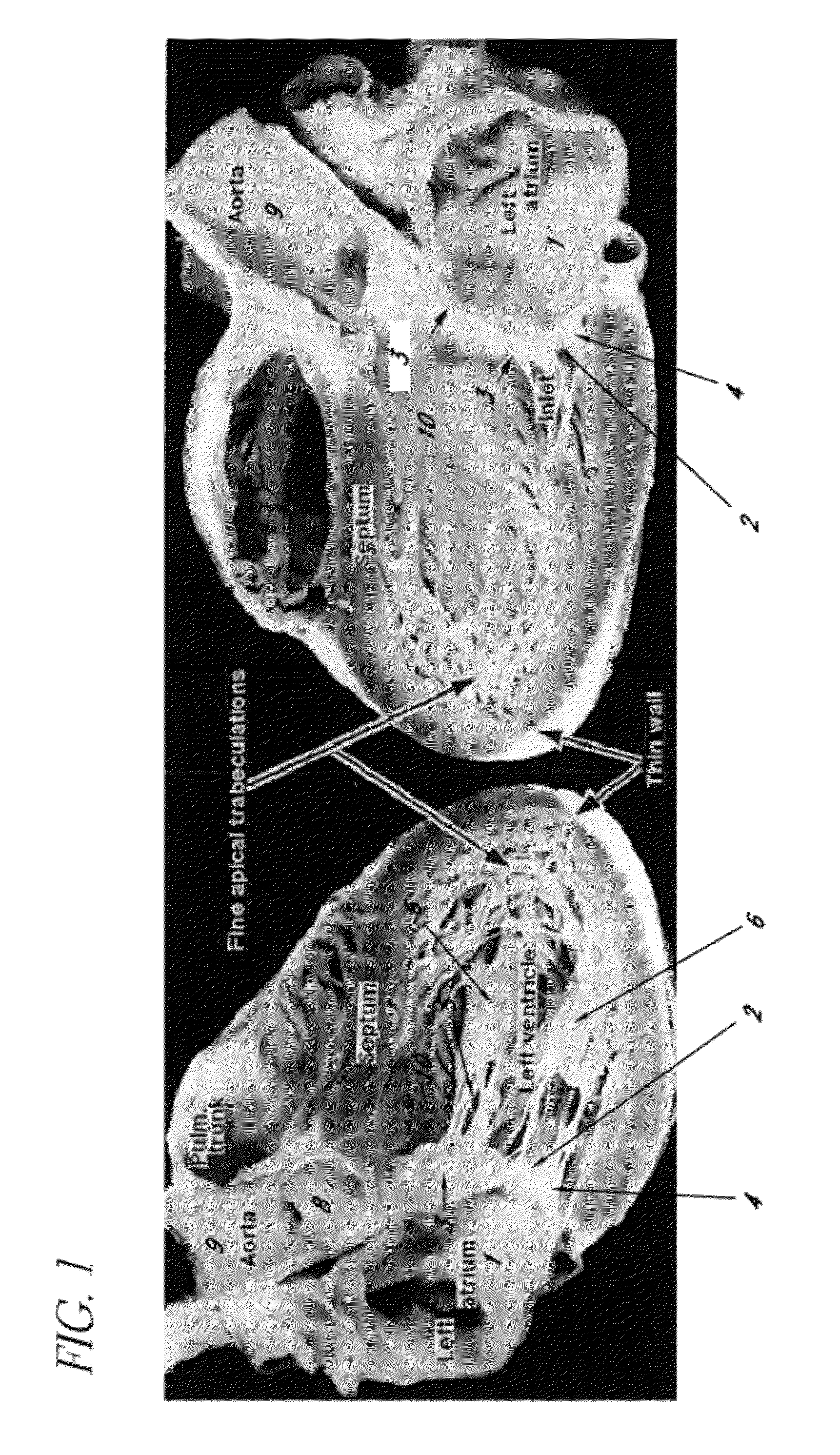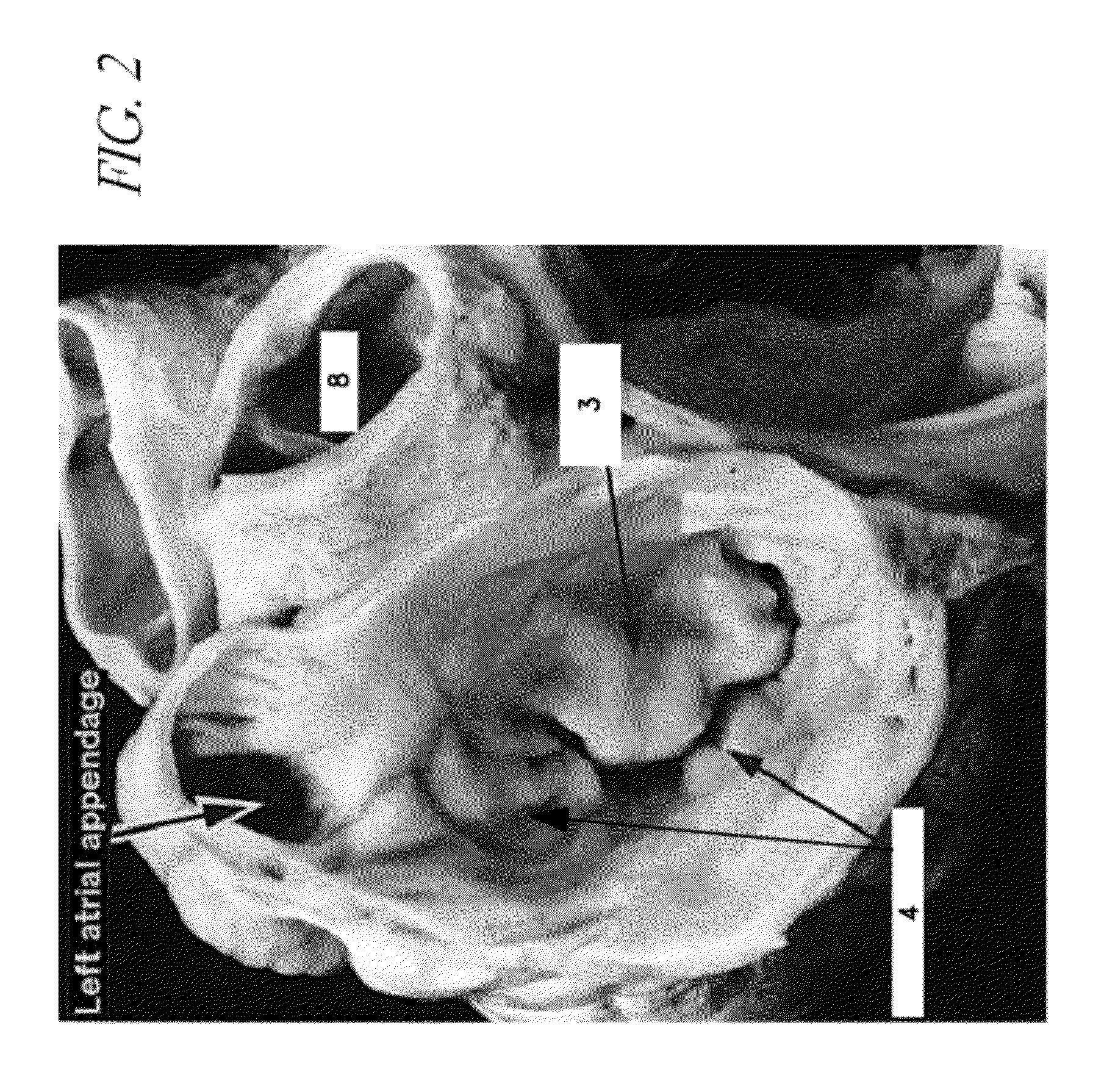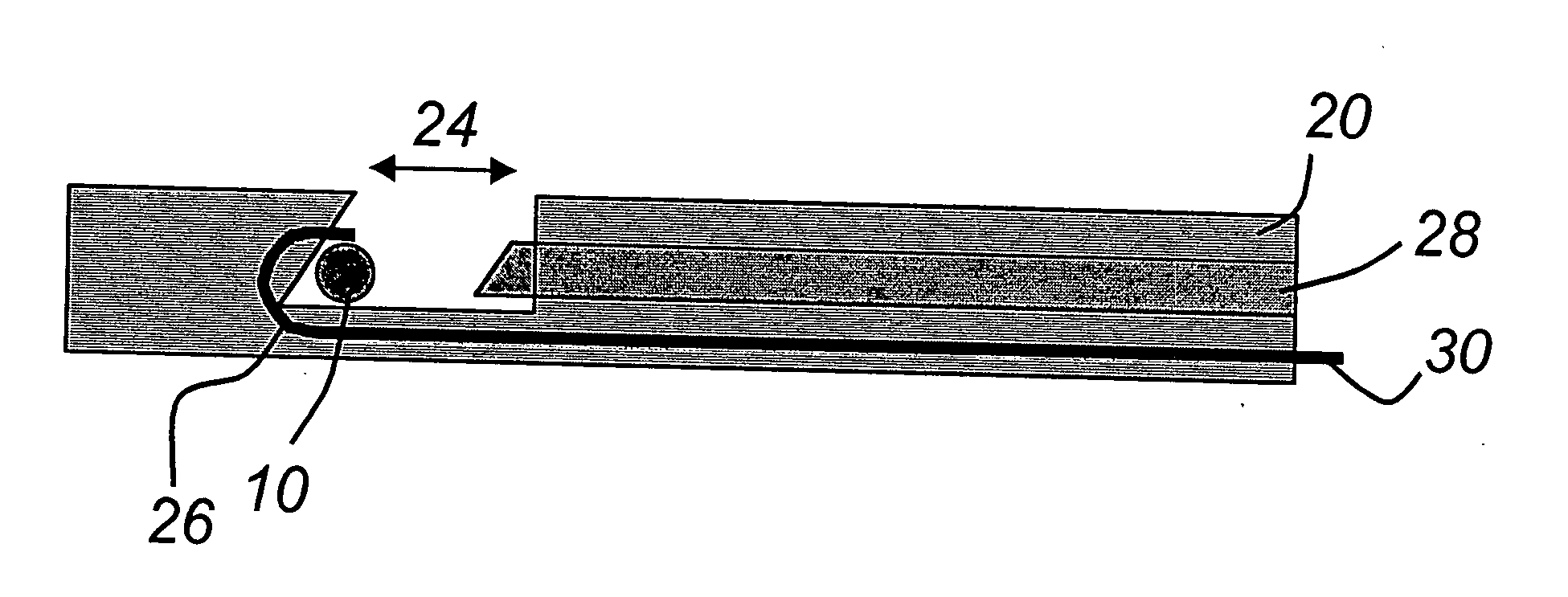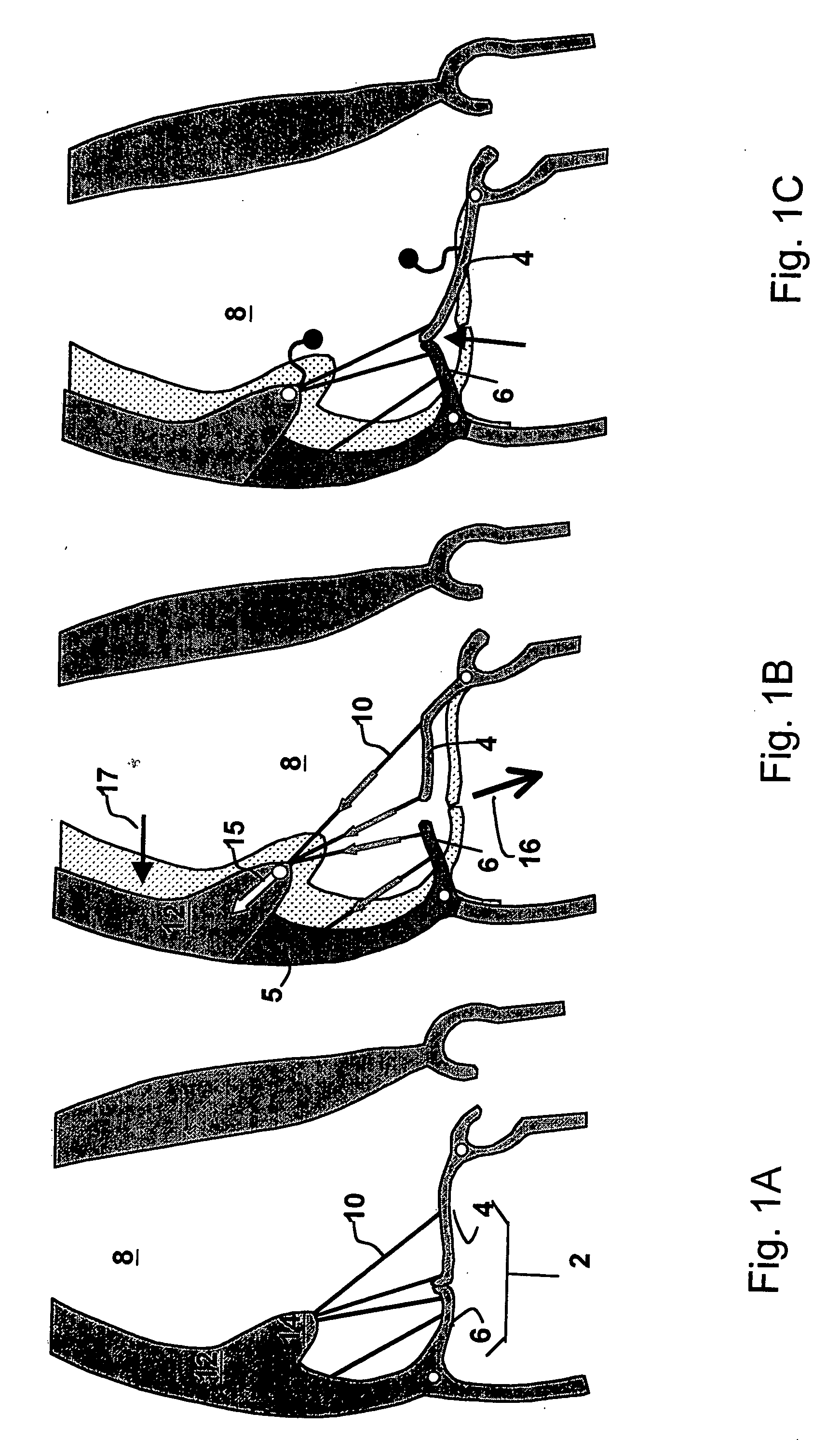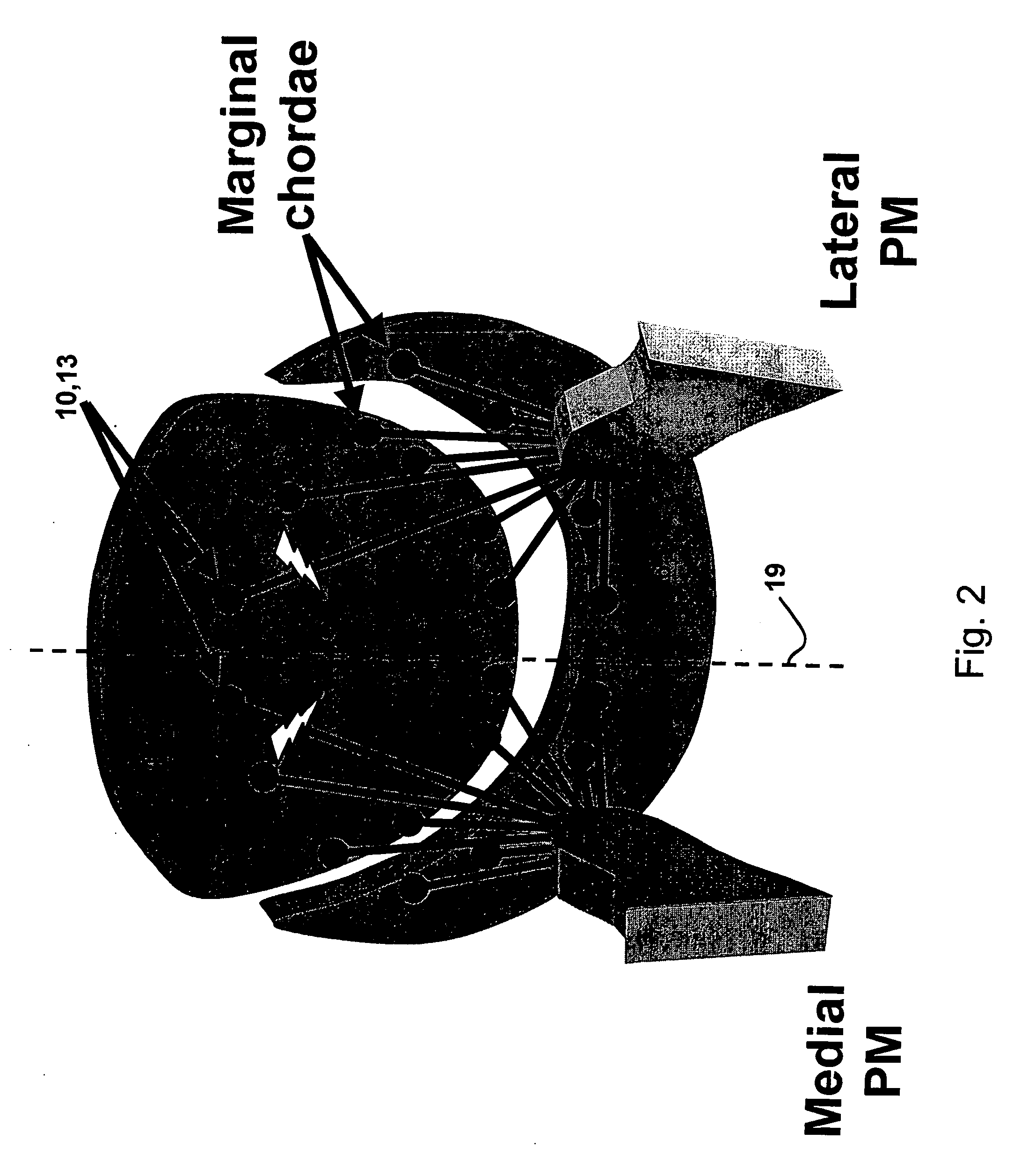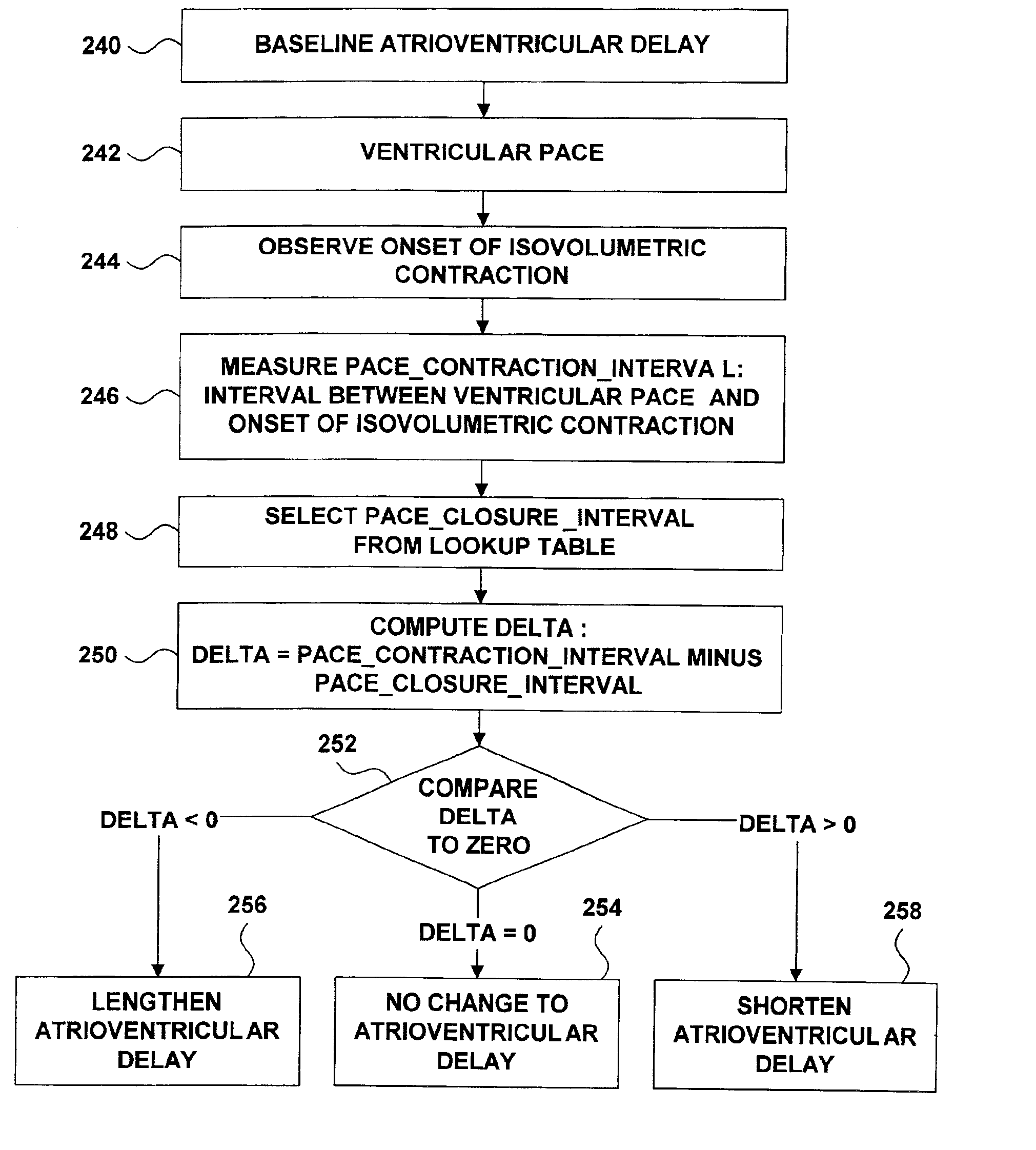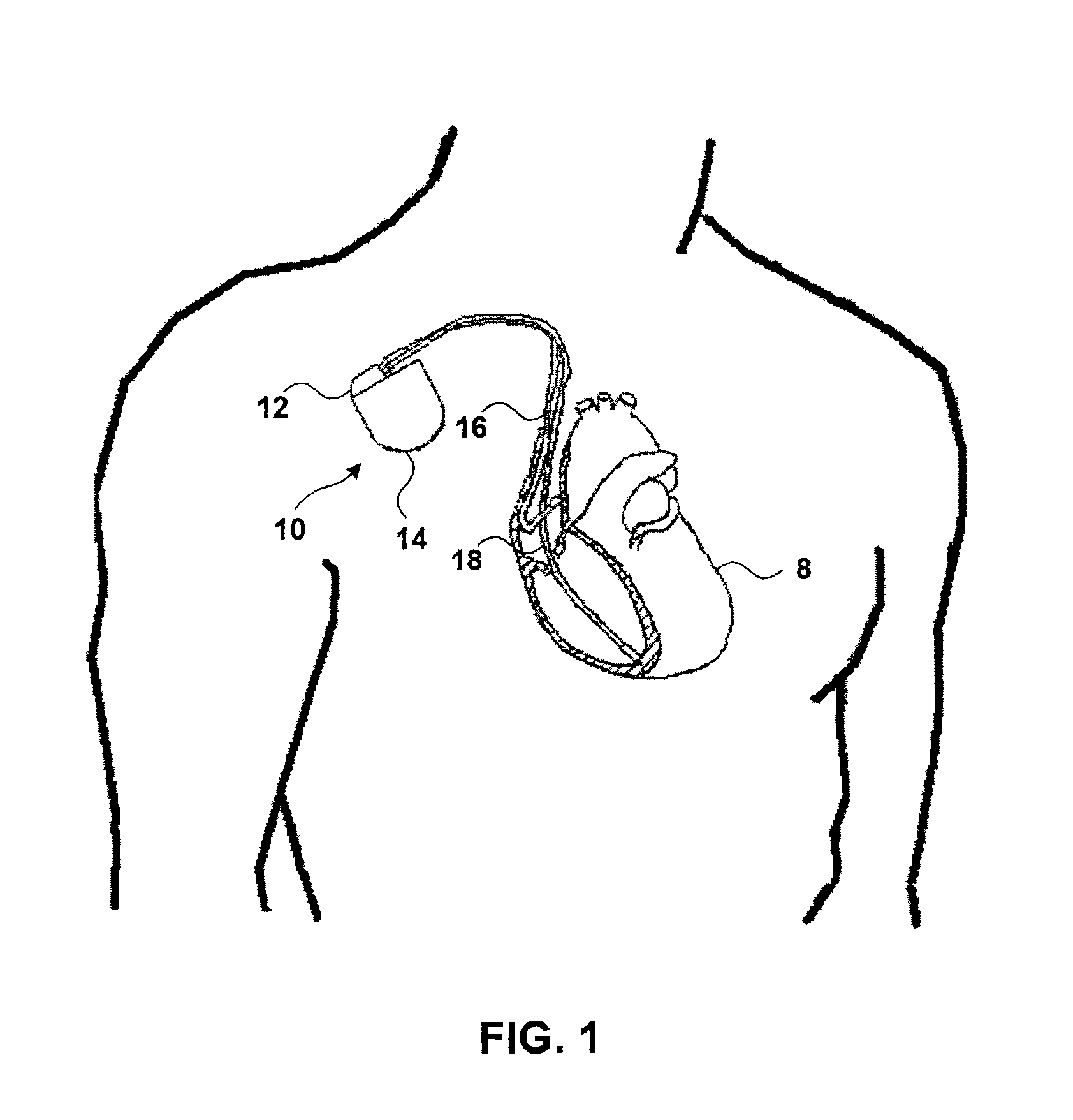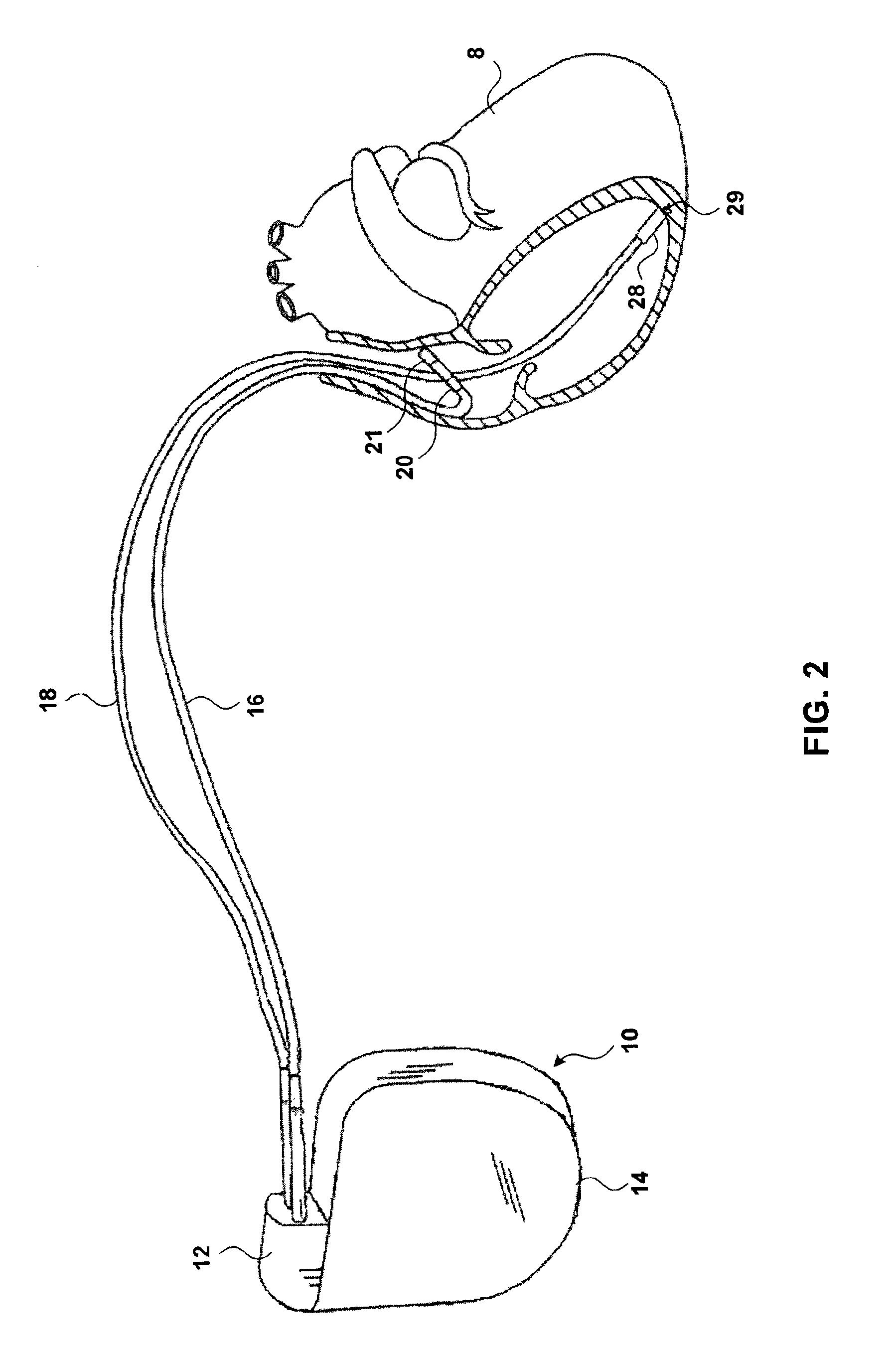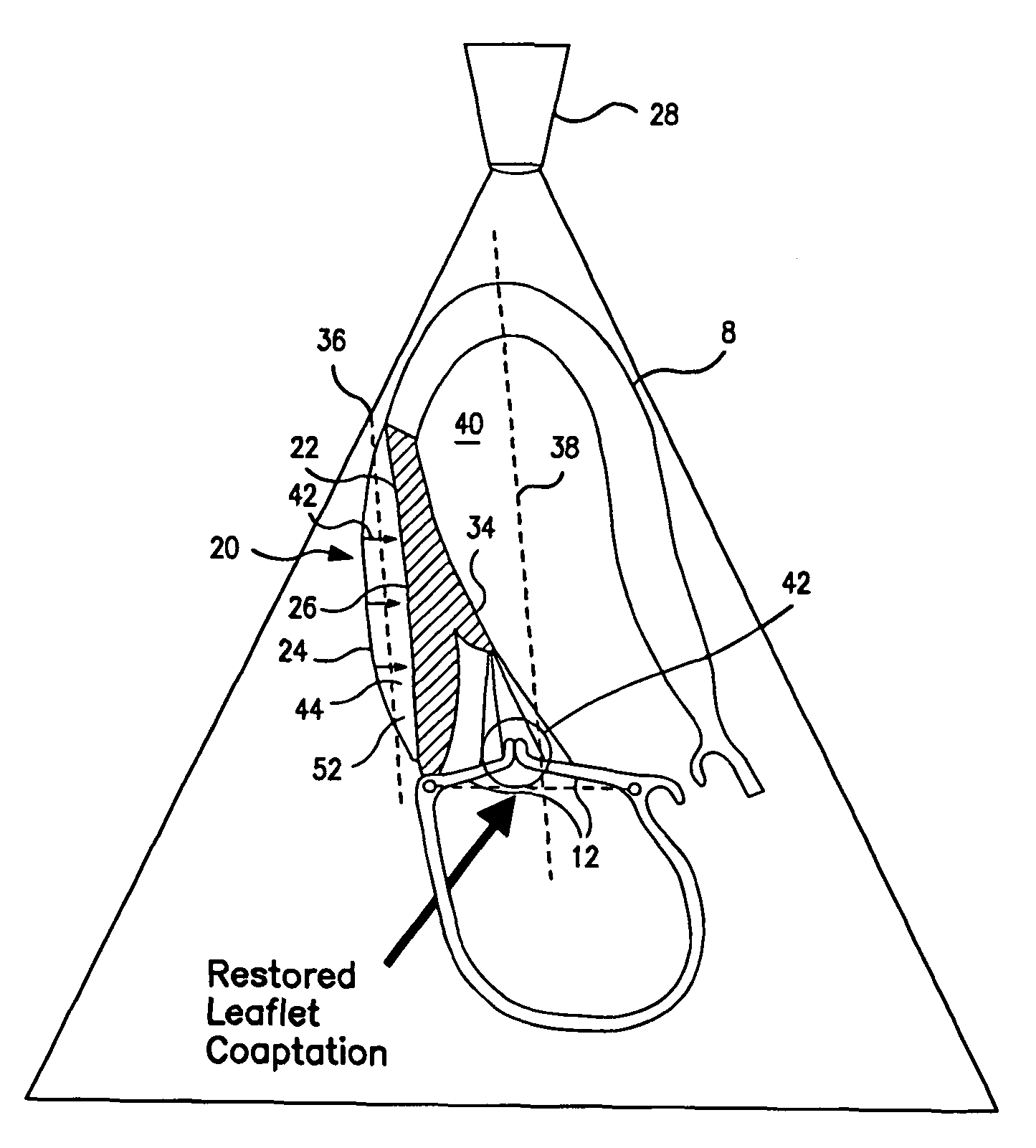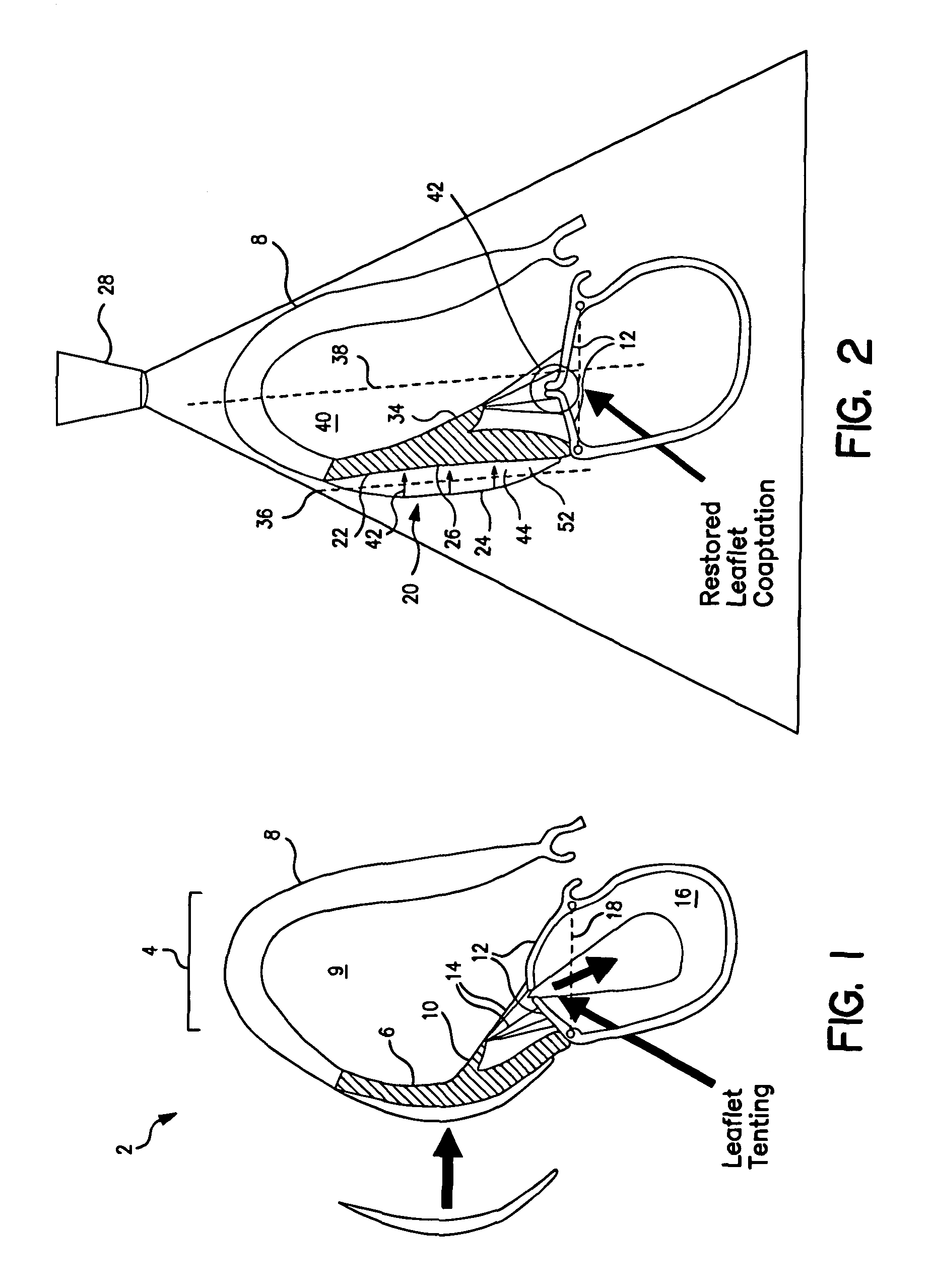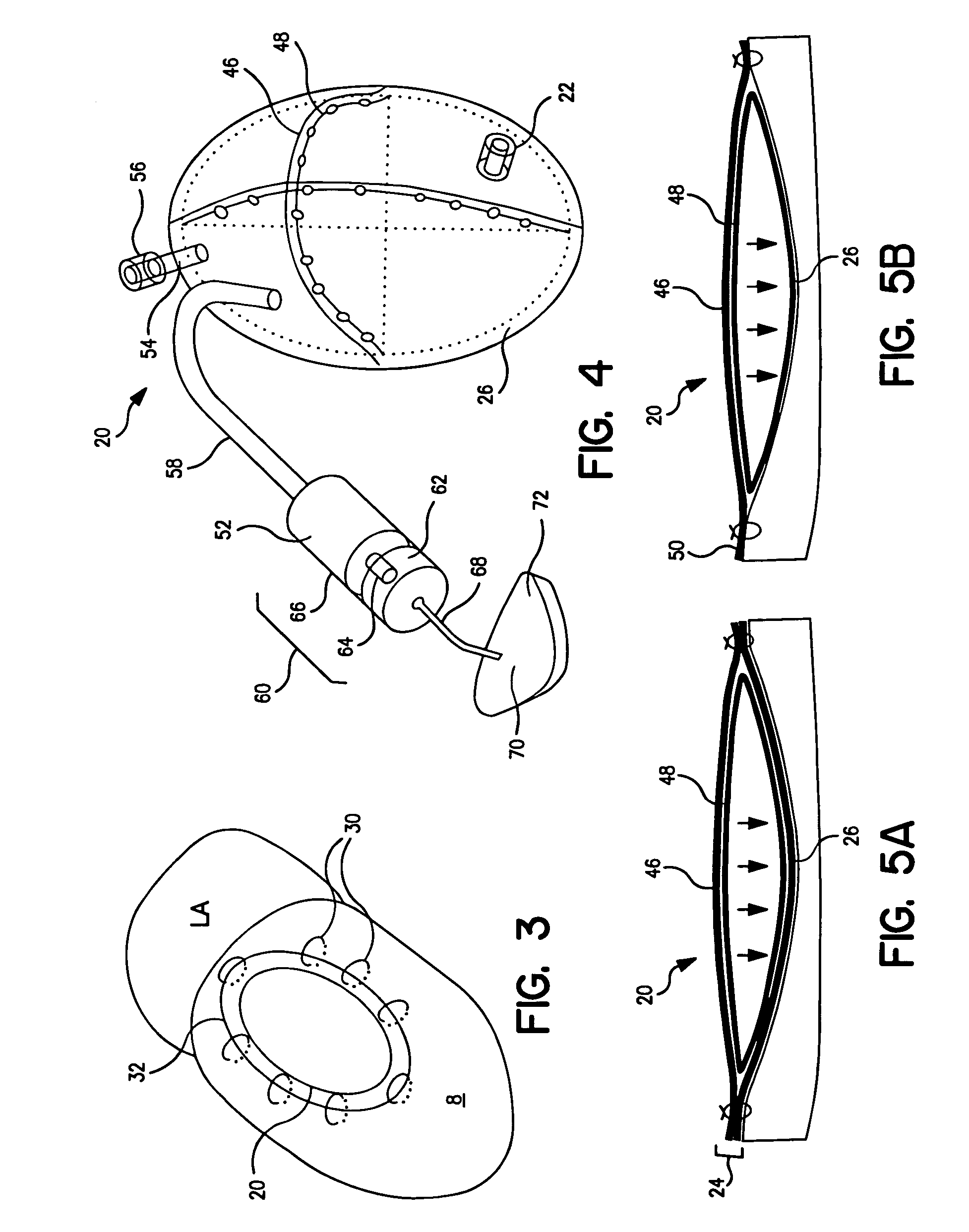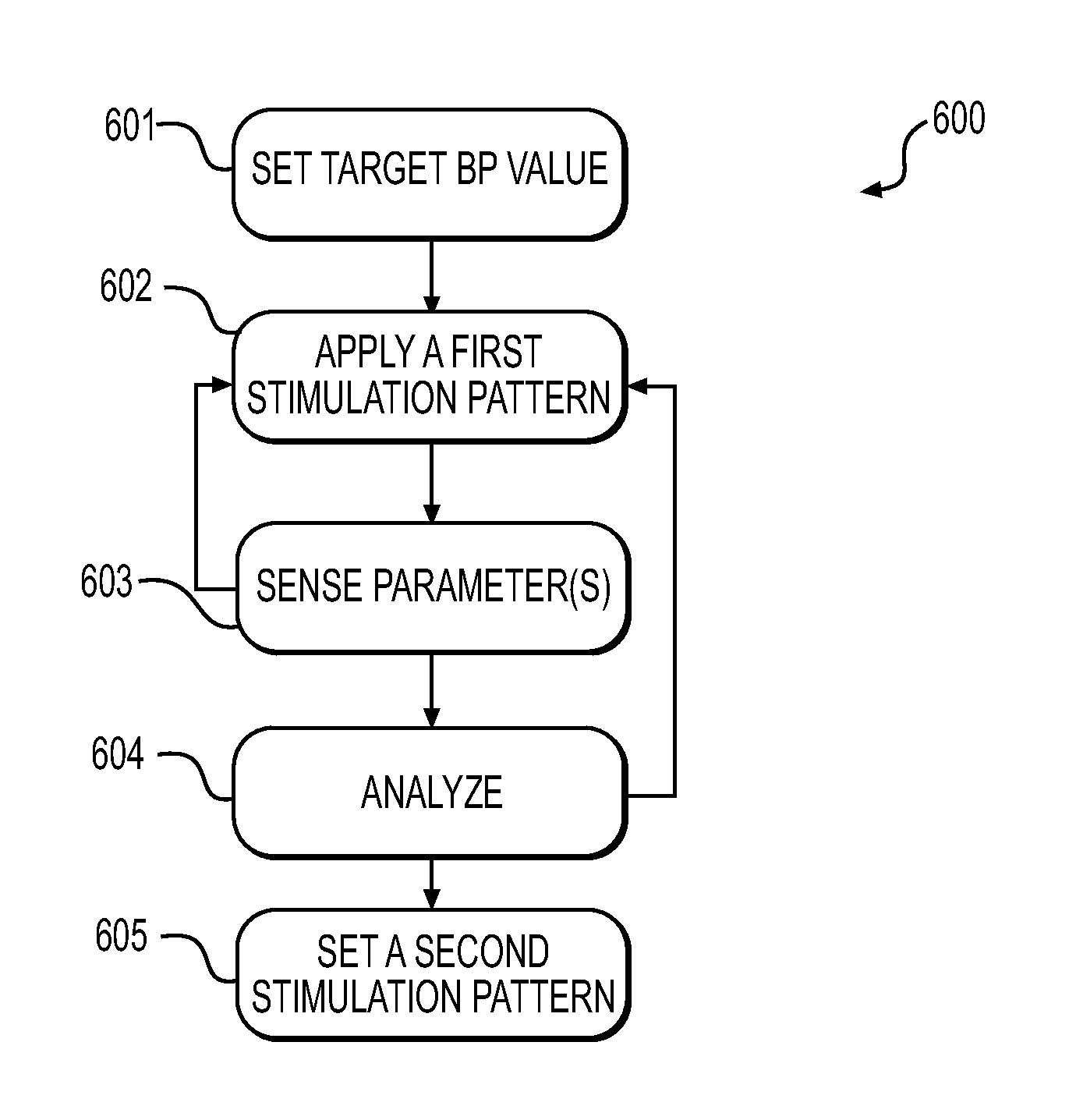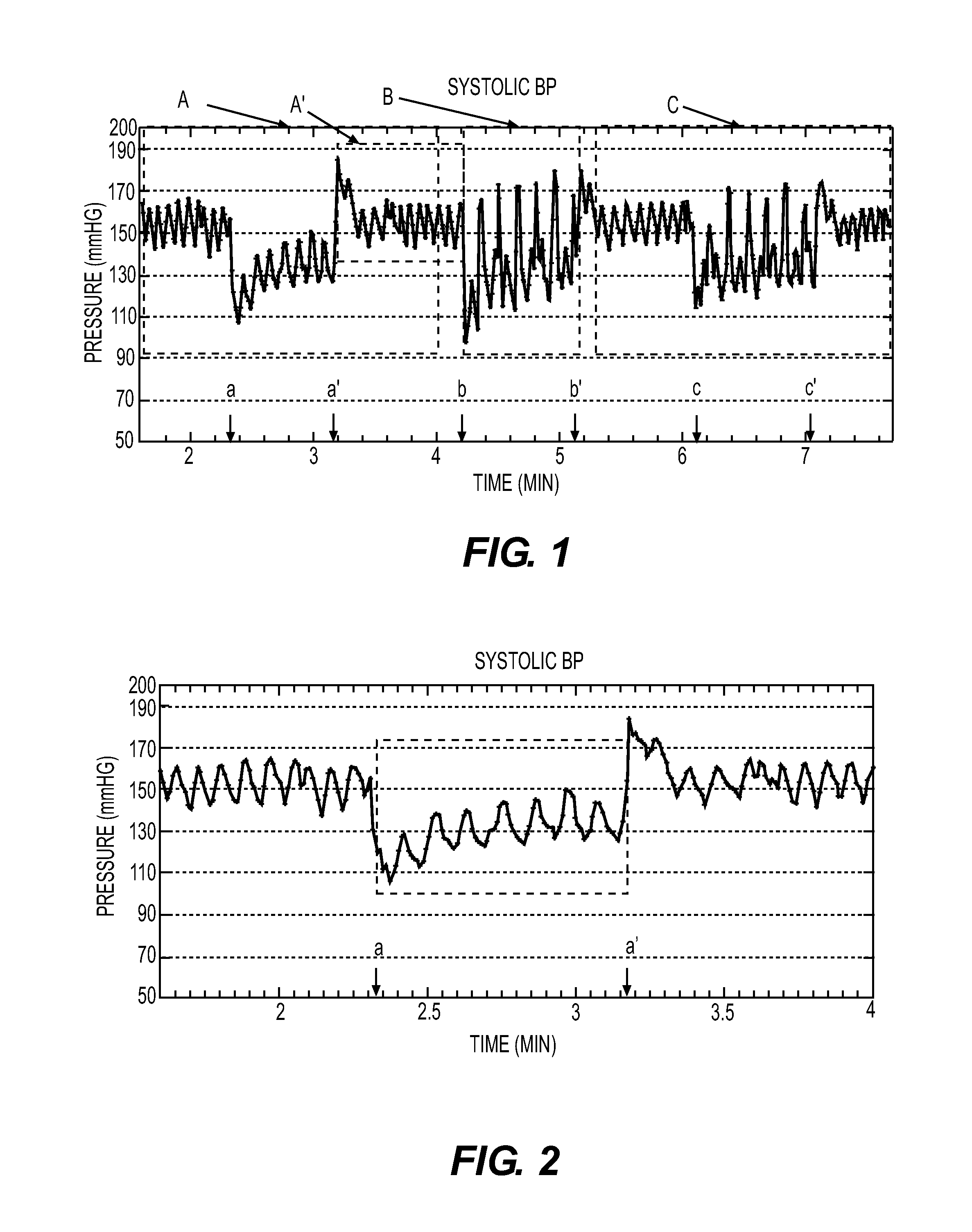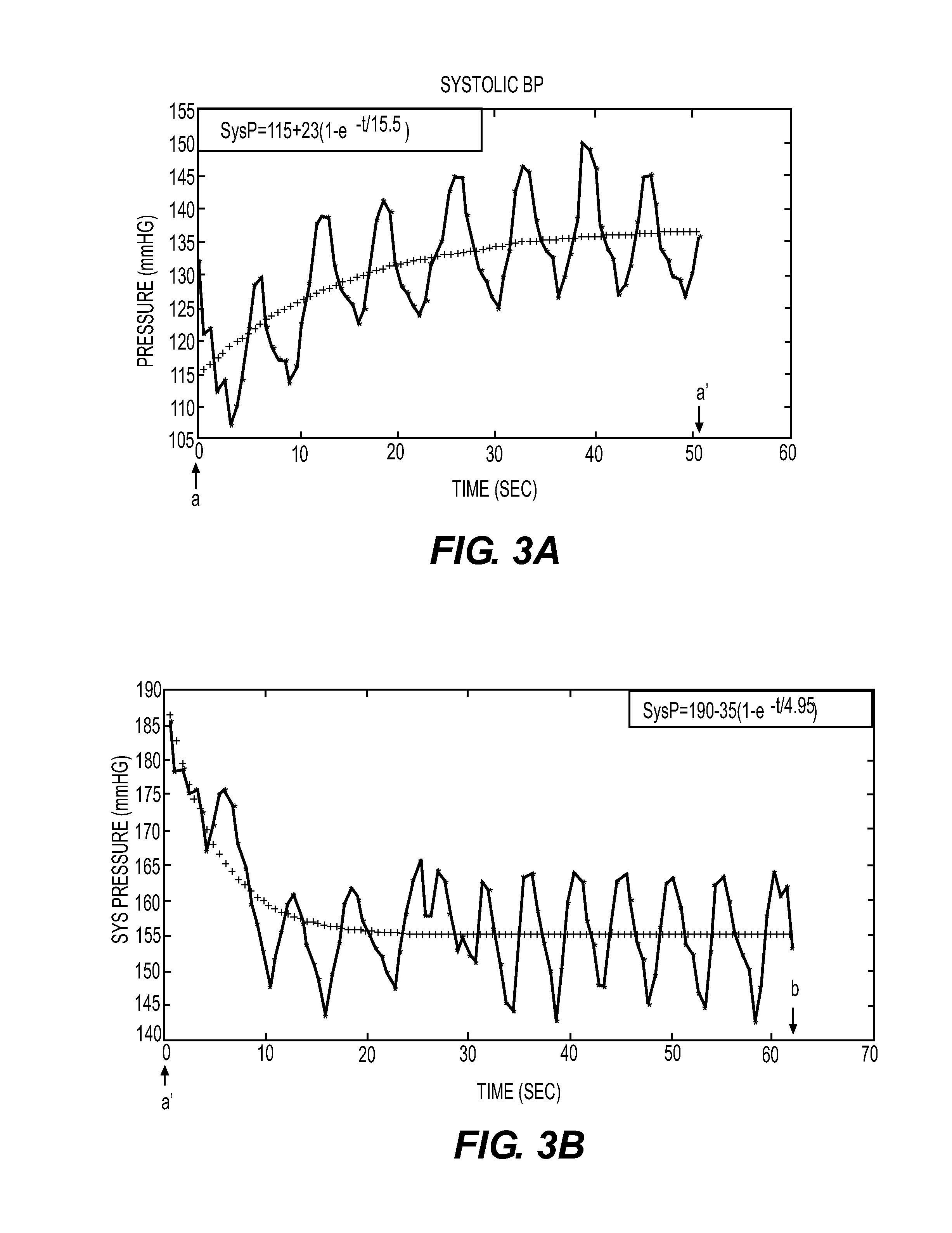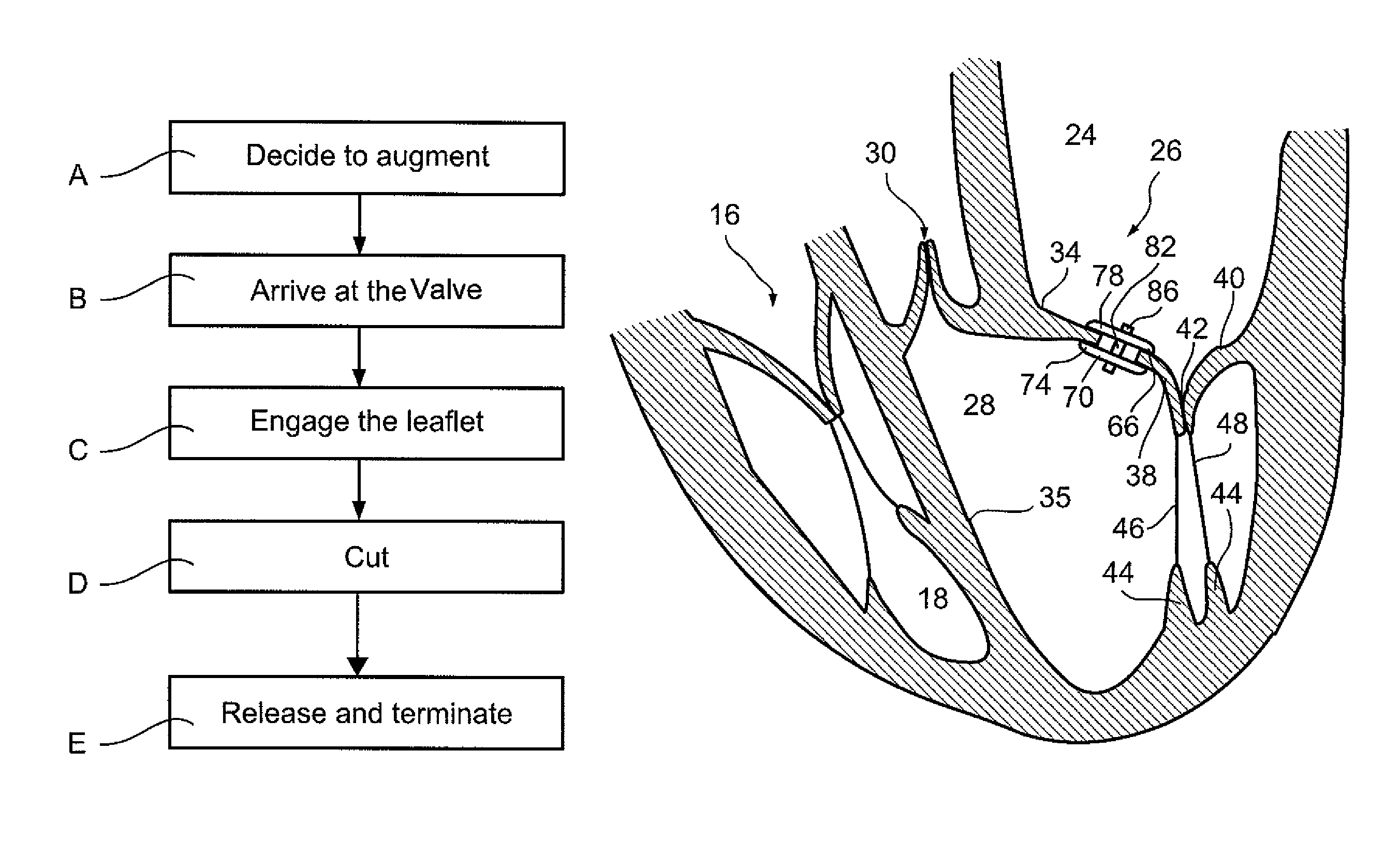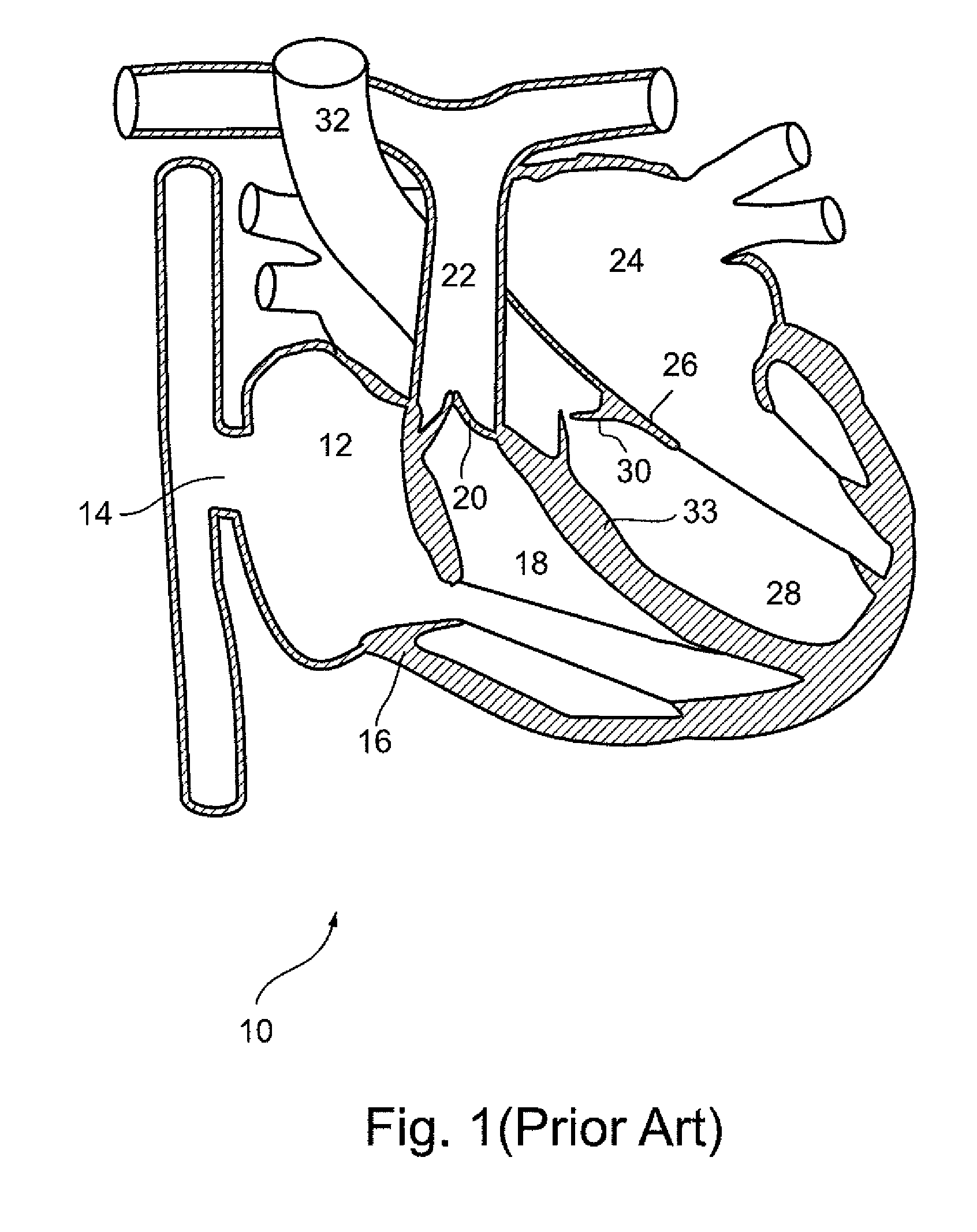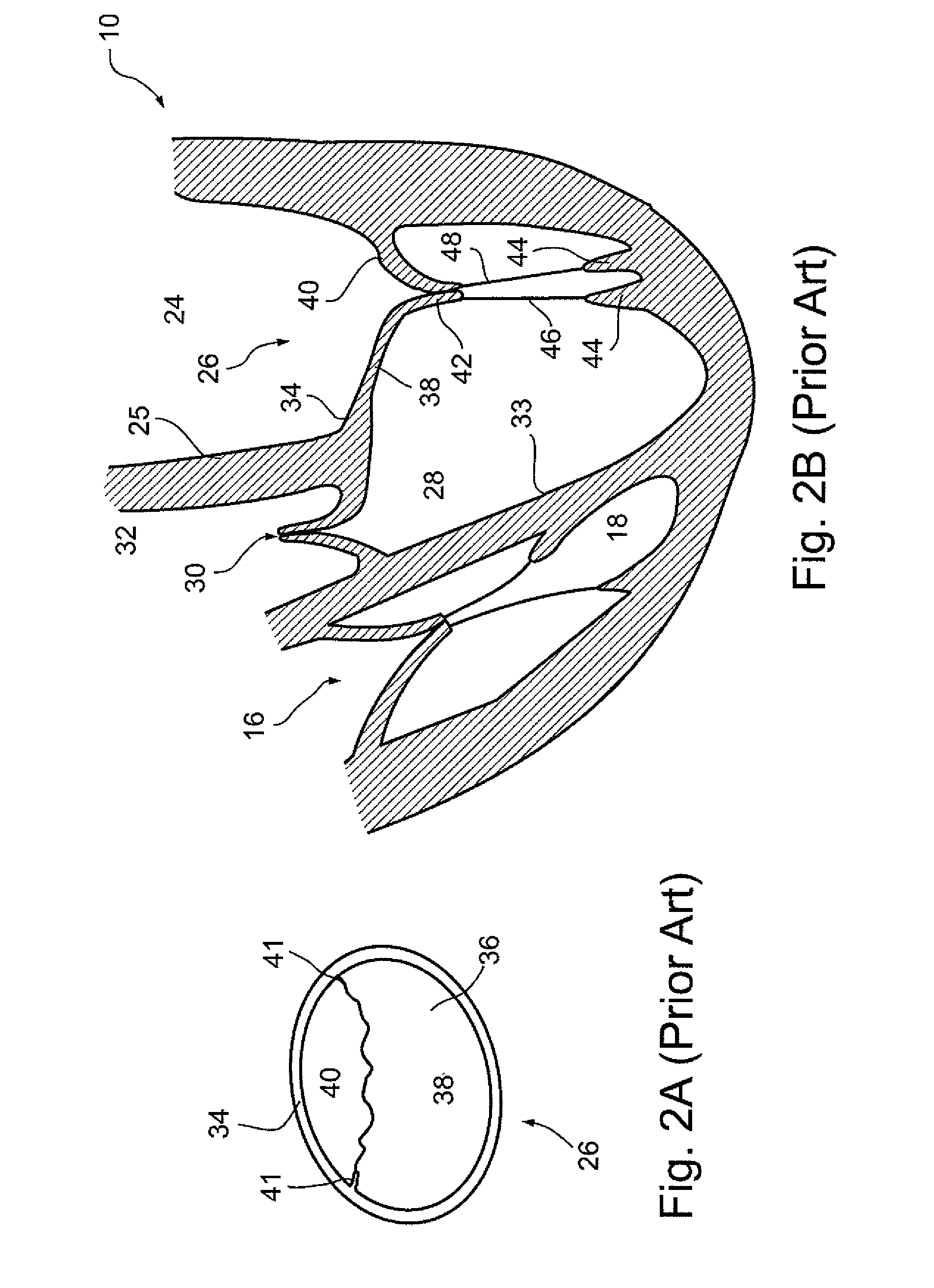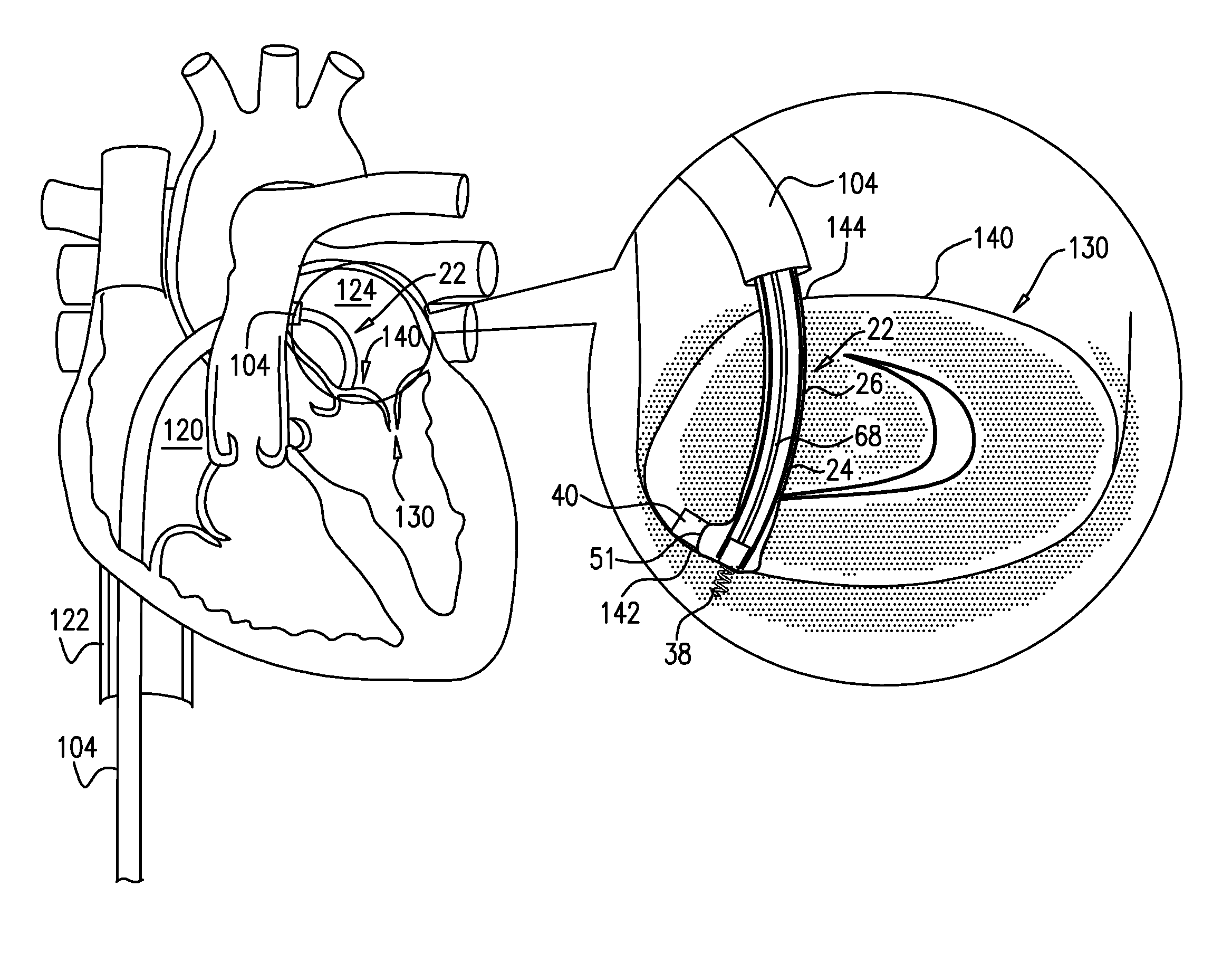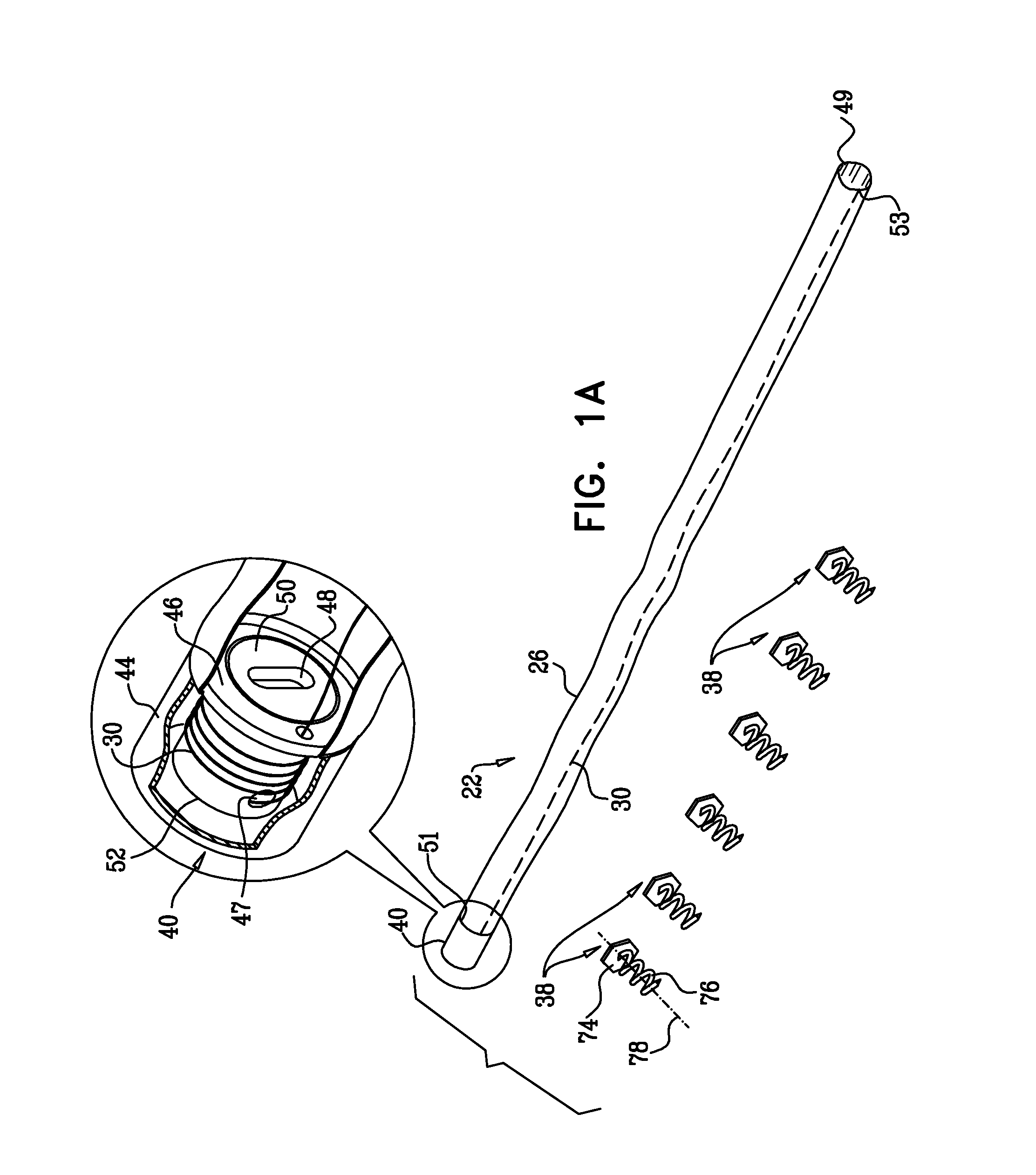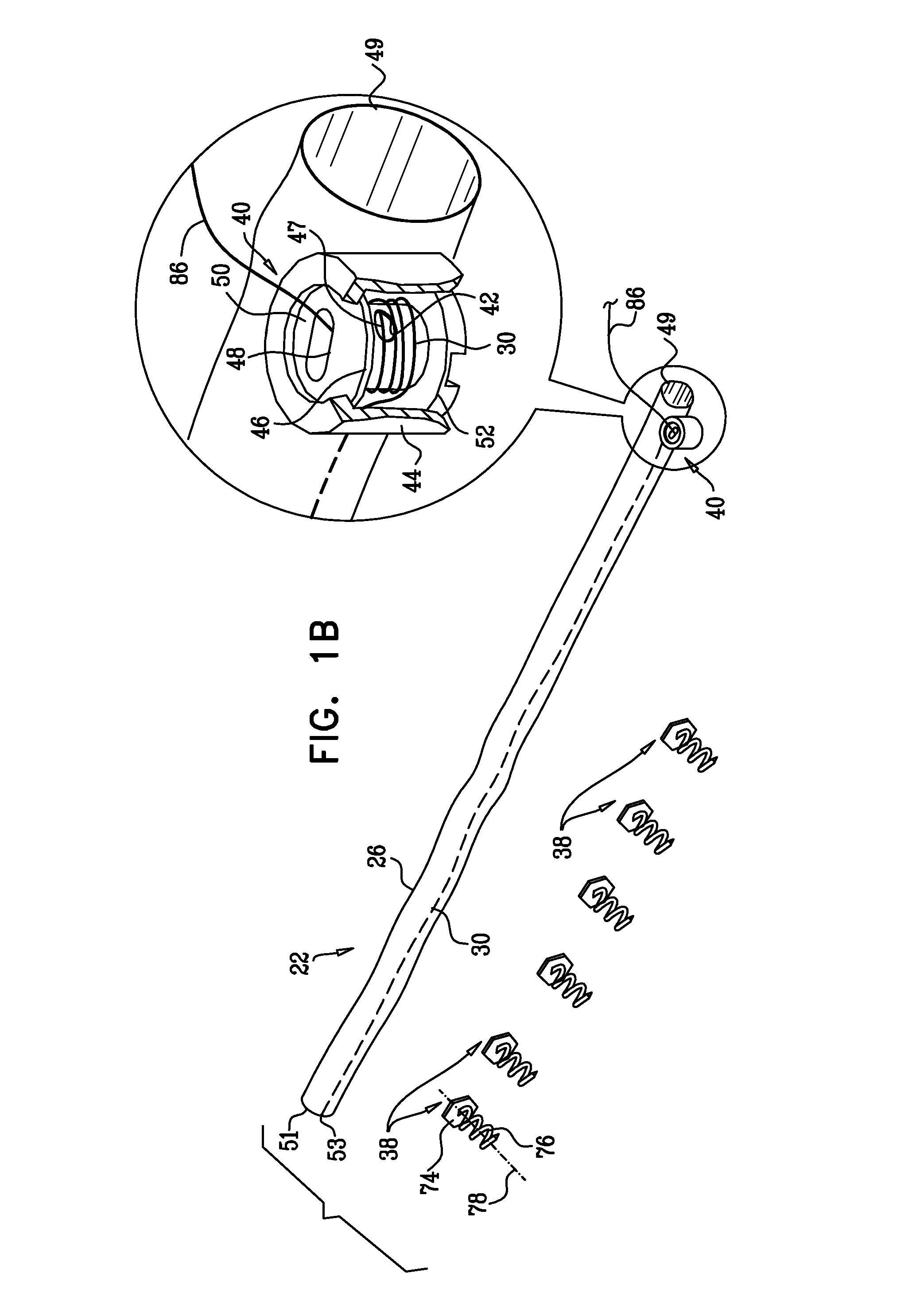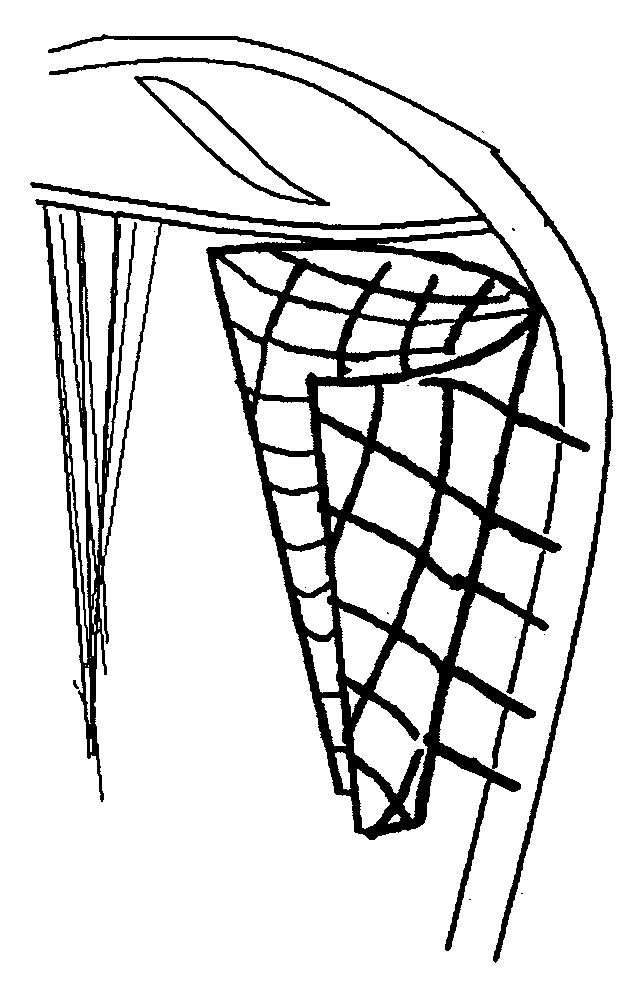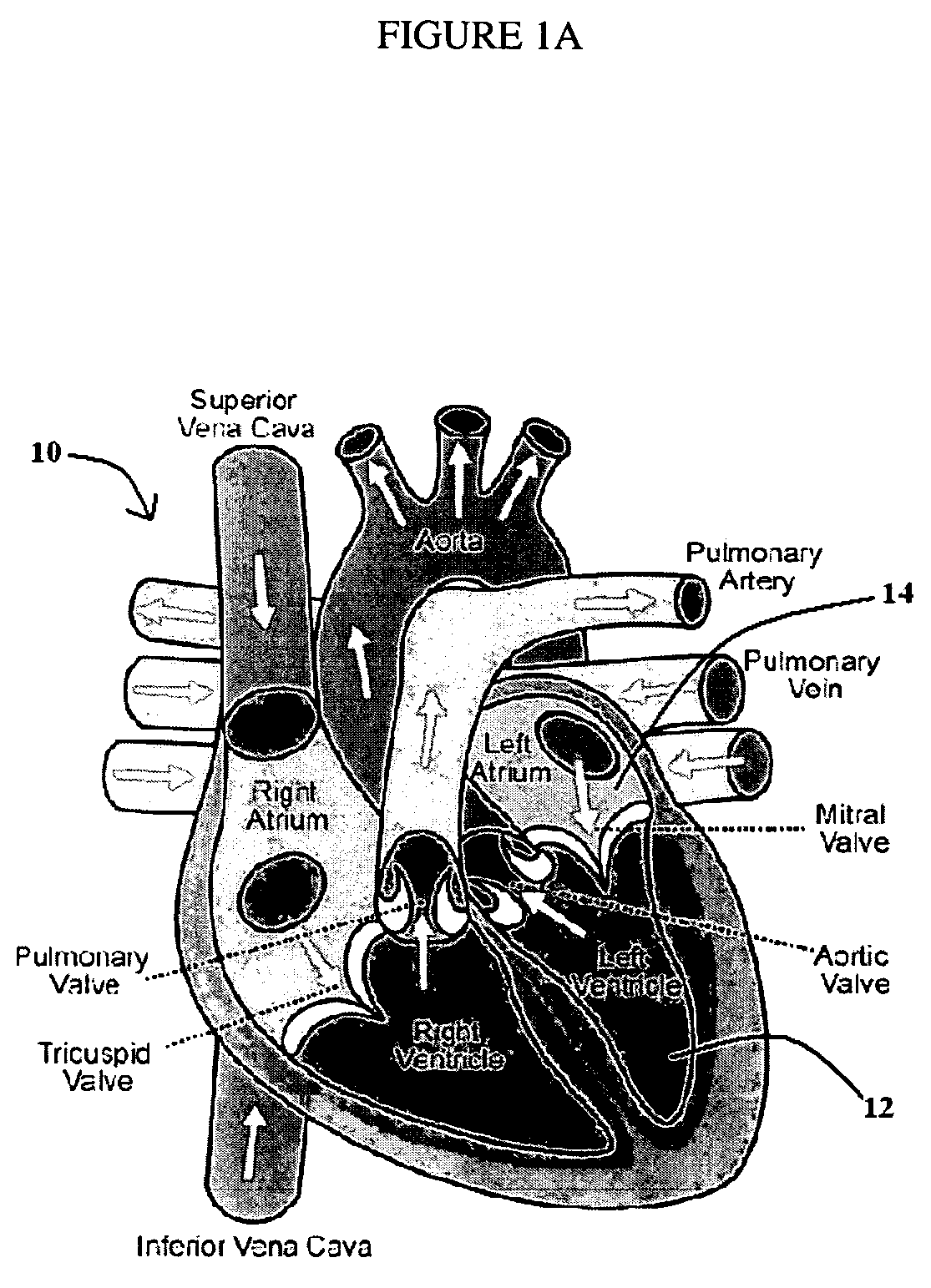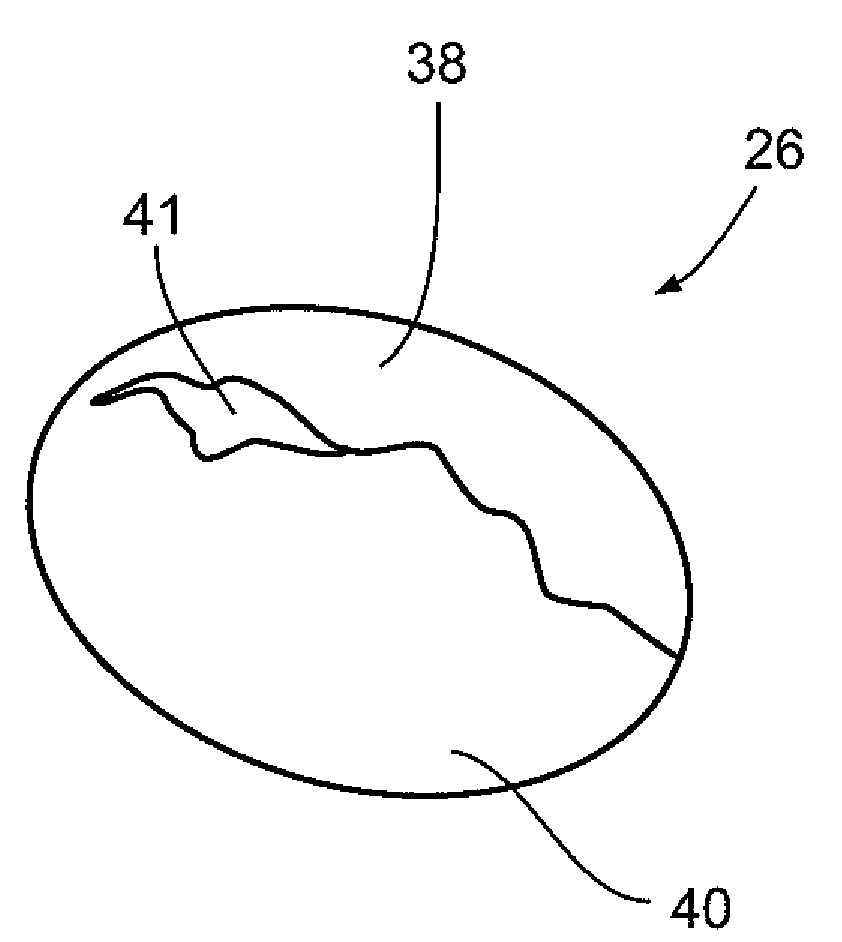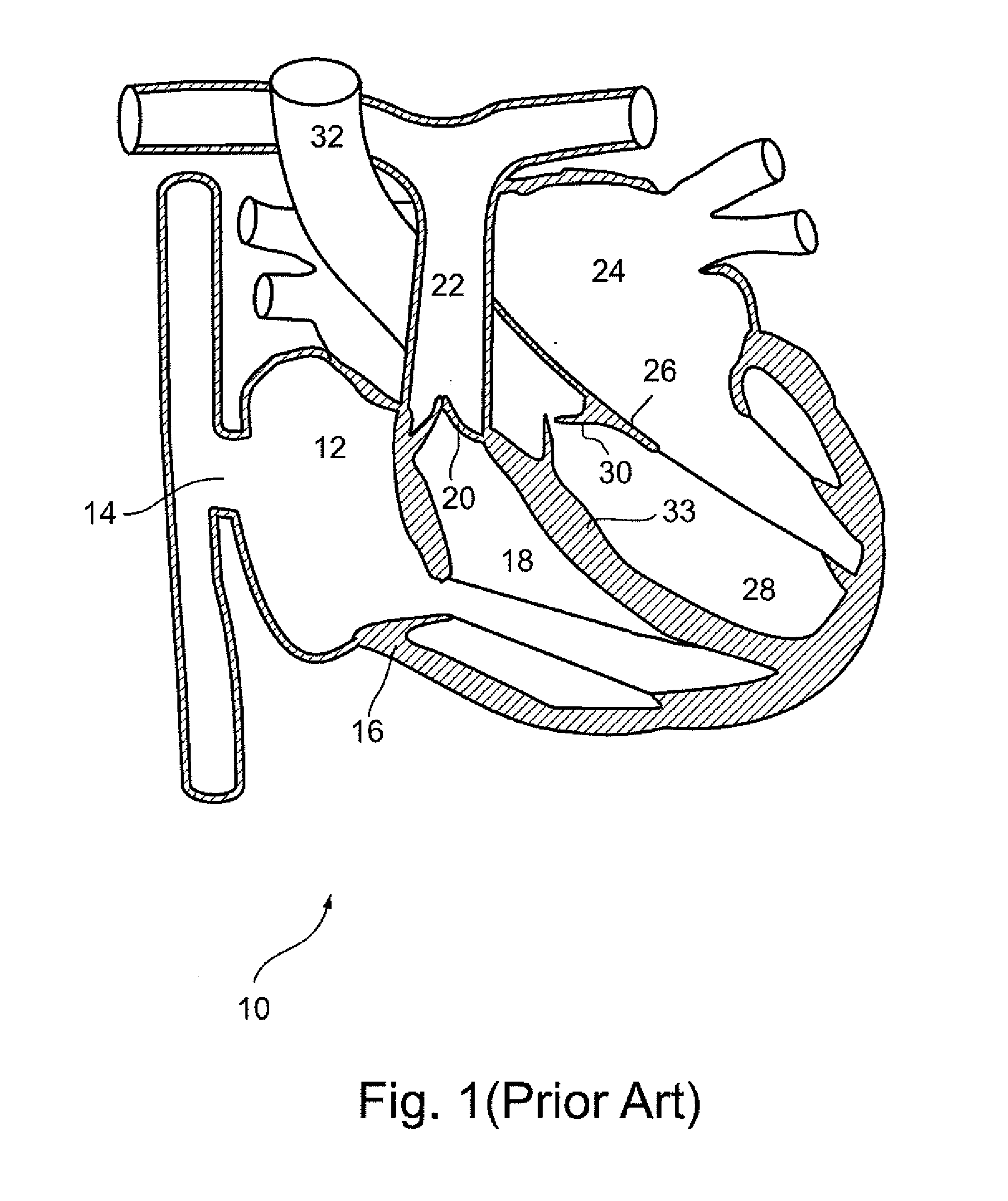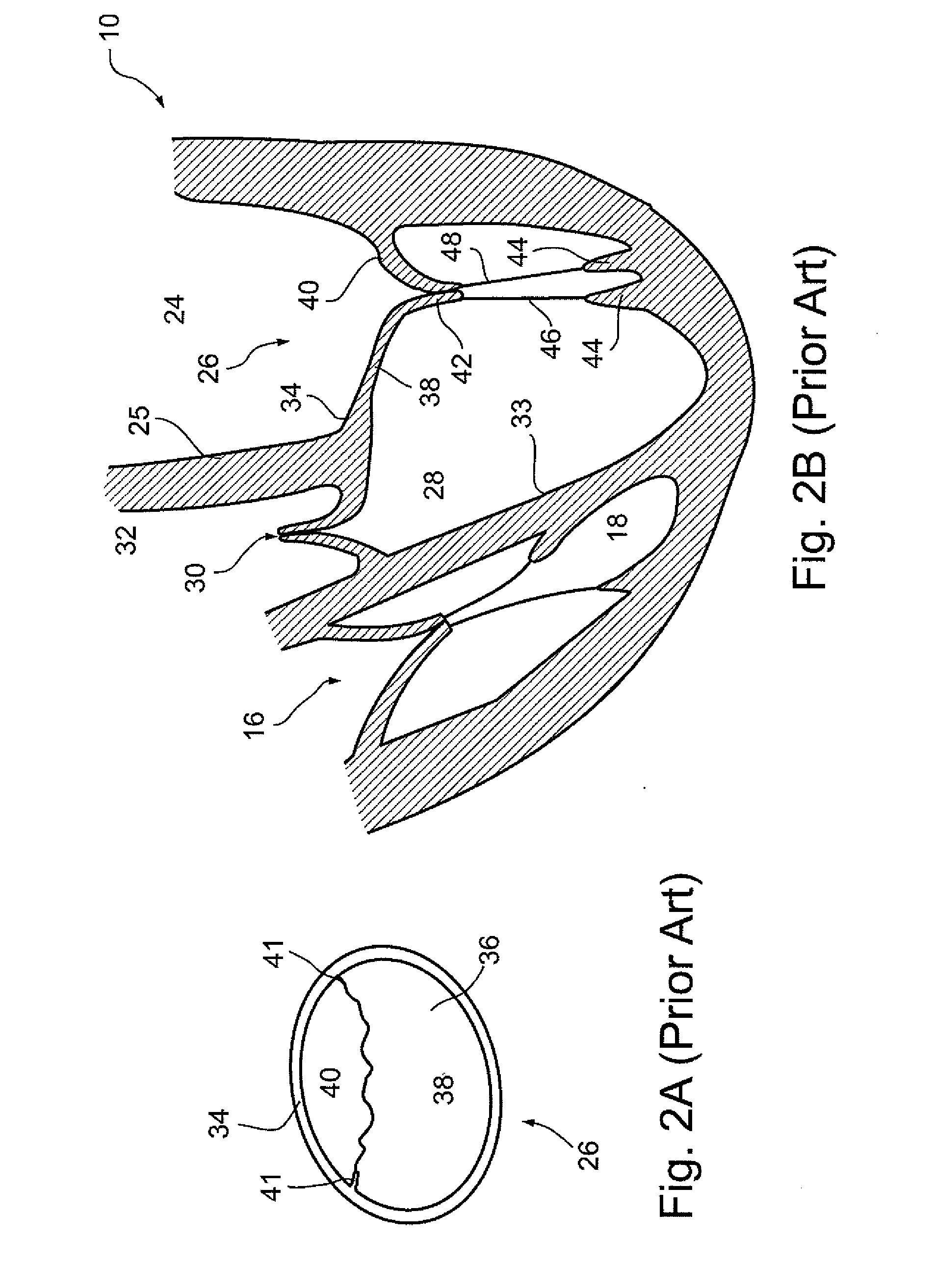Patents
Literature
88 results about "Atrioventricular valve" patented technology
Efficacy Topic
Property
Owner
Technical Advancement
Application Domain
Technology Topic
Technology Field Word
Patent Country/Region
Patent Type
Patent Status
Application Year
Inventor
The atrioventricular valves are located between the the atria and the ventricles of the heart. The atrioventricular valve between the left atrium and the left ventricle is called the bicuspid valve (also known as the mitral valve), and the atrioventricular valve between the right atrium and the right ventricle is called the tricuspid valve.
Methods and apparatus for cardiac valve repair
InactiveUS6629534B1Reduce leakageReduce regurgitationSuture equipmentsSurgical needlesHeart chamberPapillary muscle
The methods, devices, and systems are provided for performing endovascular repair of atrioventricular and other cardiac valves in the heart. Regurgitation of an atrioventricular valve, particularly a mitral valve, can be repaired by modifying a tissue structure selected from the valve leaflets, the valve annulus, the valve chordae, and the papillary muscles. These structures may be modified by suturing, stapling, snaring, or shortening, using interventional tools which are introduced to a heart chamber. Preferably, the tissue structures will be temporarily modified prior to permanent modification. For example, opposed valve leaflets may be temporarily grasped and held into position prior to permanent attachment.
Owner:EVALVE
Prosthetic mitral valve with tissue anchors
Apparatus and methods are described including a prosthetic atrioventricular valve (10) for coupling to a native atrioventricular valve (12). The prosthetic valve includes a support frame (20) and a covering (22), which at least partially covers the support frame. The support frame and the covering are shaped so as to define a downstream skirt (24). A plurality of prosthetic leaflets (40) are coupled to at least one element selected from the group consisting of the support frame and the covering. An elongated anchoring member (152) is positioned around the downstream skirt in a subvalvular space (150), such that the anchoring member presses native leaflets (30) of the native valve against the downstream skirt, thereby anchoring the prosthetic valve to the native valve. Other applications are also described.
Owner:CARDIOVALVE LTD
Methods and apparatus for cardiac valve repair
ActiveUS20040030382A1Reduce leakageReduce regurgitationSuture equipmentsBone implantHeart chamberPapillary muscle
The methods, devices, and systems are provided for performing endovascular repair of atrioventricular and other cardiac valves in the heart. Regurgitation of an atrioventricular valve, particularly a mitral valve, can be repaired by modifying a tissue structure selected from the valve leaflets, the valve annulus, the valve chordae, and the papillary muscles. These structures may be modified by suturing, stapling, snaring, or shortening, using interventional tools which are introduced to a heart chamber. Preferably, the tissue structures will be temporarily modified prior to permanent modification. For example, opposed valve leaflets may be temporarily grasped and held into position prior to permanent attachment.
Owner:EVALVE
Device and method for treatment of atrioventricular regurgitation
InactiveUS7011669B2Easy to transformClosing of the atrioventricular valve is improvedAnnuloplasty ringsStaplesCatheterSurgery
A device and method for treatment of atrioventricular regurgitation comprises a suturing device. The suturing device is configured to be introducible, via blood vessels leading to the heart, to two leaflets of the atrioventricular valve between the atrium and a corresponding ventricle of the heart. The suturing device is configured for binding together the two leaflets along the free edges of the leaflets. A method of using the device includes inserting the suturing device into a catheter, introducing the catheter to the heart and positioning a distal end of the catheter close to two leaflets of an atrioventricular valve, capturing the free edges of the two leaflets with the suturing device in its open state, binding together the two leaflets by transition of the suturing device into its closed state, and retracting the catheter from the heart. As a result, the closing of the valve is improved.
Owner:EDWARDS LIFESCIENCES CORP
Prosthetic heart value
A tubular prosthetic semilunar or atrioventricular heart valve is formed by cutting flat, flexible leaflets according to a pattern. The valve is constructed by aligning the side edges of adjacent leaflets so that the leaflet inner faces engage each other, and then suturing the leaflets together with successive stitches along a fold line adjacent the side edges. The stitches are placed successively from a proximal in-flow end of each leaflet toward a distal out-flow end. During operation, when the leaflets open and close, the leaflets fold along the fold line. Distal tabs extend beyond the distal end of each leaflet. The successive stitches terminate proximal of the distal tab portion so that no locked stitches are placed along the distal portion of the fold line. The tab portions of adjacent leaflets are folded over each other and sewn together to form commissural attachment tabs. The commissural tabs provide commissural attachment points to accommodate sutures and the like in order to secure the tab to a vessel wall, if a semilunar valve, and papillary muscles and / or chordae tendineae if an atrioventricular valve.
Owner:MEDTRONIC 3F THERAPEUTICS
Prosthetic heart valve
A tubular prosthetic semilunar or atrioventricular heart valve is formed by cutting flat, flexible leaflets according to a pattern. The valve is constructed by aligning the side edges of adjacent leaflets so that the leaflet inner faces engage each other, and then suturing the leaflets together with successive stitches along a fold line adjacent the side edges. The stitches are placed successively from a proximal in-flow end of each leaflet toward a distal out-flow end. During operation, when the leaflets open and close, the leaflets fold along the fold line. Distal tabs extend beyond the distal end of each leaflet. The successive stitches terminate proximal of the distal tab portion so that no locked stitches are placed along the distal portion of the fold line. The tab portions of adjacent leaflets are folded over each other and sewn together to form commissural attachment tabs. The commissural tabs provide commissural attachment points to accommodate sutures and the like in order to secure the tab to a vessel wall, if a semilunar valve, and papillary muscles and / or chordae tendineae if an atrioventricular valve.
Owner:MEDTRONIC 3F THERAPEUTICS
Prosthetic heart value
InactiveUS6911043B2Increased durabilityImprove performanceHeart valvesBlood vesselsDistal portionProsthesis
A tubular prosthetic semilunar or atrioventricular heart valve is formed by cutting flat, flexible leaflets according to a pattern. The valve is constructed by aligning the side edges of adjacent leaflets so that the leaflet inner faces engage each other, and then suturing the leaflets together with successive stitches along a fold line adjacent the side edges. The stitches are placed successively from a proximal in-flow end of each leaflet toward a distal out-flow end. During operation, when the leaflets open and close, the leaflets fold along the fold line. Distal tabs extend beyond the distal end of each leaflet. The successive stitches terminate proximal of the distal tab portion so that no locked stitches are placed along the distal portion of the fold line. The tab portions of adjacent leaflets are folded over each other and sewn together to form commissural attachment tabs. The commissural tabs provide commissural attachment points to accommodate sutures and the like in order to secure the tab to a vessel wall, if a semilunar valve, and papillary muscles and / or chordae tendineae if an atrioventricular valve.
Owner:MEDTRONIC 3F THERAPEUTICS
Supportless atrioventricular heart valve and minimally invasive delivery systems thereof
A supportless atrioventricular valve intended for attaching to a circumferential valve ring and papillary muscles of a patient comprising a singular flexible membrane of tissue or synthetic biomaterial, wherein a minimally invasive delivery system is provided through a percutaneous intercostal penetration and a penetration at the cardiac wall into a left atrium of the heart.
Owner:MEDTRONIC 3F THERAPEUTICS
Prosthetic heart valve
InactiveUS7037333B2Increased durabilityImprove performanceHeart valvesBlood vesselsProsthetic valvePapillary muscle
A tubular prosthetic semilunar or atrioventricular heart valve is formed by cutting flat, flexible leaflets according to a pattern. The valve is constructed by aligning the side edges of adjacent leaflets so that the leaflet inner faces engage each other, and then suturing the leaflets together with successive stitches along a fold line adjacent the side edges. The stitches are placed successively from a proximal in-flow end of each leaflet toward a distal out-flow end. During operation, when the leaflets open and close, the leaflets fold along the fold line. Distal tabs extend beyond the distal end of each leaflet. The successive stitches terminate proximal of the distal tab portion so that no locked stitches are placed along the distal portion of the fold line. The tab portions of adjacent leaflets are folded over each other and sewn together to form commissural attachment tabs. The commissural tabs provide commissural attachment points to accommodate sutures and the like in order to secure the tab to a vessel wall, if a semilunar valve, and papillary muscles and / or chordae tendineae if an atrioventricular valve.
Owner:MEDTRONIC 3F THERAPEUTICS
Methods and apparatus for atrioventricular valve repair
ActiveUS20070118154A1Improve leakageFacilitate reducing leakageSuture equipmentsHeart valvesPapillary muscleRepair method
Methods and apparatus for use in repairing an atrioventricular valve in a patient are provided. The methods comprise accessing the patient's atrioventricular valve percutaneously, securing a fastening mechanism to a valve leaflet, and coupling the valve leaflet, while the patient's heart remains beating, to at least one of a ventricular wall adjacent the atrioventricular valve, a papillary muscle, at least one valve chordae, and a valve annulus to facilitate reducing leakage through the valve.
Owner:CRABTREE TRAVES DEAN
Percutaneous atrioventricular valve and method of use
An apparatus for percutaneously replacing a diseased cardiac valve includes an expandable support member for positioning in an atrial chamber. The expandable support member includes at least one anchoring portion for anchoring in at least one opening that extends from the atrial chamber and a main body portion located adjacent the at least one anchoring portion. The main body portion has a cage-like structure and is adapted to conform to a size and shape of the atrial chamber. An expandable ring is selectively connected to the main body portion. The expandable ring is adapted to engage an annulus of the diseased cardiac valve. A prosthetic valve is attached to the expandable ring. The prosthetic valve is adapted to replace the diseased cardiac valve. A method for percutaneously replacing a diseased cardiac valve is also described.
Owner:THE CLEVELAND CLINIC FOUND
Adjustable artificial chordeae tendineae with suture loops
ActiveUS8790394B2Easy to implantGuaranteed functionSuture equipmentsHeart valvesDistal portionPlantaris tendon
Apparatus is provided, including an artificial-chordeae-tendineae-adjustment mechanism and at least one primary artificial chordea tendinea coupled at a distal portion thereof to the artificial-chordeae-tendineae-adjustment mechanism. A degree of tension of the at least one primary artificial chordea tendinea is adjustable by the artificial-chordeae-tendineae-adjustment mechanism. One or more loops are coupled at a proximal portion of the at least one primary artificial chordea tendinea. The one or more loops are configured to facilitate suturing of the one or more loops to respective portions of a leaflet of an atrioventricular valve of a patient. Other applications are also described.
Owner:VALTECH CARDIO LTD
Systems for and methods of atrioventricular valve regurgitation and reversing ventricular remodeling
InactiveUS20060129025A1Improve leaflet coaptationKeep the pressureAdditive manufacturing apparatusAnnuloplasty ringsLeft Ventricle RemodelingAtrioventricular valves
Methods of and devices for restoring the normal geometry of a heart, including but not limited to the structures supporting the atrioventricular valves. The techniques and devices described herein operate on the principle of displacement, both active and passive, to reverse cardiac remodeling and limit ischemic atrioventricular valve regurgitation.
Owner:THE GENERAL HOSPITAL CORP
Percutaneous atrioventricular valve and method of use
Owner:THE CLEVELAND CLINIC FOUND
Axially-shortening prosthetic valve
Owner:CARDIOVALVE LTD
Implantation of repair chords in the heart
ActiveUS20100280603A1Easy to implantReduce distanceSuture equipmentsHeart valvesSurgeryAtrioventricular valves
A method is provided, including advancing a distal end of an inner shall of a delivery tool between leaflets of an atrioventricular valve, of a patient and into a ventricle of the patient. The method further includes, while maintaining the distal end of the inner shaft in place and within the ventricle, proximally withdrawing a surrounding shaft of the delivery tool with respect to the distal end of the inner shaft and toward the leaflets. This surrounding shaft surrounds a portion of the inner shaft. The method additionally includes using the surrounding shaft to engage at least one of the leaflets with at least one leaflet-engaging element. After engaging, the distal end of the inner shaft is proximally withdrawn from within the ventricle. Other applications are also described.
Owner:VALTECH CARDIO LTD
Device and a method for treatment of atrioventricular regurgitation
InactiveUS20060064118A1Closing of the atrioventricular valve is improvedExpand closedAnnuloplasty ringsStaplesBlood vesselVALVE PORT
Owner:EDWARDS LIFESCIENCES CORP
Methods and apparatus for atrioventricular valve repair
ActiveUS8043368B2Improve leakageEasy to operateSuture equipmentsHeart valvesPapillary muscleRepair method
Methods and apparatus for use in repairing an atrioventricular valve in a patient are provided. The methods comprise accessing the patient's atrioventricular valve percutaneously, securing a fastening mechanism to a valve leaflet, and coupling the valve leaflet, while the patient's heart remains beating, to at least one of a ventricular wall adjacent the atrioventricular valve, a papillary muscle, at least one valve chordae, and a valve annulus to facilitate reducing leakage through the valve.
Owner:CRABTREE TRAVES DEAN
Cardiac devices and methods for percutaneous repair of atrioventricular valves
ActiveUS7559936B2Increase surface areaEffective applicationStaplesSurgical pincettesMitral valve leafletCardiac device
Novel apparatus and minimally invasive methods to treat The present invention provides methods and devices for grasping, stabilizing and fastening of cardiac valve leaflets to treat atrioventricular valve regurgitation, particularly mitral valve regurgitation, in the context of prolapse and / or flail mitral valve. Independent leaflet grasping elements provide the ability to reposition the leaflets for fastening and enough stability to prevent leaflet movement during fastening.
Owner:THE GENERAL HOSPITAL CORP
Adjustable artificial chordeae tendineae with suture loops
ActiveUS20110288635A1Easy to implantGuaranteed functionSuture equipmentsHeart valvesChordae tendineaeDistal portion
Apparatus is provided, including an artificial-chordeae-tendineae-adjustment mechanism and at least one primary artificial chordea tendinea coupled at a distal portion thereof to the artificial-chordeae-tendineae-adjustment mechanism. A degree of tension of the at least one primary artificial chordea tendinea is adjustable by the artificial-chordeae-tendineae-adjustment mechanism. One or more loops are coupled at a proximal portion of the at least one primary artificial chordea tendinea. The one or more loops are configured to facilitate suturing of the one or more loops to respective portions of a leaflet of an atrioventricular valve of a patient. Other applications are also described.
Owner:VALTECH CARDIO LTD
Cardiac devices and methods for minimally invasive repair of ischemic mitral regurgitation
ActiveUS8292884B2Eliminate bendingEffective closureIncision instrumentsDiagnosticsChordae tendineaeAtrial cavity
Novel apparatus and minimally invasive methods to treat atrioventricular valve regurgitation that is a result of tethering of chordae attaching atrioventricular valve leaflets to muscles of the heart, such as papillary muscles and muscles in the heart wall, thereby restricting the closure of the leaflets. Catheter embodiments for delivering and positioning chordal severing and elongating instruments are described.
Owner:THE GENERAL HOSPITAL CORP
Methods and apparatus for atrioventricular valve repair
ActiveUS8172856B2Easy to operateMaintain positionSuture equipmentsDiagnosticsHeart rightLeft ventricular size
Methods and devices are disclosed for minimally invasive procedures in the heart. In one application, a catheter is advanced from the left atrium through the mitral valve and along the left ventricular outflow tract to orient and stabilize the catheter and enable a procedure such as a “bow tie” repair of the mitral valve. Right heart procedures are also disclosed.
Owner:CEDARS SINAI MEDICAL CENT
Cardiac devices and methods for minimally invasive repair of ischemic mitral regurgitation
ActiveUS20060095025A1Eliminate bendingEffective closureIncision instrumentsHeart valvesChordae tendineaePapillary muscle
Novel apparatus and minimally invasive methods to treat atrioventricular valve regurgitation that is a result of tethering of chordae attaching atrioventricular valve leaflets to muscles of the heart, such as papillary muscles and muscles in the heart wall, thereby restricting the closure of the leaflets. Catheter embodiments for delivering and positioning chordal severing and elongating instruments are described.
Owner:THE GENERAL HOSPITAL CORP
Atrioventricular delay adjustment
InactiveUS6882882B2Improved hemodynamic performanceMaintain performanceHeart defibrillatorsHeart stimulatorsAtrioventricular canalCardiac pacemaker electrode
In a system that includes a ventricular pacemaker, the system adjusts an atrioventricular delay to synchronize the onset of isovolumetric contraction with the completion of ventricular filling. The system adjusts the atrioventricular delay as a function of electrical and pressure data from the heart. The system further adjusts the atrioventricular delay as a function of measurements of the time interval between a cardiac occurrence such as a ventricular pace and the completion of ventricular filling. The system may also adjust the atrioventricular delay as a function of the heart rate.
Owner:MEDTRONIC INC
Systems for and methods of repair of atrioventricular valve regurgitation and reversing ventricular remodeling
InactiveUS7955247B2Eliminate atrioventricular valve regurgitationReduce deliveryAdditive manufacturing apparatusAnnuloplasty ringsLeft Ventricle RemodelingAtrioventricular valves
Methods of and devices for restoring the normal geometry of a heart, including but not limited to the structures supporting the atrioventricular valves. The techniques and devices described herein operate on the principle of displacement, both active and passive, to reverse cardiac remodeling and limit ischemic atrioventricular valve regurgitation.
Owner:THE GENERAL HOSPITAL CORP
Methods and Systems for Lowering Blood Pressure through Reduction of Ventricle Filling
ActiveUS20140180353A1Lower blood pressureGood blood pressureBall valvesHeart stimulatorsAtrial cavityElectrical stimulator
Methods and devices for reducing ventricle filling volume are disclosed. In some embodiments, an electrical stimulator may be used to stimulate a patient's heart to reduce ventricle filling volume or even blood pressure. When the heart is stimulated in a consistent way to reduce blood pressure, the cardiovascular system may over time adapt to the stimulation and revert back to the higher blood pressure. In some embodiments, the stimulation pattern may be configured to be inconsistent such that the adaptation response of the heart is reduced or even prevented. In some embodiments, an electrical stimulator may be used to stimulate a patient's heart to cause at least a portion of an atrial contraction to occur while the atrioventricular valve is closed. Such an atrial contraction may deposit less blood into the corresponding ventricle than when the atrioventricular valve is opened throughout an atrial contraction.
Owner:BACKBEAT MEDICAL
Cardiac valve leaflet augmentation
ActiveUS8758431B2Affects flexibilityAvoid flowDiagnosticsHeart valvesAtrioventricular valve leafletGuide tube
Owner:ORLOV BORIS
Annuloplasty ring with intra-ring anchoring
ActiveUS20130190866A1Promote contractionEasy to adjustAnnuloplasty ringsSurgical staplesManipulatorAnnuloplasty rings
A method includes positioning an anchor deployment manipulator at least partially within a lumen of a sleeve of an annuloplasty ring, the sleeve having a lateral wall shaped to define the lumen, and the lumen extending longitudinally along a length of the sleeve. A portion of the sleeve that contains a distal end of the deployment manipulator is placed into an atrium in a vicinity of an annulus of an atrioventricular valve. An anchor is deployed from the distal end of the deployment manipulator through the lateral wall of the sleeve into cardiac tissue, while the distal end of the deployment manipulator is positioned such that a central longitudinal axis of the deployment manipulator through the distal end of the deployment manipulator forms an angle of between 45 and 90 degrees with the lateral wall of the sleeve at a point at which the anchor penetrates the lateral wall.
Owner:VALTECH CARDIO LTD
System and method for intraventricular treatment
Various methods and devices are provided for remodeling a heart's ventricular walls and improving of the function of the atrioventricular valves from within the ventricle or atrium through the use of tensioning structures. In one embodiment, a device for stabilizing a ventricle is provided and can include a superior tension member having a substantially arcuate shape that is sized and configured to improve a functioning of atrioventricular valve leaflets. The device can also include a descending tension member extending inferiorly from at least a portion of the superior tension member that is shaped to correspond to a wall of a ventricular cavity. The device can further include a plurality of anchors provided at least on the descending tension member that have attachment features for holding a wall of a ventricular cavity to the descending tension member.
Owner:THE GENERAL HOSPITAL CORP
Cardiac valve leaflet augmentation
ActiveUS20100204662A1Affects flexibilityAvoid flowHeart valvesDiagnosticsAtrioventricular valve leafletVALVE PORT
Methods and devices for augmenting an atrioventricular valve leaflet is disclosed. A method according to an exemplary embodiment includes piercing a leaflet of the valve to at least a portion of the leaflet's thickness to form a pierced section; and extending the leaflet using said pierced section. A device according to an exemplary embodiment of the invention includes a catheter comprising: a longitudinal tube having a lumen; and a cutting element extendable from the lumen. The cutting element is adapted for forming a limited cut in an atrioventricular valve. A device according to another exemplary embodiment of the invention includes a catheter comprising a longitudinal tube having a lumen; a cutting element extendable from the lumen and adapted for forming a cut in a leaflet of an atrioventricular valve; and a frame, configured to attach to the leaflet and stay attached to the leaflet when the heart beats.
Owner:ORLOV BORIS
Features
- R&D
- Intellectual Property
- Life Sciences
- Materials
- Tech Scout
Why Patsnap Eureka
- Unparalleled Data Quality
- Higher Quality Content
- 60% Fewer Hallucinations
Social media
Patsnap Eureka Blog
Learn More Browse by: Latest US Patents, China's latest patents, Technical Efficacy Thesaurus, Application Domain, Technology Topic, Popular Technical Reports.
© 2025 PatSnap. All rights reserved.Legal|Privacy policy|Modern Slavery Act Transparency Statement|Sitemap|About US| Contact US: help@patsnap.com
